
The LCDA is driving the demand and increasing the supply of Hispanic candidates for corporate board positions. Opportunities are broadening, and Patricia Salas Pineda wants you to be


The LCDA is driving the demand and increasing the supply of Hispanic candidates for corporate board positions. Opportunities are broadening, and Patricia Salas Pineda wants you to be
WOULD 12% OF OUR ECONOMY.

People are often astounded by the enormous positive impact Latinos have on the US economy. They should be.
• America’s GDP change is more than 13% higher than it would be without the Latino contribution.1
• In recent years, if the Latino GDP were a country, it would be larger than India. 2
• Latinos will consume more than $1.7 trillion in goods and services this year. 3 And create more than two million jobs. 4
For even more eye-opening facts about this extraordinary group of American taxpayers, neighbors, soldiers, churchgoers and job creators, visit www.thepowerofall.us
Brought to you by the Latino Donor Collaborative. LDC is a group of Latino business leaders committed to a bigger, more prosperous US economy that includes and benefits everyone.
1. Schink, Werner, and David Hayes-Bautista. Latino Gross Domestic Product (GDP) Report, Latino Donor Collaborative, July 2017, http://latinodonorcollaborative.org/latino-gdp-report, 8.
2. Schink and Hayes-Bautista, Latino, 5.
3. Weeks, Matt. “Asians, Hispanics driving U.S. economy forward, according to UGA study.” UGA Today, University of Georgia, 24 Sept. 2015, https://news.uga.edu/2015-multicultural-economy-report/.
4. Schink and Hayes-Bautista, Latino, 11.
"Great boards don't make great companies (they hire CEOs to make great companies), but poor-functioning boards are a source of tremendous wealth destruction. Improving boards is a way of making the nation, the people, everyone better off. One of the most important things we can do is make it easier for boards to have a more diverse set of members who are highly qualified. That actually equals wealth preservation and wealth creation."
-

Juntos
Liliana Canedo brings Latino New York Life agents together to build a culture of financial literacy for the Hispanic community

33 “The better connected you are, the more successful you will be” How Phyllis Barajas’ Conexión is now helping early-career Latinos advance through an executive mentorship program that has seen much success in midcareer participants
38 The Legendary Five Compadres
In working with prominent Hispanic business leaders despite their lack of auto-manufacturing experience, Toyota created extraordinary Tier 1 suppliers—and empowered an entire city
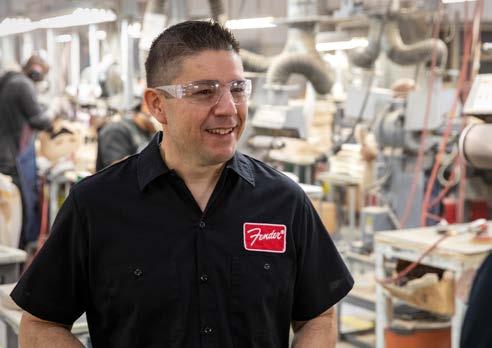
Making Musicians “Fly”
Sal Montes is leading a cultural and manufacturing transformation at Fender, focusing on small-batch and custom creations
“My knowledge of science was better than my English” A midcareer move from Argentina to the United States meant Claudia Ibarra had to start over; today, she uses that experience to inform her leadership at Exagen Diagnostics
West Point + Wartime + Wharton
Having excelled in some of the most challenging, high-pressure environments, Miguel Gastellum now focuses his leadership efforts on elevating fellow Mexican Americans

124 Ensuring an Inclusive Experience at Abercrombie & Fitch
Stacia Jones Esq. keeps the global fashion retailer welcoming and friendly for associates and customers alike
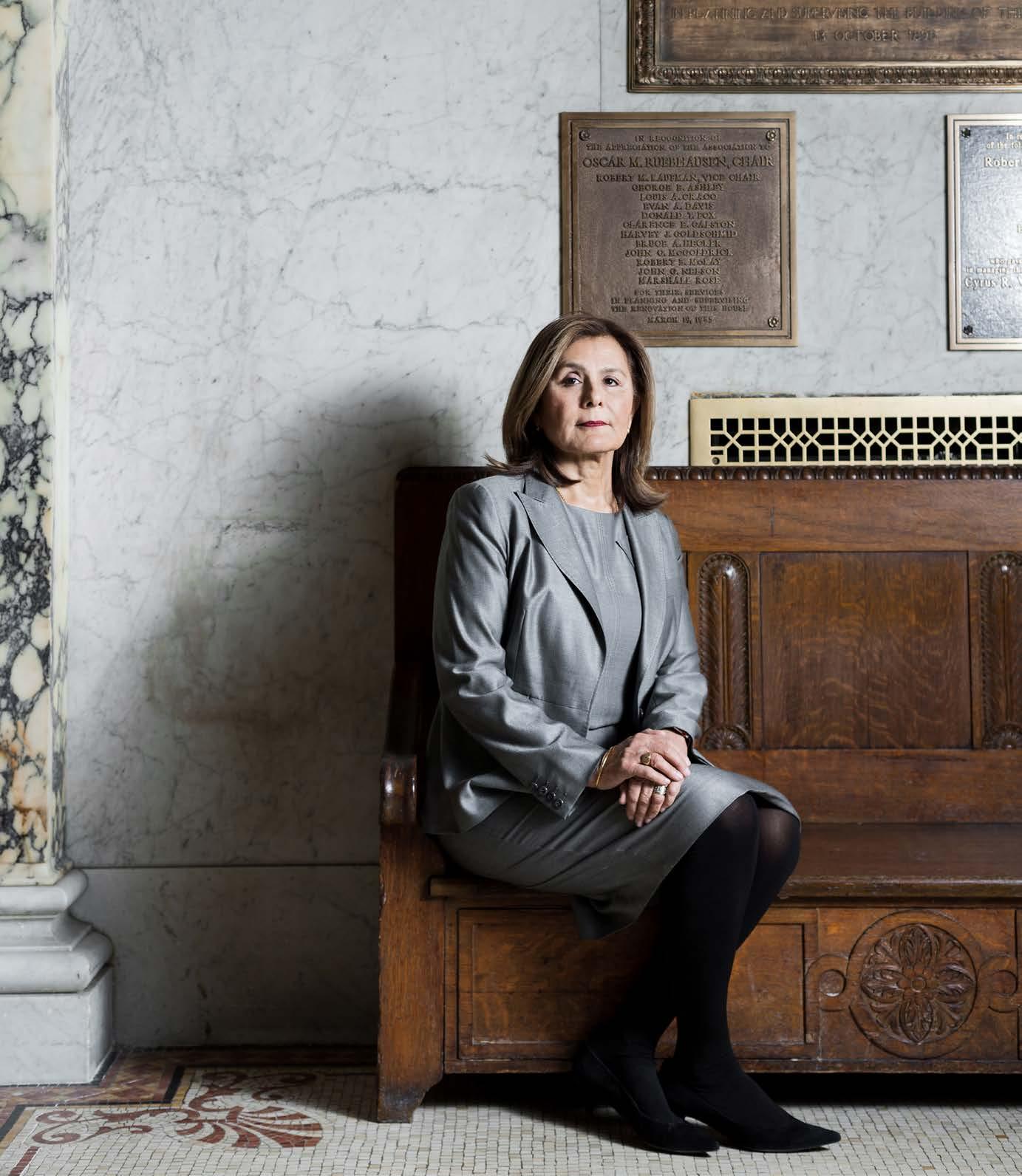

Pedro A. Guerrero CEO of Guerrero Media Publisher of
Executive
IF YOU HAVE JOINED HISPANIC EXECUTIVE at one of our high-caliber gatherings, you have probably heard me remark, “Something magical happens when you get the right people in the same room.”
I say that to underscore my belief that the most effective catalysts for our community’s advancement are platforms that allow Latinos in positions of influence to come together so they can connect with other like-minded professionals and learn from each other’s experiences.
The theme of “building meaningful relationships” has also emerged from the stories in this, our fifth annual “Best of the Boardroom” issue. Every year, we shine a spotlight on the few Latino executives who occupy corporate board positions, both to celebrate them and to shed light on the path they took to the top of corporate America—all in the spirit of increasing the number of Latinos serving on boards.
In the last year, that progress has come largely as the result of the efforts of the Latino Corporate Directors Association, a group tasked at preparing and positioning Latinos for corporate director opportunities. In 2018, it referred candidates to more than forty-five board searches, up from five in 2017, and influenced placement of fourteen members and associate members on boards. “While our success is still in its infancy,” says LCDA cofounder and board chair Patricia Salas Pineda in her guest editor’s letter on p. 64, “we expect to see continuing affirmative change.”
Much of that change will come from senior-level executives who become firsttime directors, as 60 percent of Latinos appointed to corporate boards in 2016 had no prior corporate board experience.
How does one become a corporate board director? And what unique opportunities do successful Latinos have towards paying it forward and opening doors for others? This gets back to the magic I referenced earlier.
I don’t pretend to be an expert on board directorship, but I have met several (and have many friends who are) corporate board members. In thinking of these leaders, my biggest takeaway is that they are impressive people. They’re clearly experts and they’re incredibly confident in who they are and the value they bring to the table.
In addition to the expertise they have crafted over decades of experience, they have also—perhaps with just as much importance—built a robust network of equally impressive peers.
As the old dicho says: “Dime con quien vas y te dire quien eres.” It’s from these personal
“Having the right connections engenders a prominent professional reputation, which, in turn, feeds the strength of your network.”
networks that corporate board director opportunities happen.
Having the right connections engenders a prominent professional reputation, which, in turn, feeds the strength of your network. It’s a symbiosis that takes years to build.
Years that include attending industry, association, and networking events. Years of showing up, becoming known, getting to know others, and building trust. Then, when someone in your network has an opportunity to give a referral, the opportunity arrives.
Building this trust, this network, is a two-way street. In order to gain respect, you must respect others. In order to gain recognition, you must recognize others. And the same is true for referrals. Advancement often comes after—or even because—you have paid it forward.
At an Alumni Society event this past year, Gerry Lopez, former CEO of AMC Entertainment and Extended Stay America and LCDA member, explained that he used to recommend a variety of people to board positions, but he recently shifted this practice. “In all candor, I’m done suggesting people who are not Latino,” he said. “If we don’t do the push, nobody will do it for us.”
I agree with Gerry.
We all convene at events, and that’s important. But then we disperse. We go back to our worlds. It’s in those worlds where we come across opportunities to recommend someone we know. This is the point where our focus must shift, where we have the unique opportunity to scan our networks of successful Latinos and follow Gerry’s lead.
Don’t know enough Latinos to recommend? Turn the page.
Photographer Cass Davis
shadows Eva Hughes, founder of Adira Consulting, former CEO of Condé Nast Mexico and Latin America, and keynote speaker for our Leading Latinas event in Miami.

9:32AM
Morning sanctuary Eva often enjoys her morning coffee on the balcony of her island home, where she can plan her day in the fresh air. Since founding Adira Consulting, her day-to-day life varies greatly, so it is important for her to prepare for the day’s events.
9:21AM
Even her mug is fashionable Eva’s kitchen is stocked with decorative mugs from Anthropologie that feature different letters. Every morning, Eva chooses a letter, then pours in her coffee. Today’s choice: L for Leading Latinas.




9:34AM
Recommended reading Eva is currently reading Connecting the Dots by John Chambers, former CEO of Cisco, whose story provides her insight and inspiration.
10:00AM
Midmorning break
Living next to the beach has its benefits: for Eva, taking a walk is a great way to decompress and break before going on with her day. She enjoys listening to music during her walks.


10:53AM
Checking in Eva and her assistant, Veronique Villeda, discuss Eva’s schedule, status updates, and to-do’s from Eva’s home office.

1:47PM
Fashion feedback
An advisory board member of the Istituto Marangoni in Miami, Eva meets with the school’s president, Hakan Baykam, to review student designs. The Miami location opened in January 2018; the world-renowned parent school’s notable alumni include Domenico Dolce of Dolce & Gabbana and Moschino designer Franco Moschino.

5:03pM Arriving at the Sacred Space Eva and Veronique arrive at the Sacred Space Miami, the venue for our Leading Latinas dinner, presented by Northwestern Mutual. The event, taking place in the Wynwood Arts District, coincides with Art Basel, the premier art show of the Americas.



5:30PM
Interview for Telemundo
Prior to the Leading Latinas dinner, NBC/Telemundo’s Vanessa Hauc interviews Eva for a special on sustainability in fashion, to be aired as part of the network’s Planeta Tierra segment. Hauc also attended the exclusive dinner afterward.
6:52PM
An inspiring group
Thirty amazing women gathered at the Leading Latinas dinner, presented by Northwestern Mutual. Among them were Eva, Hauc, PBS’s Alicia Menendez, legendary journalist Maria Elena Salinas, celebrity chef
Ingrid Hoffmann, and i.am+’s Karli Henriquez.


6:58PM
Bold and bright
The Miami Leading Latinas event is part of a national series by Hispanic Executive, aimed at celebrating and empowering Hispanic women. Aptly, the tour’s color scheme features bold, bright hues.
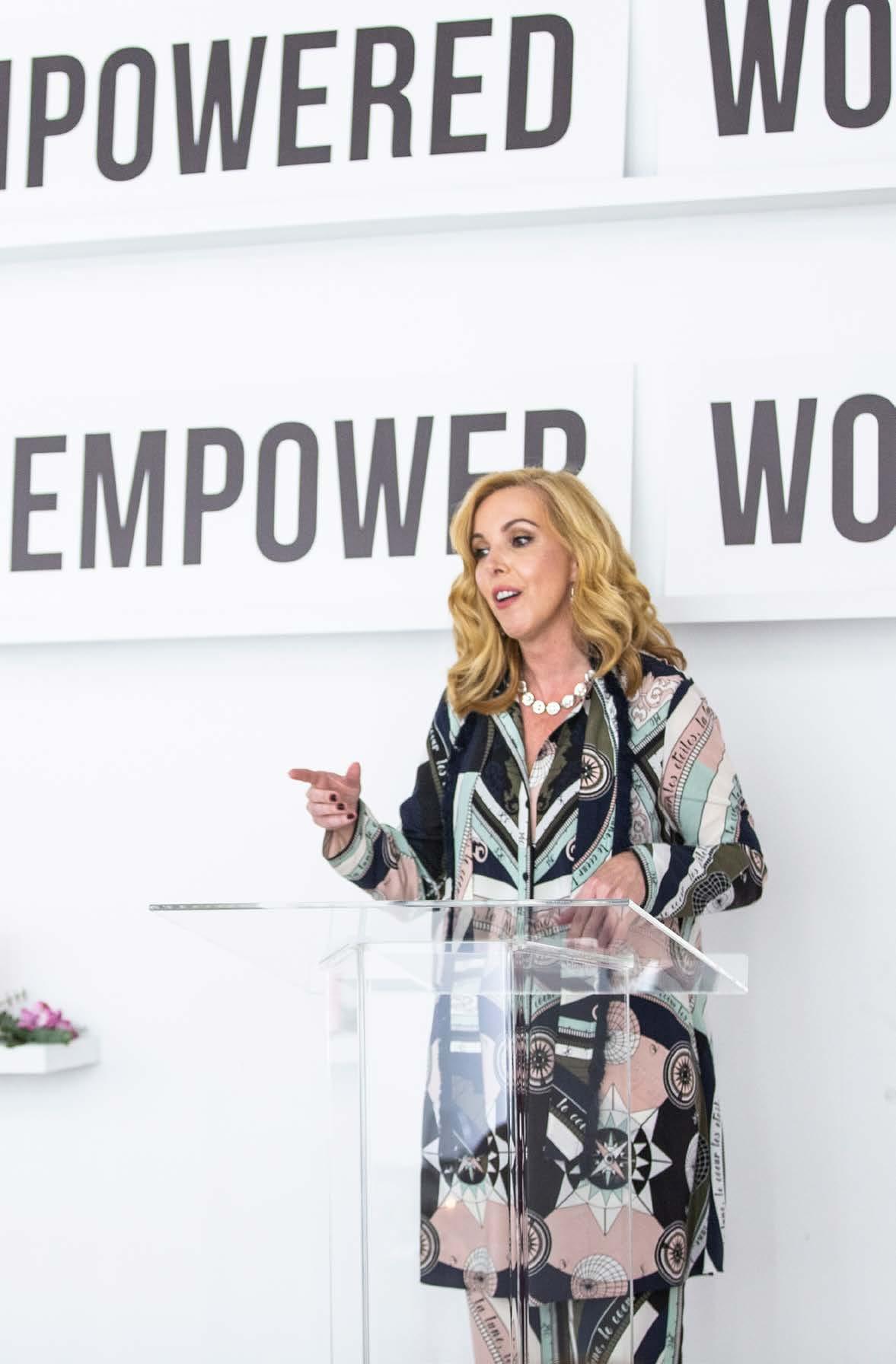
7:13PM
The importance of change During her keynote speech, Eva speaks about the power of change. “Changing the way we live, the way we think, and the way we look at ourselves might be the best decision,” she says in front of a backdrop that conveys the message, “Empowered women empower women.”

Dan Siciliano is a member of the Latino Corporate Directors Association, an instructor for the Latino Corporate Directors Education Foundation’s BoardReady Institute, an LCDEF board member, an immediate past faculty member and professor for the Rock Center for Corporate Governance at Stanford University, and a member of the board of the San Francisco Federal Home Loan Bank. Previously, Siciliano founded and served as chairman and CEO of LawLogix Group, a global software company named nine times to the Inc. 500/5000 fastest-growing companies list. Read his insights on becoming primed for the boardroom, p. 96.
Patricia Salas Pineda is a corporate and nonprofit board member and a former officer of Toyota Motor North America, Inc. and New United Motor Manufacturing, Inc. (a joint venture between Toyota and General Motors), where she held diverse leadership roles overseeing legal, corporate communications, advertising, philanthropy, human resources, Hispanic business strategies, and government and environmental affairs. She is a founder and board chair of the Latino Corporate Directors Association (p. 63). She is also a board member of the Latino Donor Collaborative and EarthJustice. She currently serves on the boards of Levi Strauss & Co and Frontier Airlines. Previously, she served on the boards of Anna’s Linens, Eller Media Company, the RAND Corporation, and the California Air Resources Board.

VP, Creative
Kevin Beauseigneur
Director, Creative Operations & Editorial
Cyndi Fecher
Managing Editor
Kathy Kantorski
Digital Content Manager
Frannie Sprouls
Contributors
Sarah Breeden, Olivia N. Castañeda, Randall Colburn, Tricia Despres, Peter Fabris, Amanda Garcia, Will Grant, Joseph Kay, Russ Klettke, Kelli Lawrence, David Levine, Lior Phillips, Anthony Ruth, Paul Snyder
Director, Design & Photo
Caleb Fox
Senior Designer
Anna Jo Beck
Photo Editors & Staff Photographers
Cass Davis
Gillian Fry
Hispanic Executive® is a registered trademark of Guerrero, LLC.
©2019 Guerrero, LLC. guerreromedia.com 825 W. Chicago Ave. Chicago, IL 60642
Reprints
Reprinting of articles is prohibited without permission of Guerrero, LLC. For reprint information, contact Reprints & Circulation
Director Stacy Kraft at stacy@guerreromedia.com.
CEO
Pedro A. Guerrero
Managing Vice President
Marc Jerbi
VP, Hispanic Division
Vianni Busquets
Senior Director, Finance
David Martinez
Director, Client Services
Cheyenne Eiswald
Senior Client Services Managers
Rebekah Pappas
Katie Richards
Client Services Manager
Skylar Garfield
Director, Talent Acquisition
Elyse Schultz
Director, HR & Operations
Megan Thorp
Executive Assistant to the CEO
Jaclyn Gaughan
Senior Directors, Sales
Sarah Jameson
Ben Julia
Director, Sales
Rachel Miller
Associate Director, Strategic Development
Kara Thomas
Director, Strategic Partnerships
Krista Horbenko
Director, Business Development
Jenny Vetokhin
Business Development Manager
Erin Malone
Elif Negiz
Strategic Account Manager
Taylor Les
Content & Advertising Managers
Ellen Aleksa
Cristina Ali
Loreli Allala
Allyssa Bujdoso
Capri Cutchin
Katie Hartnett
Nicole Haas

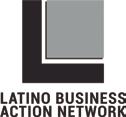
When one’s work makes an impact in the community, it transcends employment and becomes a calling. These executives have answered their call.
BY TRICIA DESPRES
Eric Batista creates a bright future for the youth of his Massachusetts hometown, the City of Worcester

ERIC BATISTA HAS ALWAYS BELIEVED IN THE POWER OF RHETORIC. He finds wisdom and inspiration in quotes and phrases about teamwork and inclusivity, and he uses these words to guide him not only in his profession but in his life.
He references a quote from President John Quincy Adams: “If your dreams inspire others to dream more, learn more, do more and become more, you are a leader.” Batista says, “It’s quotes like these that remind me of what is truly important.”
Reminders such as these have helped Batista through difficult times. When he was just seven years old, the native Puerto Rican visited the city of Worcester in Massachusetts with his family—and they never left. The visit came about a year after Hurricane Hugo ravaged Puerto Rico in 1990; the family was looking for a new start and a new life in Worcester, the second-largest city in New England. Soon, Batista began to fall in love with the city—a love that would change the course of his life.
“I loved growing up in Worcester,” recalls Batista, who now serves as the city’s chief of operations and project management. “I would say I was a well-rounded kid. I played the violin and the drums and was a volleyball and basketball player. The most important thing I wanted was to stay involved. I was very independent.”
He also describes his young self as a “curious kid,” explaining, “I was the one who questioned everything. My parents would say something and I would ask why. I wanted to know everything.”
His passion for learning inspired a focus on education: upon graduating college, he was recruited to build a college access program just outside of Worcester, within a predominantly Hispanic community. Soon after, he would further his schooling by earning his master’s degree while also working on a project with the Latino Education Institute.
“In the nonprofit sector, a lot of things are out of your control,” Batista says. “I wanted to make a big impact, so whenever I got a new opportunity, I went for it.”
In 2012, he took a job with the City of Worcester. It was an opportunity to work directly with and for the hometown he loved; however, he knew that there would be challenges, especially with the city’s youth. “We had seen an uptick in youth violence, and I just knew I had
“I can feel younger eyes on me. I want to mentor them as much as I can.”
to take it on,” he remembers. “We were seeing nine or ten homicides a year at the time.”
A series of youth initiatives put in place by Batista and his team, under the leadership of City Manager Edward M. Augustus, Jr., helped combat the problem and ultimately decreased the violence. “We went down to five homicides a year, so we knew it was working,” he says. “The mental health part of all of this was of utmost importance. It almost felt bigger than our city. That’s why we had a $3 million initiative to combat it.”
And while Batista says that he tries his best to keep the emotion out of his everyday duties, that was sometimes easier said than done. Batista worked with more than 150 people and 70 organizations with the Youth Violence Initiative. “It was very emotional to hear the stories of our young people and the challenges that they were going through—but I focused on using that emotion for the good of the city,” he says. “We used that emotion to come up with solutions, and when I say solutions, plural, I mean it. One solution is never the answer. We

were dealing with multiple crimes of violence including everything from home invasion to stabbings, and all of those crimes had different motives. You just couldn’t treat it the same.”
Many of the youth that Batista helped through those initiatives are the very same people in the community who continue to rely on him for insight and direction. “I always tell young people that it’s important to follow your passion, even if it takes you away from what your family is saying to you, especially within Hispanic households,” he says. “You are the one living your life.”
Indeed, being a Hispanic in a place of power is something Batista says speaks to future generations.
“I can feel younger eyes on me,” says Batista, whose community of Worcester is 20 percent Hispanic, with Hispanics comprising 40 percent of the school system. “I have kids message me on Facebook asking me how I got to where I am, how to build a résumé, and how to transition from job to job. They are our future. I want to mentor them as much as I can.”
These days, Batista finds himself in awe of not only where the city has come from but where it is going.
“This city is in such a great position right now, and there has been great economic growth,” says Batista, who will work on a new strategic plan in 2019 that will allow the city to work better internally. “I owe much of that to the fact that we all work as a team. When you work together, you can see the big picture easier. The decisions I make are decisions I can’t make on my own. I need to make sure that all of the voices are heard.”
Despite all of this on his plate, Batista says he strives to keep it all in balance. “As a government official, you are always on call,” he explains. “From the people in the city who see me out at the local restaurants to the family members who ask questions at a holiday dinner, I just never get away from it. But that’s just what it means to be a public servant, and that’s okay with me.”
Batista finds balance by playing basketball, playing music, and spending time with family. And then, he sits back, reads a quote or two, and remembers just what a gift it is to live this life of service to others.
BY AMANDA GARCIA
How Liliana Canedo is bringing Latino New York Life agents together to build a culture of financial literacy in the greater Latino community
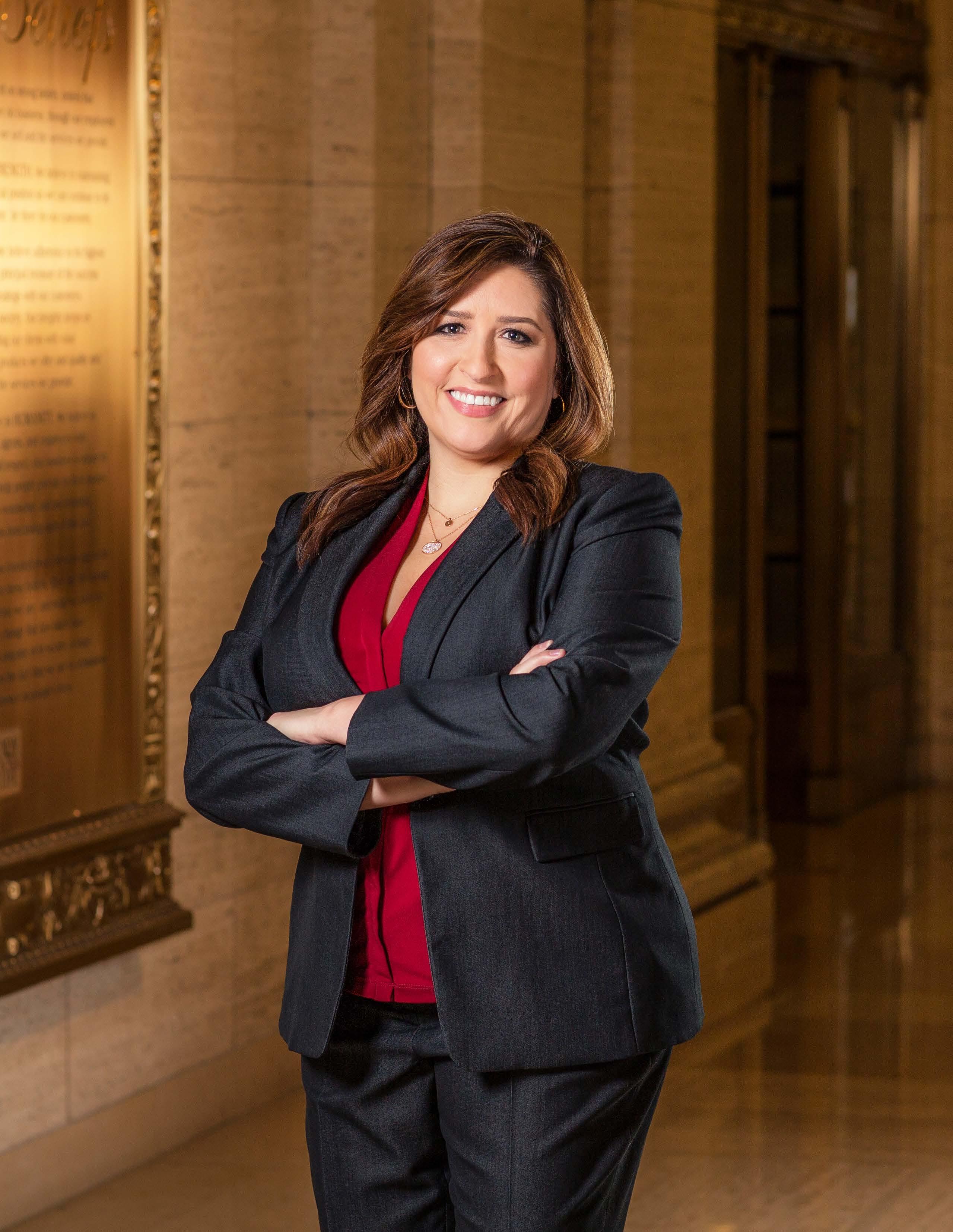
STATISTICALLY, LATINOS HAVE LESS FINANcial literacy than the rest of the United States’ adult population. “And culturally, we tend to have a lot of distrust toward financial institutions,” says Liliana Canedo, corporate VP and Latino Market Manager at New York Life.
She speaks from experience: at the age of twenty-eight, Canedo came to the United States from Brazil, and can now recognize her initial lack of financial-planning knowledge. “I came from a country where financial institutions were often bankrupt and there was no trust in the economy,” she explains.
In 2002, she joined New York Life as an agent. In 2007, she was promoted to partner, and in 2010, she joined the Latino market team, becoming the market manager a few years later. At that time, there were only 450 New York Life Latino agents to service the entire Latino market. “We knew that Latinos serving Latinos—understanding the culture, speaking the language, building trust— would be the most successful approach for New York Life,” says Canedo. The Latino market became a top priority for the company. And, thanks to some aggressive expansion, the number of Latino agents grew to more than 2,000 by 2017.
“We want to work together with the Latino community, to educate them on the importance of building legacies and growing wealth,” says Canedo.
While so much growth in so little time was to be commended, Canedo knew New York Life could do more for the 55 million Latinos in the country, so she began asking
“I’m on a mission, and I’m so grateful that New York Life sees how important it is and has given me an opportunity to pursue it.”
her staff how they might bring agents together in a meaningful way to share best practices and ideas for reaching the community. Soon the conversation grew beyond only Latino agents, and Canedo found herself asking, “Why not share with each other and reach out to our Latino community to tell them we’re working together— juntos —to help them grow financially?”
Thus, the Juntos campaign was born in spring of 2018. “We wanted to create a movement,” says Canedo, “and Juntos might be just that.”
The Juntos campaign is designed to raise awareness of the importance of financial planning using real life stories that are common in the Latino community. Two thousand Latino New York Life agents around the country work directly with their local communities providing educational seminars and individual consultations helping Latinos plan for their future financial security. In mid-2019 there will be a national launch of educational videos that will be distributed through multiple channels.
The alignment of these efforts is where Canedo plays a key role. She leads a team of forty-four Latinos and Latinas who are spread out across each of New York Life’s four geographical zones. These talented individuals lead within New York Life offices, they help recruit, train, and connect Latino agents, and together they support the 2,000 Latino agents in the field and 87 managers. On top of managing her team, Canedo is also responsible for assisting to develop national recruitment strategy, she connects with
influential leaders, and inspires unity and alignment among her team.
Since joining New York Life as an agent eighteen years ago, Canedo has refined a service-oriented leadership style. She quickly realized her passion for helping others, and her professional motivation shifted from establishing a career and earning a paycheck to changing lives. Lives she has been honored to learn about, inspire, and empower. “Our Nashville office manager came to the United States with two bags and barely a word of English, but she was a CPA in Venezuela,” says Canedo. “When I met her she wasn’t even licensed, but after she attended one of our meetings, she knew she wanted to be a managing partner before even becoming an agent—and she did it in only five years!”
It wasn’t always easy, but following her passion is how Canedo ultimately found her voice. “You have to have vision for the future to keep you going,” she says. “Now I’m on a mission, and I’m so grateful that a Fortune 500 company like New York Life sees how important it is and has given me an opportunity to pursue it.”
The Juntos campaign is meant to demonstrate that Latinos have an important voice in culture and the economy. It is designed to encourage a culture of financial planning in the community, and empowerment through financial literacy and freedom. “As a community we are resilient; we are able to do so much,” says Canedo. “We are proud to be Latino, and proud to keep growing together— juntos.”
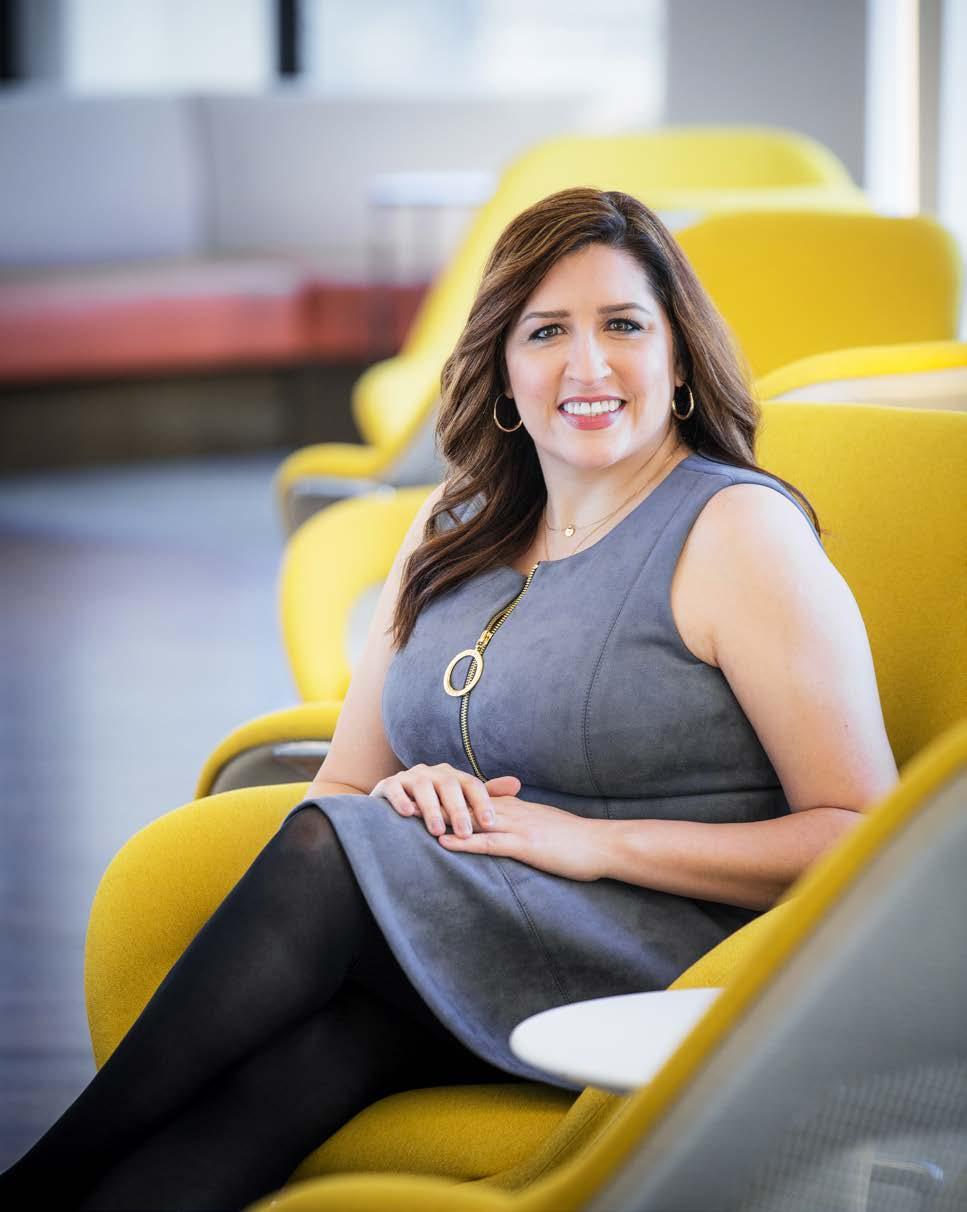
Liliana Canedo
Corporate VP & Latino Market Manager
More than 50 percent of the US Latino community is underbanked. With Uulala, Oscar Garcia hopes to offer the financial empowerment they’ve long been denied.
BY RANDALL COLBURN

Garcia CEO & Founder
OSCAR GARCIA’S EARLIEST MEMORIES ARE of picking strawberries. He recalls one day watching a yellow school bus driving by his trailer, and he wondered where the bus could be going. “Someplace fun,” he thought, before heading back into the strawberry fields, work that provided the primary source of income for his family in Salinas, California. Even later, after his mother got a more lucrative factory job, money was tight. It didn’t help that basic financial services ate into her profits.
Now, after years spent cleverly carving his own way into financial security, Garcia is working to help the community who find themselves in the same state he was in growing up. In 2017, he founded Uulala with the purpose of providing financial inclusion for underbanked communities— specifically Latino communities, where he says more than 50 percent of consumers primarily use cash. The people in these communities have no bank accounts or credit rating, he says, which disqualifies them from applying for or receiving financial loans.
“Uulala bridges the gap between the unbanked and banked worlds,” Garcia explains. “We provide a way of turning your physical dollars into digital dollars.” Using Uulala, users can pay bills online, enjoy
access to online marketplaces, and rent cars and hotel rooms. They can also secure a pay-as-you-go MasterCard.
Uulala also collects data that can be recognized by financial institutions. “We can track that you pay your bills and give you incentives to pay your bill over a card,” Garcia says. “We give you credit points for paying your electric bill, your water bill, your gas bill. Using our platform, you get rewarded for doing the same thing you were doing with cash.” He adds that paying digitally or with a card can often result in lower fees than users would find when paying bills with cash.
Uulala was, in many ways, borne out of frustration. First, there’s the frustration that Garcia felt as an impoverished youth, which helped propel him to make a better life. Then, at the age of eighteen, he was training to be a professional diver when an injury cost him his college scholarship. He emerged from that disappointment to learn marketing from a mentor he describes as a “Tony Robbins kind of guy.” In the mid-1990s, he taught himself computer design and, as a challenge, replicated the layout of a Santa Monica mall using the era’s software. He took that project to a convention and soon saw himself flooded with design offers, which led to more than a decade spent helping kick-start a number of
dot-com companies, dabbling in everything from finance and insurance to real estate and direct mail.
Through it all, he remembered the words of a guidance counselor he relied on as a youth: “Can’t is not in my vocabulary,” the counselor said. “And it shouldn’t be in yours.”
It was a job in merchant services, however, that provided Garcia another nudge of frustration that led him to start Uulala. There, after helping to design technology that sought to make merchant services more dynamic, he witnessed the banks that backed the project taking advantage of underbanked Latinos. “I had to resign,” he says. “I was having flashbacks to people not paying my mom.”
“There’s an ignorance in big companies of just how much money the Latino demographic touches,” he explains. “We had a lot of pushback; someone literally asked us, ‘Why are you going after that industry when they’re broke?’”
Garcia says Latinos power the US economy with a $2.13 trillion GDP. By comparison, Mexico, a country of 150 million, has a combined GDP of $1.4 trillion. “One trillion more is being spent and earned in the United States than in the entire country of Mexico,” he says. “Why would you disrespect that amount of money?”

“There are only a few institutions that cater to Latinos in the way that ALPFA does,” Oscar Garcia says of the Association of Latino Professionals For America, an organization devoted to empowering and developing Latinos and Latinas as leaders of character for the nation, in every sector of the global economy. “Their focused intention to place students is a big factor on why I continue to support ALPFA.” To date, Uulala has participated in three ALPFA events, with Garcia appearing as both a panelist and the leader of a blockchain workshop.


“We’re born with a real drive as Latinos, because there are so many setbacks, so much poverty, so many people telling you that you can’t do it—you’re almost bred to fight.”
“The problem,” he adds, “is the lack of understanding of how big this industry is.”
Part of that problem is that the Latino-American demographic is not represented in databases the way the Anglo-American demographic is. Uulala is revolutionary because it provides that data in spades, thus opening up doors for the entire community.
This kind of financial inclusion helps empower underbanked communities, though Garcia is also working to empower Latinos in the industry itself. Uulala is a minority-owned company, with the majority of shareholders being first- or second-generation Latin Americans. Deborah L. Castillero, Uulala’s vice president of business affairs, says that Uulala is notable not just for its expertise but also for really understanding the problems of the community in ways most corporations don’t.
Garcia says he wants to, “Change the dogma of Latinos not helping each other out,” noting that he’s had discussions with a number of executives who’ve all agreed that they should “strive to bring Latinos into executive positions.”
Meanwhile, Uulala continues to grow. Garcia says the company is striking five to ten contracts a month as it expands its reach to Mexico, Latin America, and other countries. Castillero adds that those turning a blind eye to Uulala’s mission “will be left behind.”
“We’re born with a real drive as Latinos, because there are so many setbacks, so much poverty, so many people telling you that you can’t do it—you’re almost bred to fight,” Garcia says. “It took a while, but that fighting spirit as a Latino is something I’ve embraced.”
With Phyllis Barajas at the helm, Conexión has found success for midcareer Hispanics through its mentorship program; now, it’s launching an early-career division
BY OLIVIA N. CASTAÑEDA
TO WHOM MUCH IS GIVEN, MUCH IS EXPECTED.
This belief is ingrained in Phyllis Barajas and in the work of Conexión, the ten-month executive mentoring and leadership program she founded upon the principle of successful Latinx leaders giving back to elevate the next generation. When Hispanic Executive last spoke with Barajas, in 2015, Conexión was primarily focused on midcareer Hispanic mentees. Today, the program has added a new arm: an early-career division, which launched an eight-month program in the 2018-2019 season.
“We’re very excited,” Barajas says. “This is our first cohort, and we’re going to learn a
lot from these amazing and talented early-career mentees. They are phenomenal.”
The ten early-career mentees—called “conexiónistas”—range from twenty-three to thirty years old and represent almost every country from Mexico through Central and South America. They possess many talents to contribute to the workplace, Barajas says, but all they lack are the right connections, sponsorships, and confidants—also known as “social capital”—to help them discern career moves.
Social capital is the model for Conexión. In the early 1990s, Barajas worked for the now-retired Harvard University professor
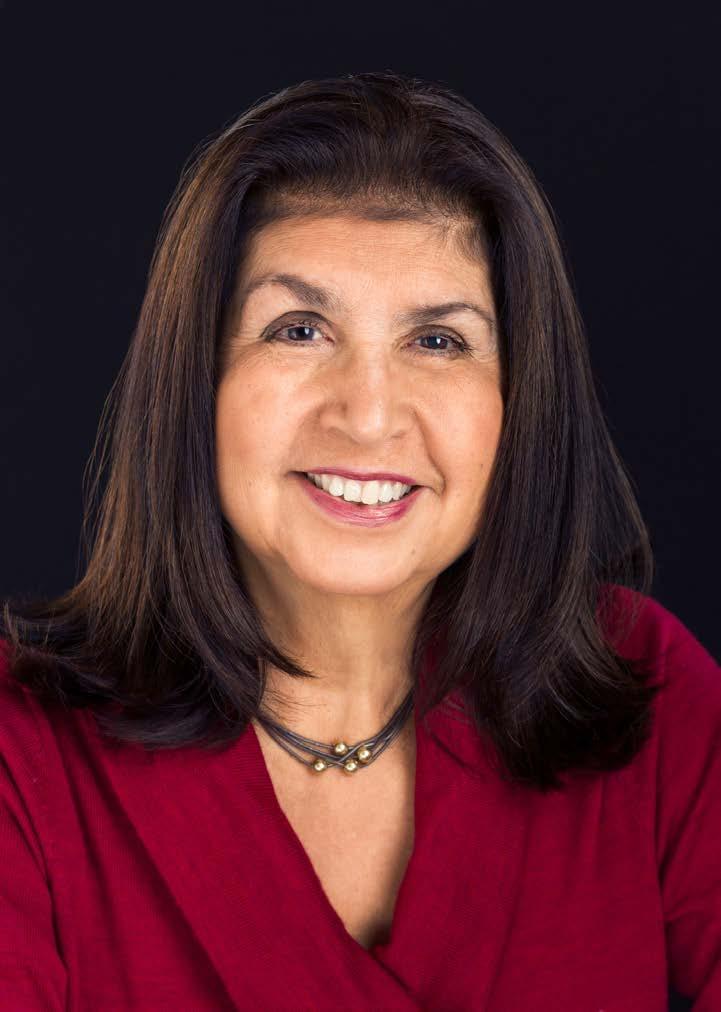
Barajas CEO & Founder
Robert D. Putnam, who is a proponent of the concept, she says. In her work with Putnam, she learned that those who have a well-developed social network of value succeed more than those who don’t.
The idea of social capital is true for communities, organizations, economies, and countries. “The better connected you are and the better support system you have, the more successful you will be economically, socially, and emotionally,” she says.
From the standpoint of the mentor, it’s all about giving back—fulfilling the aforementioned adage. Barajas—a first-generation Mexican American born and raised in Omaha, Nebraska, who earned her master’s degree in education from Boston University and has received numerous awards and recognitions—shares this perspective. “What point is there in having lived my life, unless I do something with it?” she explains. “To me, mentoring is an opportunity to support, influence, and impact others. It’s about sharing what you have.”
Barajas has a track record of making a positive difference in increasing the much-needed visibility and representation of US Hispanic/Latinx professionals across all leadership positions and in all sectors. Indeed, that was the impetus for creating Conexión. Since 2005, the Boston-based nonprofit has targeted Hispanic/Latinx professionals who are at the midcareer level to help accelerate their advancement to upper management and executive levels.
Prior to founding Conexión, Barajas witnessed how Hispanics, despite being the
second-largest demographic in the country, were absent and marginalized across all sectors as her career took her to Washington, DC; New York; and Boston. Upon moving to Boston, she and a group of social entrepreneurs sat down to brainstorm a possible solution. “Increasingly, people are going to look to our demographic to fill the talent pipeline,” she recalls discussing during that meeting. “We can’t wait and focus on kids, so we have to focus on midcareer people who are pious to take on those leadership roles. That’s why we chose midcareer.”
Executive mentors then became the focus. Conexión looks for mentors who already have experience in mentoring formally and informally, are active within their communities in addition to their day job, and are willing to commit their time and focus to meeting at least once a month with their midcareer Conexión mentee for the duration of the ten-month program.
“This is a reciprocal relationship. Your job is to be a role model, focusing on success. Engage with the mentee in an exchange of ideas, thinking out loud, and help this person think about the next phase of their career,” says Barajas, who also notes that the mentors do not have to be Hispanic. In fact, many of Conexión’s mentors are Caucasian men who have never mentored a Latino before but are happy and willing.
This speaks to the other side of the mentor-mentee relationship. “We say to the mentees, ‘This is your opportunity to really help this individual get greater insight to what the world looks like from where you

Boston-based Eastern Bank—the nation’s oldest (since 1818) and largest mutual bank—has been a big supporter of Conexión since day one. In honor of Hispanic Heritage Month 2018, Eastern Bank awarded its first Community Advocacy Award to Phyllis Barajas. The award recognizes those who dedicate their time and talent to addressing the needs of the community.
“I was very honored,” says Barajas, pictured above with Bob Rivers, chairman and CEO of Eastern Bank. “I am the first person, the first Latina, and the first Latina Community Advocacy honoree that Eastern Bank has had in 200 years. My hope is that other companies will replicate this strategy in terms of engagement and social and economic commitment to the growing Hispanic/Latinx demographic.”

“The better connected you are and the better support system you have, the more successful you will be economically, socially, and emotionally.”
sit in your organization,’” Barajas explains. Mentees are to remember the reciprocity—their mentor has something to gain, as well.
With its new division, Conexión’s plan is to continue the successful work it has achieved for its midcareer program and apply the same concept of social capital to the early-career program. “My hope is that the results will be faster and better for the early-career, to get them connected sooner,” Barajas says.
The goal is for conexiónistas to finish with a more robust network of professional connections that may even flourish into long-term friendships, along with a feeling of responsibility for the future of the country and of being compelled to accomplish great things. “We want mentees to have broken out of their workplace silo as a result of having this mentor,” she says. “Many have gone on to make a difference in ways that they never would have.”
Barajas recalls the success of a woman mentee who graduated from the program, who expressed gratitude for having met people on boards and commissions, which was facilitated by her mentor, a retired CEO. “We know that these connections are what makes the world go around,” Barajas says, “and we will work to make change happen.”
What is your secret to successful leadership?
The impressive executives featured here share theirs, and they are strategies that engage both the mind and the heart.
38
48
52 Tom Garcia, Deckers Brands
55 Franke Rodriguez, Anomaly
58 Sal Montes, Fender
BY KATHY KANTORSKI
In working with prominent Hispanic business leaders despite their lack of automanufacturing experience, Toyota created extraordinary Tier 1 suppliers and empowered an entire city
WHAT DO YOU GET WHEN YOU TAKE A lawyer, two multi-business entrepreneurs, a STEM expert, and a staffing expert and put them in charge of manufacturing components for Toyota pickup trucks?
You get the Five Compadres, the Tier 1 suppliers for Toyota’s plant in San Antonio, Texas.
Now in its fifteenth year, the San Antonio plant “has proven to be an outstanding performer in the global lineup of Toyota plants,” says Chris Nielsen, executive vice president and chief quality officer for Toyota Motor North America. The Five Compadres have performed so well, they have been entrusted with supplying a new Toyota plant in Guanajuato, Mexico, scheduled to open December 2019.
But don’t suppliers have to be automotive or manufacturing experts? In this case, no. To understand why, let’s go back to the beginning.
In the late 1990s and early 2000s, Toyota Motor North America was looking to establish a new plant. Thanks to years of advocacy by former mayor Henry Cisneros, the location it chose was San Antonio.
The choice was a surprising one. “San Antonio was not a manufacturing town,” says compadre Frank Herrera, owner and president of the Herrera Law Firm and chairman of HERO Assemblers and HERO Logistics, which provide wheel and tire assembly and on-site logistics and crossdock operations, respectively. “The fact that Toyota decided to locate a plant here in San Antonio was a mystery—but it’s not so much of a mystery anymore.”
Herrera explains that Toyota is a very forward-thinking company. “I’m sure their thought was, ‘Where are the markets going to be in the next thirty, forty, fifty years?’” he says. “And all of us know that the fastest-growing community in this country is the

Frank Herrera
Chairman
HERO Assemblers
HERO Logistics
President
The Herrera Law
Firm
Berto Guerra Chairman & CEO
Avanzar Interior Technologies
Co-owner three VBM Auto Group Dealerships
Rosa Santana Founder & CEO
Santana Group
Fernando Reyes President Reyes Automotive and Reyes AmTex
Owner Reyes
Development and Reyes Properties
Owner Site B Data Services
Max Navarro Chairman OpTech Corporation and Vutex Inc.
Latino community. So why not locate a plant where the market is going to be? After all, Texas is known for its love for trucks.”
Another factor in Toyota’s decision to come to San Antonio was the influence of Naoko Shirane, who, for more than twenty-eight years, served the city as the senior trade and foreign investment representative for the Japan-Texas office in Tokyo. Shirane was instrumental in attracting several multimillion-dollar corporations to San Antonio, and she became a close friend of the Five Compadres.
“We became lifelong friends,” says compadre Max Navarro, who founded the first San Antonio-based Hispanic-owned scientific research firm before launching Vutex Inc., which assembles numerous components for the Toyota trucks made in the San Antonio plant. “Shirane was responsible for my first interactions with Toyota both in San Antonio and in Japan, where I visited her many times. I owe all of my initial relationships to Secretary Henry Cisneros, Mrs. Naoko Shirane, and Toyota, for its vision of total inclusion.”
Venturing forward with the build of its San Antonio plant, the leaders at Toyota recognized that the plant’s home was a majority-Hispanic community. “We were eager to develop a deep understanding of the society and unique aspects of its culture,” Nielsen says. “And, since automotive suppliers didn’t exist in San Antonio, we sought out successful Hispanic business leaders in the community who shared the same ‘respect for people’ values as Toyota. With that foundation, we felt they could learn the unique elements of being an automotive supplier.”
“I was already driving Toyota products; I already knew the quality,” says compadre Berto Guerra, chairman and CEO of Avanzar Interior Technologies, which manufactures the trucks’ interiors. “When this opportunity came up with Toyota, it was a no-brainer for me. Of course I’d like to build Toyota products.” Guerra, a lifelong Texas entrepreneur who had navigated new industries before, didn’t think twice about becoming a Tier 1 supplier and employing 1,084 people. He immediately had a vision: to create jobs for a lot of the less-fortunate people in San Antonio.
The jump to manufacturing was larger for Herrera, a personal injury lawyer who often found himself on the plaintiff side of disputes with large corporations. He now owns the manufacturer supplying Toyota’s San Antonio plant with wheels and tires.
“Before Toyota, I was a lawyer by trade—I didn’t even fix my own flat tires!” he recalls, laughing.
To teach the first four San Antonio businessmen-turned-suppliers the automobile-manufacturing business, Toyota partnered each of them with other Tier 1 suppliers to form joint ventures. Then, the compadres traveled all over the United States and to Japan to learn their processes. “They also sent some of their best trainers in the world to us,” notes Guerra.
“Toyota has a reputation for being a top company to work with and for—they treat their employees and partners with respect and provide resources for success,” says compadre Fernando Reyes, a born-and-bred
When opportunity knocked, four business leaders—from diverse backgrounds and industries, but connected through the Hispanic Chamber of Commerce— answered. (The fifth teammate, the comadre, joined the group later.)
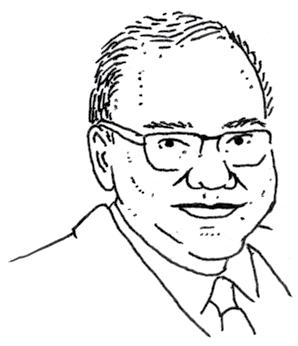
FRANK HERRERA
Chairman, HERO Assemblers and HERO Logistics
Owner & President, The Herrera Law Firm
• Thirty-five years of service, including several as chairman, of the Mexican American Legal Defense and Education Fund (MALDEF) Former chairman, New American Alliance
Former board member:
• Greater Kelly Development Authority
• North American Development Bank Advisory Committee San Antonio Hispanic Chamber of Commerce
On giving back:
“My parents taught me: You have certain gifts, and you have to use them to give back to the community. The more you share, the more it multiplies and makes the community better.”
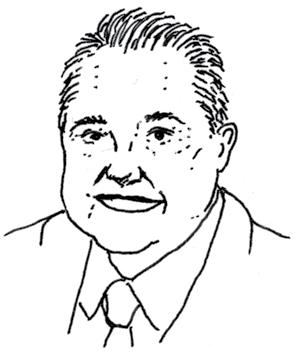
FERNANDO REYES
President, Reyes Automotive and Reyes AmTex Owner, Reyes Development and Reyes Properties Owner, Site B Data Services LLC
• Former president and owner, Reyes Industries Inc.
• Former chairman of the San Antonio Hispanic Chamber of Commerce Former president, San Antonio Fiesta Commission
• Former Rey Feo LX and treasurer (raising more than $460,000 for scholarships)
Board memberships (current and past): St. Mary’s University
• San Antonio Parks Foundation
• Bexar County Performing Arts Center Foundation
• World Affairs Council of San Antonio
• San Antonio Area Foundation Bank of San Antonio Bexar County Community Arenas
On business growth:
“Businesses have to identify who is important to a successful business. My experience is that in forming close relationships with more than one bank, you will have more access to capital. If they are comfortable with you and your business, they will be more comfortable helping you expand your business.”
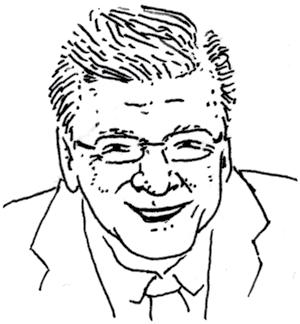
BERTO GUERRA
Chairman & CEO, Avanzar Interior Technologies
Co-owner of three VBM Auto Group Dealerships
• 2015 Ernst & Young National Entrepreneur of the Year
• Bought his first restaurant, a Dairy Palace, at age eighteen; by age twenty, he owned three restaurants
Current chairman, MTC, Inc. (Mi Terra Café) and MTC Real Estate (development company)
• Current volunteer chairman, San Antonio Water Systems
• Current vice chairman, El Centro Del Barrio-CentroMed of San Antonio Current vice chairman, Younglife (global) Board of Trustees
Current board member:
• University of Texas San Antonio Development Board Conceptual MindWorks Inc. After School All Stars
• Abilene Christian University Board of Trustees
On his greatest lesson learned:
“Always ask the question. Ask for the business. Ask for the opportunity. Don’t be shy, and don’t judge a book by its cover. And when you get the opportunity, always do the very best job that you can so you will get future opportunities.”

ROSA SANTANA
Founder & CEO, Santana Group
• Founder & CEO, Forma Automotive (part of Santana Group), Toyota’s first Hispanic woman-owned direct Tier 1 supplier
• 2016 inductee, Minority Business Hall of Fame and Museum
2016 inductee, Women’s Business Enterprise Hall of Fame
Current board member:
• US Hispanic Chamber of Commerce
• Free Trade Alliance San Antonio Women’s Business Council Southwest San Antonio Hispanic Chamber of Commerce
• United Way of San Antonio & Bexar County
• San Antonio Greater Chamber Economic Development Council
• Workforce Solutions Alamo Board, San Antonio
On Hispanics in business:
“Latinas are starting up businesses faster than anyone in this country. And the Hispanic community as a whole has the purchasing power. I get really passionate and excited about the opportunities for our community— not just for me, but for my daughters, and my grandchildren. I’m extremely excited about the future for them with what I started.”
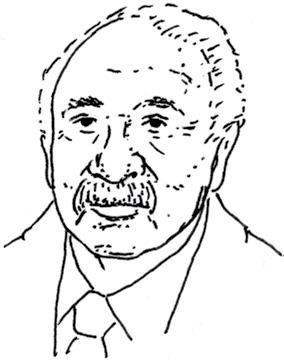
MAX NAVARRO
Chairman, OpTech Corporation and Vutex, Inc.
• Founded OpTech, the first San Antoniobased Hispanic-owned scientific research firm, in 1986
• Received Inc. magazine’s award for fastest-growing small business in 1993, 1995, and 2002
• Served under Secretary of Commerce Robert Mossbacher on the National Oceanic & Atmospheric Administration as a committee member
Served under Secretary of Commerce Ron Brown on the Industrial Trade & Policy Committee
• Served under Commissioner Kevin Martin, chairman of the Federal Telecommunication Commission (FTC) as subcommittee chairman for emerging technologies on small business
Served under Texas Governor Mark White for the Advanced Technology Research Programs Committee
On philanthropy:
“‘Giving back to my community’ does not really ring a bell for me. Being an active participant of my community is not giving back, but being involved in my barrio, which I never left.”

If the story of this group of extraordinary professionals isn’t inspiring enough, one need only read the r é sum é of one compadre—any one, as they all have it—to find an amazing, long history of giving back to the community. The following commendations only scrape the surface:
BERTO GUERRA’s decades of work with CentroMed—providing healthcare to San Antonio citizens who are uninsured, underinsured, or homeless (90,000 patients and counting)—has been so profound, its twentieth clinic will be named the Berto Guerra, Jr. Clinic. Guerra also is the volunteer chairman of the San Antonio Water System, and worked to diversify the city’s water supply, which took a true community-sized effort to support the $2.9 billion effort. Guerra explains, “It guarantees water for our city for the next fifty to sixty years.”
FRANK HERRERA was involved with the Mexican American Legal Defense and Education Fund (MALDEF) for thirty-five years, include multiple years of service as chairman, until he retired from the board in 2018. “Through the court systems, MALDEF opens up doors for Latino communities in education, in employment, in all areas impacting our community,” he says. “That part of my life has been one of the more satisfying, because you can see change happening. You can see how MALDEF has played a great role in improving the political and work environment in all respects of the Latino community to make it what it is today.”
MAX NAVARRO has been so integral to San Antonio’s annual Small Business Symposium—where small businesses are sponsored, networking opportunities are abundant, and entrepreneurs are given opportunities to meet with state and local procurement officers—that it was recently renamed the Max Navarro Annual Small Business Symposium.
FERNANDO REYES has worked as president of the Fiesta San Antonio Commission, a nonprofit serving Fiesta San Antonio, which started in 1891 as a one-parade event and is now one of the nation’s premier festivals with an economic impact of more than $284 million for the city. Funds raised by the festival provide services to San Antonio citizens throughout the year, including scholarships.
ROSA SANTANA dedicates herself to empowering other minority and women business owners through her work on several boards and councils. Her key piece of advice is, “The sky’s the limit,” she says. “When I think about Hispanic businesses and women-owned businesses I think that sometimes we tend to doubt ourselves—‘How could I reach that?’ and ‘I could never go there.’ So when I mentor—for women in particular—I tell them, ‘You can reach for the stars and you can get there. You’ve got to really think about where it is that you want to go and build the path.”
San Antonian who owns multiple businesses in real estate and manufacturing, along with his two companies, Reyes Automotive and Reyes AmTex, which provide plastic parts and carpeting for Toyota Tundra and Tacoma trucks.
Prior to entrepreneurship, Reyes worked for the US Department of Defense, the Department of Housing and Urban Development, and the Internal Revenue Service. “The experience and knowledge I gained through my various positions with the government made me realize the potential for success and growth as an entrepreneur,” he says. “This same opportunity was presented to me when I was approached to consider becoming a Toyota supplier—I saw the opportunity to grow in an entirely new field.”
The compadres received extensive training by a company with a world-renowned culture of organizational excellence—a culture so profound, it has been studied, written about, and exemplified in countless companies. Called “the Toyota Way,” the principles and methods of Toyota are a source of constant education and improvement for the compadres. “Constant improvement— Toyota’s core principle of kaizen —means you never reach perfection,” Herrera says. “You’re always improving.”
Training on the Toyota Way wasn’t just for the compadres; their staff had to be trained, as well. This may seem obvious, but its importance is paramount to each of the compadres’ success. Toyota chose these prominent business and community leaders to become suppliers, but that didn’t mean the compadres stopped their business and community leadership. Guerra, who also owns a Toyota dealership, greatly values his ability to employ others and help put food on their tables, but his responsibilities don’t end there, which is why training is so important.
He explains, “I have to make sure that my employees are taken care of, that we have a good relationship with our customer, Toyota,
and that we have a good relationship with our elected officials who can make you or break you with laws that affect business. And I have to make sure that we have a good relationship with our community so that when we have an issue with our city, our county, or our state, we have credibility when we go and ask those elected officials to help us with a certain vote.
“You can’t afford to do any of that unless you have the best-trained workforce in the world,” Guerra continues. “We’ve got to have a team that knows what to do and has been trained and takes care of the business as well as I would take care of the business. And we firmly believe, ‘Do not reinvent the wheel,’ especially when a company as good as Toyota has already invented it. We are successful because of the training, the support, the development that Toyota has provided to the compadres.”
Fortunately, as Nielsen identified, the compadres were chosen because they already aligned with the Toyota culture, and were selected as Tier 1 suppliers in large part because of this alignment; training on the Toyota Way reinforced their business practices and gave them further definition.
“Communication is big—they don’t like surprises, we don’t like surprises,” Guerra notes, adding, “Always, always do the very best. Try to give people the best price possible or the best service possible with the best quality, and always keep in mind the safety of your workforce. How do you keep people safe? You keep your place clean—always keep your place in five-S condition.”
The five S ’s Guerra is referring to are Toyota’s framework for creating efficiency and value: Sort, Set in order, Shine, Standardize, and Sustain. Guerra’s staff carry keycards to open doors at their facility, and the five S ’s are printed right on the card as a constant reminder of this “way of life,” as he puts it.
Toyota also believes deeply in diversity, as evidenced by its decisions to locate a plant in
“Toyota is an amazing partner to have; I truly feel part of the family. When you’re made to feel like you’re a big part of the team—whether you’re Hispanic, or female, or not, I think that really tells a lot about the company.”
—Rosa Santana, Founder & CEO, Santana Group
San Antonio—where no automobile manufacturing existed—for its strong Hispanic community and to make Tier 1 suppliers of Hispanic business leaders with no previous experience manufacturing automobile parts.
“To Toyota, it makes good business sense to have a diverse supplier base because it generates innovative ideas for improvement and solutions to problems,” Nielsen says.
“Toyota is committed to having a supplier base that more closely reflects the diversity of our customers and the diversity of our team members who build Toyota vehicles in North America.”
Furthering its diversity, the four compadres became five in 2014, when Toyota asked Rosa Santana, the comadre, to start a company that would become a direct Tier 1 supplier of fully assembled truck beds. True to form, the move was one of belief in culture over experience, as Santana had zero experience running a manufacturing operation. She has more than thirty-six years of experience in the staffing industry, and had spent the nine
years previous to becoming the comadre—or the fifth compadre—providing human-capital services to her now-fellow compadres and to Toyota as a Tier 2 supplier (Tier 2 suppliers provide services, while Tier 1 suppliers provide products/vehicle components, and direct suppliers provide vehicle content).
“I’m the first Hispanic woman to own a direct Tier 1 supplier to Toyota,” Santana says, the pride evident in her voice. “Toyota is an amazing partner to have; I truly feel part of the family. I’ve been in business a long time, and I’ve never, ever had a customer like Toyota. They treat their suppliers like family. I walk into any Toyota site, any Toyota plant, any division of Toyota, and I always feel like I’m part of them. When you’re made to feel like you’re a big part of the team—whether you’re Hispanic, or female, or not, I think that really tells a lot about the company.
“When I was announced as the first Hispanic woman to be a direct Tier 1 supplier to Toyota, Toyota hosted a dinner to introduce me to the compadres,” she continues.

When Toyota opened its San Antonio plant, the location it chose was in the southwest outskirts of the city: an underdeveloped, predominantly Latino community. “That area has now been totally developed,” says Frank Herrera, owner and president of The Herrera Law Firm and chairman of HERO Assemblers and HERO Logistics. “Even though San Antonio had zero experience in the automotive industry, Toyota took a chance and decided to build a plant here, and San Antonio is now the seventh-largest city in the United States, and is now known for its automotive experience. The Latino community is a hard-working community. I would call us the Latino Detroit.”
“When the announcement was made and ever since, the compadres have all embraced me, helped me, and mentored me, and the camaraderie between all of us is unbelievable.”
The other four compadres reiterate the same sentiment. They meet regularly to discuss how they can help each other—Guerra reenacts their discussions: “Like, ‘What kind of issues are you having?’ ‘Well, I’ve got issues with the union,’ or, ‘I don’t understand how to negotiate these pricing things.’ So we help with that.”
“Then, whenever I would have any business that was left over, I would fight to give that business to a compadre who could manufacture or assemble things that I needed done. Why not help our own team?” Guerra says. “We are four brothers and a sister.”
The family-like relationship of the Five Compadres is not only a microcosm of the broader Toyota team, but of the San Antonio community, and, broader still, the Latino workforce as a whole.
“Toyota has helped me appreciate and understand the workforce from an entrepreneurial perspective,” Herrera notes. “It helped me understand the role, particularly here in San Antonio, of the Latino workforce in empowering the community economically, because as we do so, we can then help the community improve educationally. Because once you have the finances and education, you can unify forces and assume a leadership role. Having played a small role in that gives me a sense of satisfaction.”

Toyota is proud to support our Tier 1 Hispanic supplier group based at the Toyota Motor Manufacturing Texas plant in San Antonio, TX.
Frank Herrera, Berto Guerra, Max Navarro, Fernando Reyes and Rosa Santana lead companies that engage in various aspects of assembling more than 200,000 Tundra and Tacoma trucks each year.
Congratulations and Vayamos Juntos














hundreds of miles to customers
who depend on it 24-7. Carlos Gavilondo makes sure that power is green, affordable, profitable, resilient—and evolving.
BY RUSS KLETTKE
CARLOS GAVILONDO WALKS A TIGHTROPE or, almost literally, a high wire. As assistant general counsel and director for National Grid, an electric and gas delivery company, he has to balance the oft-conflicting interests of several constituencies: energy customers, utility regulators, shareholders, tens of thousands of neighbors, environmentalists, and future inhabitants of the earth. That includes certain species of birds, bats and butterflies.
That’s because in the region where his unit operates in New York, the company maintains more than 50,000 circuit miles of electrical lines and over 21,000 miles of gas distribution lines. These lines bring energy to more than 4 million customers.
The company has a lot of land to look after in addition to serving the essential energy needs of homes, businesses, healthcare facilities, and security operations.
Something that illustrates how important that is would be the Northeast blackout of 2003. Fifty-five million people in nine states and the province of Ontario lost electricity for about two days. A transmission line that connected—electrically and disastrously—with a tree in Ohio was at fault. It wasn’t National Grid’s line, but it’s why the company and others like it have to ensure those wires are clear of foliage every inch of the way.
In addition to customers depending on reliable power from the company, National Grid sits in the realm of the environmental concerns of hundreds of communities across scores of counties. The company’s transmission rights-of-way (ROWs)—where the largest electric lines are located—nonetheless serve as beneficial habitats to many species of flora and fauna. In fact, utility ROWs


Carlos Gavilondo was born in Cuba but moved to Ohio with his parents at the age of three. His affinity for Caribbean islands comes naturally. However, because of his position with National Grid and specifically because he works closely with the company’s emergency response team, he was the legal point person supporting the company’s role in restoring the power grid to Puerto Rico following Hurricane Maria in 2017.
In those efforts, his job was to review and negotiate agreements on the deployment of personnel and equipment on the devastated island. But the project begat something else: National Grid subsequently hosted six high school students from Puerto Rico to take part in a two-week, STEM-based National Grid Engineering Pipeline Program. “It was one of the many gratifying things that came from our efforts on the island,” he says.
everywhere are increasingly managed to offer habitat and migration corridors for species.
“Selecting places to develop transmission facilities is a comprehensive process in New York State,” Gavilondo says.
In some cases the corridors are even beneficial to some species. “The Karner Blue Butterfly, a threatened species, does quite well in some of our utility corridors,” he notes. Birds such as osprey and some species of bats also benefit from the ROWs.
One reason the company has to add to the grid, much of which was established in the twentieth century by the Niagara Mohawk Power Corporation (which UK-based National Grid acquired in 2001), is to accommodate new, clean energy generation sources. In saying that, Gavilondo says National Grid is essential to supporting emerging cleaner and renewable sources of energy.
If anyone is prepared to help lead the way to a renewable future it’s Gavilondo. He is a math and science guy with a degree in electrical engineering. He later became an attorney with a specific focus on environmental law, and went on to get an environmental policy degree from the State University of New York’s College of Environmental Science and Forestry in Syracuse, where National Grid’s Upstate New York operations are based. “That background and my interest in the environment helped lead me to National Grid and the work I do now,” he says.
In addition to clerking for a federal judge and working in a law firm, he taught land use law on the side for three years at SUNYESF. “I think I learned more than I taught,” he says of teaching, which focused on land development rights and easements. He also serves as president of a land trust board, which is dedicated to protecting agricultural property.
With this background, Gavilondo takes a very pragmatic approach to his job. He explains that transmission and distribution maintenance is a huge part of the company’s expenditures, as is setting up new ROWs to connect to renewable sources. Revenue flows from energy consumers, but capital for new assets comes from investors. So, unless the company can show a reasonable return on investment—all while satisfying regulators with their own sets of demands—National Grid cannot build sustainable and resilient infrastructure.
“Electrification of the transportation fleet is key if we’re going to meaningfully move the needle on emissions.”
Barclay Damon attorneys team across offices and practices to provide customized, targeted solutions grounded in industry knowledge and a deep understanding of our clients’ businesses.
Energy
Regulatory
Intellectual Property
Labor & Employment
Health Care & Human Services
Corporate & Transactional
Restructuring, Bankruptcy & Creditors’ Rights
Project Development & Construction
Public Finance
Gavilondo, however, admits that National Grid and other similar companies are only part of the environmental sustainability equation. “In June 2018, we released our Northeast 80x50 Pathway blueprint, aimed at reducing greenhouse gas emissions 80 percent by 2050.” The pathway calls for three big shifts in the Northeast’s energy system: converting buildings to greener heating sources; significantly ramping up renewable electricity generation (including customer-generated solar); and dramatically increasing the number of electric vehicles on the road. “Electrification of the transportation fleet is key if we’re going to meaningfully move the needle on emissions,” he says.
Gavilondo argues that actions and innovation will need to come from several sectors. “Financial or tax incentives encourage desired behaviors and investments, and fair and consistent pricing of carbon could address emis-
sions,” he says. However, he stresses that these advancements have to be done on a large scale. “Unless those promising technologies—whatever they may be—are broadly supported and adopted, their potential benefits for society won’t be fully realized,” Gavilondo says.
In that sense, National Grid’s miles and miles of transmission lines knit together not just power plants and energy users. Those wires, old and new, connect various constituencies and innovations to the future. And it takes a regulatory lawyer like Gavilondo to maintain the balance needed to keep all that energy flowing.

Litigation
International & Cross-Border Tax Credit Transactions
Cannabis
Higher Education
Insurance
Financial Services
Hotels, Hospitality & Food Service
BY RUSS KLETTKE
Ethical fashion footwear companies face brand-diminishing competition from counterfeiters who use child labor and polluting processes. But Deckers’ top lawyer, Tom Garcia, has ways of shutting them down.
FAKE FASHION—IT’S JUST A HARMLESS WAY to sport a label that might otherwise be unaffordable, right? Wrong. The fake fashion industry produces an estimated $450 billion in merchandise every year, according to the Organization for Economic Cooperation and Development. That’s theft on a large scale, as well as the loss of significant profits being taken from the companies that designed and built those products in line with high ethical, environmental, and quality standards.
Tom Garcia, senior vice president, general counsel and compliance officer for Deckers Brands, is well aware of this problem. His legal team—which includes lawyers and brand integrity experts—protects the fashion footwear company’s iconic brands from piracy.
Which is no easy feat, given the popularity of Deckers’ family of brands, including UGG, Hoka One One, Teva, and Sanuk. The iconic UGG Classic boot and derivative family of styles, favored by Hollywood elite, are among the most illegally copied: more than 2.5 million counterfeit versions have been seized worldwide since 2007.
Deckers’ primary weapons against this piracy are litigation, customs enforcement, and consumer education. Consumer education is becoming the most important tool, achieved primarily through social media: the Deckers Integrity Team routinely uses Facebook and Twitter to communicate with consumers and protect them from unwittingly purchasing counterfeits.
“Theft of intellectual property is one of the biggest challenges to our industry,” says Garcia. “It’s a global problem.” He says online sales of fake fashion is a quickly evolving fight, but they’ve successfully removed more than 55,000 ecommerce websites hawking IP-violating footwear.
But the fight against piracy has an even starker impact, one that goes beyond the loss of intellectual property. Those fake products are also linked to child labor, drug trafficking, and terrorism, according to Interpol, the international police organization. The involvement of organized crime in the production and distribution of counterfeit goods is a serious issue that impacts both social and environmental concerns. Legitimate brands like those made by Deckers adhere to an ethical code of business practices. That includes tight oversight of trusted factories and suppliers that operate efficient, safe, and ethical workplaces in compliance with product safety and environmental standards.
The integration of Garcia’s legal and compliance teams with ethical sourcing and operations was an important step that eventually led to his oversight of the company’s corporate responsibility function. “We have an amazing global team that is incredibly dedicated to every aspect of corporate responsibility. Whether it’s sustainability, waste reduction, compliance, ethical supply chain, volunteering, or charitable giving, we are proud of what we have accomplished here at Deckers and excited about what’s to come. Our success in these efforts is a direct reflection of the passion of our people and their dedication to making a positive impact.”
It doesn’t hurt that this California-based company (with headquarters located in Santa Barbara County) is firmly rooted in a Pacific Coast culture that takes pride in its surf-friendly beaches and lush green scenery. Deckers traces its own roots back to the Santa Barbara area in 1973, when founder Doug Otto made flip-flops in his garage and sold them out of a car trunk. His humble

Tom Garcia SVP, General Counsel & Compliance Officer
Deckers Brands

origins gradually grew into a global business that gained further success as it acquired strong brands that never lost sight of their connection to the community surrounding them.
“Deckers’ culture is rooted in its California heritage,” acknowledges Garcia, adding that there is a focus on sustainability in all the company’s brands. “At Deckers, we believe strongly in doing good and making a difference in this world as we build our family of great lifestyle brands. We continue to evolve as we work toward a sustainable future. And we will continue drawing inspiration from the diverse and creative perspectives of our people, which is an incredibly important resource for our company as we head toward that future.”
Deckers’ stock value almost tripled from 2017 to 2018, and it brings in $1.9 billion in revenue annually, doubled since 2008. It seems authenticity and ethical business practices, for the person and the company, have paid off.

Tom Garcia was born in Mexico and came to the United States as a child. His father, a pediatrician, advised him to continue learning by often saying, “Remember the power of books.” After college he considered medical school but instead earned a master’s degree in public health and went on to law school. He worked in law firms before joining a medical device company, after which he joined Deckers, where he’s been since 2009.
BY JOSEPH KAY
FRANKE RODRIGUEZ REMEMBERS THE teacher who first sparked his curiosity and ambition: Mr. Brandt, whom he compares to Jaime Escalante, the famous educator who inspired the main character in Stand and Deliver. Rodriguez’s other role models were his parents, first-generation Puerto Ricans in New York, who also instilled a drive for greatness—specifically encouraging him to get the best education toward the best job and the most successful future for his family. So that is exactly what Rodriguez set out to do.
He got into Columbia University, but while there he realized he had little interest in the fields he was brought up to believe were the most prestigious and lucrative— becoming a doctor or a lawyer—and he wasn’t particularly adept at them either. So he chose economics as his major and worked a few jobs and internships in the financial sector. When Rodriguez was a junior, a visiting alumnus presented his work in fintech engineering. Franke waited until after the presentation to ask about the job
and life after graduation, and the former student replied, “The truth? I hate my job, but I love the money.”
“I thought, ‘Oh my God, this is where I’m headed: studying something I don’t enjoy, pursuing something I’m not passionate about,’” Rodriguez recalls. “I needed to hit the pause button and take a break, so I withdrew from Columbia. For the next year I was chasing my passion, writing music and performing in a hip-hop jazz band—but I still needed to pay rent.”
So he opened the classifieds and found his first marketing job, very quickly becoming enthralled with the field. Rodriguez says marketing offers a unique intersection of creativity, human behavior, technology, problem-solving, and business which is thrilling and challenging. At that point, Rodriguez knew exactly where he belonged. He returned to Columbia, finished his degree, and set out on an agency career.
After spending the first five years of his career at FCB and then Digitas, a recruiter called him in 2007 about a new company,
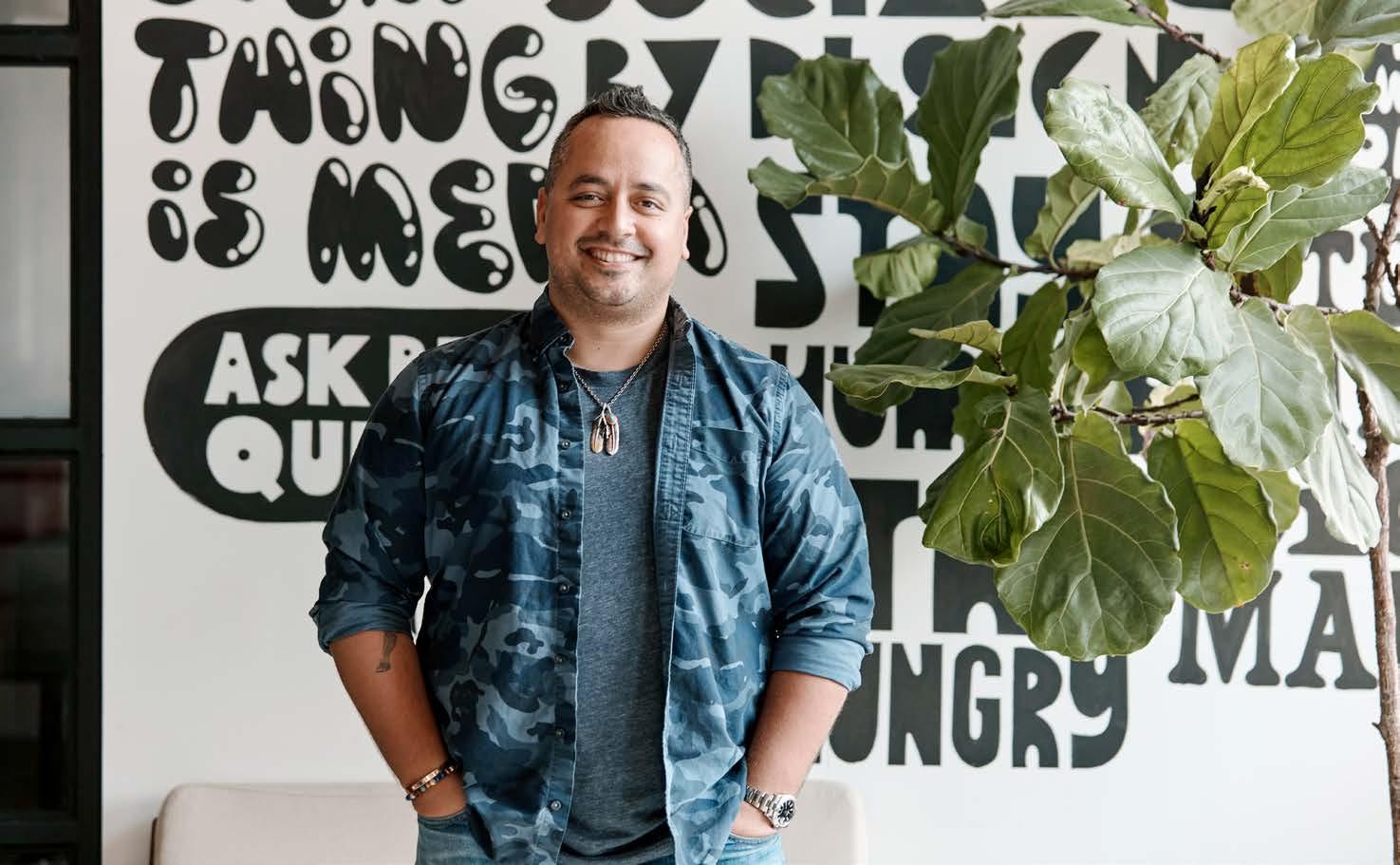
Anomaly, that was disrupting the agency model. At that particular time, Rodriguez had just gotten married, bought a new house, and he and his wife were expecting their first child—it wasn’t a great time for another significant change. Still, Rodriguez agreed to meet with Anomaly’s founding partner and CEO Carl Johnson, and by the end of their “not-an-interview” conversation, he knew he needed to work for Anomaly, where he could challenge himself and climb to new heights.
Nearly twelve years later, Rodriguez is now a partner and the CEO of both the New York and Toronto offices. “If you’re ambitious, entrepreneurial, and you really hustle, you can be in charge of your own destiny here,” he says. “Come in, do awesome work, and go far. It’s a true meritocracy.”
Rodriguez says that Anomaly’s name remains its greatest creative coup. “By definition, it’s a departure from the common order,” he says. “We have a strong and differentiated point of view, and we’ve designed every part of our company to deliver against that proposition.” That intention resonates through the company’s culture and new business approach. Other agencies, Rodriguez explains, tend to sell their product—whatever output they are set up to create—as the solution to the client’s problem, regardless of the fit, as in the adage, “to a man with a hammer every problem is a nail.”
“We’re really selective about the type of new business we pursue. Above all, we look for a shared ambition and an alignment of values. Then we go hard at determining what we genuinely believe will solve that client’s
business problem and we recommend that as the solution.” he explains. “In a few cases, we’ve come back and recommended things that sit outside our core expertise—like the very first branded mobile game, which we developed for Captain Morgan.”
As marketing continues to mature and add specializations, and as the agency landscape continues to get more competitive, more and more agencies will make exaggerated claims, he warns. “Many agencies profess to do everything. It’s sort of a great race to the middle,” he says. “Our internal challenge is to permanently stay in beta, and make sure we’re constantly expanding our capabilities and our offering—always building around world-class talent—and then actually go further faster to deliver it.”
The company prides itself on pitching in a unique way, often proving to prospective clients that advertising alone will not solve the business problem, and instead delivering a holistic proposal for the totality of the client’s business. Its best clients respond to this ambition in kind, and both companies advance and succeed together.
As Anomaly has grown—from one office in 2004 to seven in six countries in 2019—one of the biggest challenges has been protecting the definitive characteristics that drove its early successes. Rodriguez lists a few of them:
• Stay humble, stay hungry
• Always do what you say you will
• Allow great ideas to come from anywhere
• Never allow ego to get in the way
• Never get complacent
• Never lie One reason Anomaly continues to succeed is that it is a values-based
agency that embraces and champions these values above all, whereas many other agencies simply espouse the rhetoric. To ensure the values permeate its culture continuously, the company employs a number of programs and platforms. For example, DNA is a live lecture series and video library (“think TED Talks for Anomaly employees,” Rodriguez says) that turns professional insights and global case studies into shareable content. Through DNA, Anomaly is curating a global canon of knowledge with a variety of content to accelerate immersion into the company for new employees and to teach long-time employees new skill sets.
Additionally, brand teams are combined into cross-functional supergroups to form “mini agencies” inside of Anomaly. Those teams report into passionate leaders who love and grow with Anomaly—an important trait for perpetuating the company’s mission, vision, and values to all employees. That structure, Rodriguez says, reproduces the spark and spirit that started with a small founder-led company across a now big and successful global operation. That spark also keeps the organization—and Rodriguez—versatile, humble, and disciplined while the industry evolves.
When asked about the biggest driver of the company’s success, he says, “It’s very simple. At Anomaly, we do what we say. We may not be perfect, but we’re clear about who we are and what we stand for, and we deliver on that consistently. No exceptions. Talent, culture, and ambition drive everything for us, and we’re fortunate to continually find clients who share our perspective.”

We’re proud of the work you’ve done to reintroduce the Beautyrest® brand and helping America
BE MORE AWAKE.™
From your friends at Beautyrest.
BY WILL GRANT
Sal Montes subscribes to Fender’s belief that instruments can make musicians “fly,” and he’s leading a cultural and manufacturing transformation at the guitar giant to focus on small-batch and custom creations
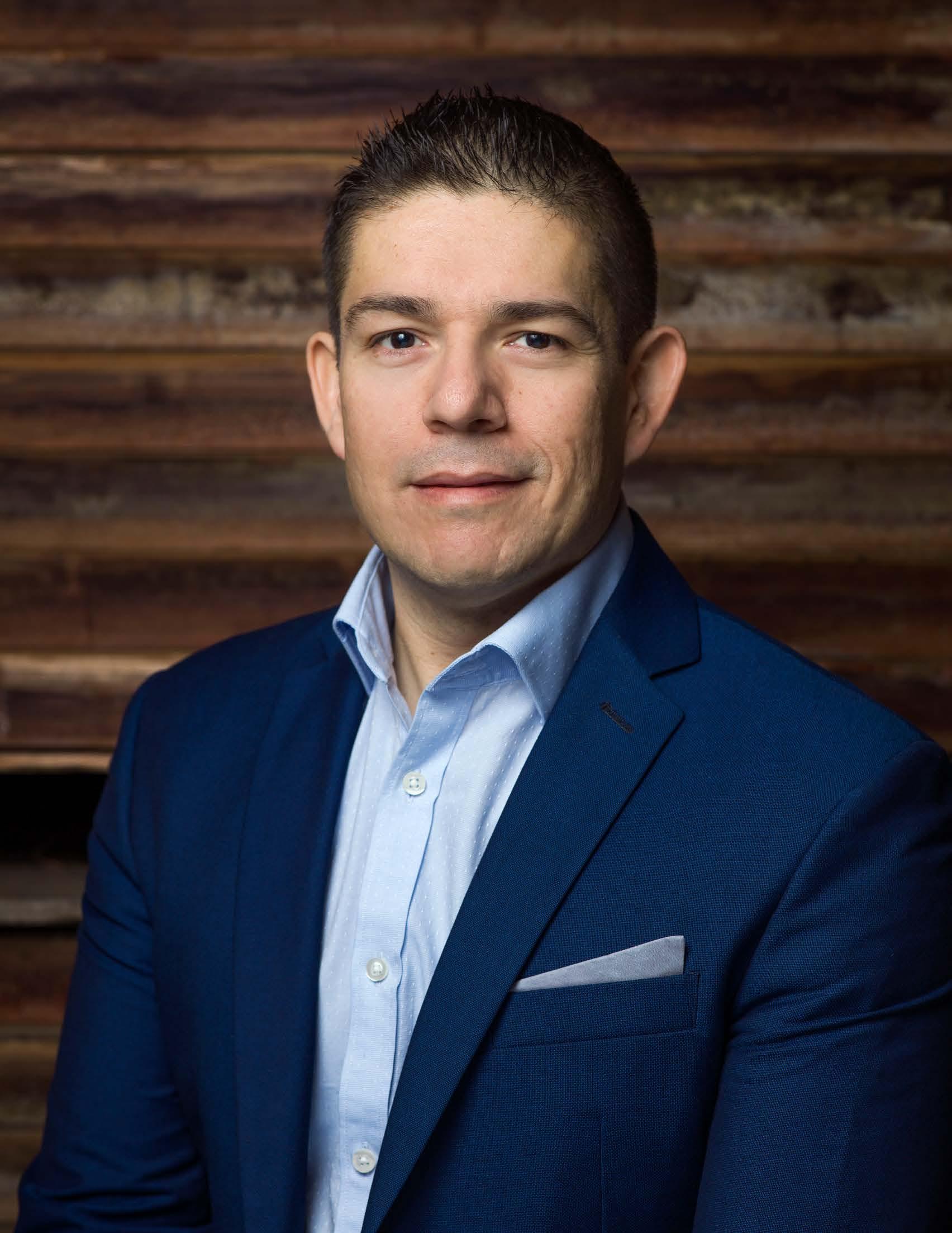

Sal Montes VP of Manufacturing Operations
Fender Musical Instruments Corporation

SAL MONTES IS QUITE CLEAR ABOUT WHAT FENDER IS AIMING FOR:
“We want to be the center of excellence in small-batch production and customized guitars,” he says of the Corona, California, production facility.
Montes, vice president of manufacturing operations at the most recognizable guitar brand in the world, says the company is in the middle of a cultural and production transformation that they’re looking at not in terms of years, but in terms of its legacy potential. “Our big challenge is to sustain that change,” Montes says. “This transformation will be residing here as a commitment to becoming a perpetual training organization.”
Montes came to Fender Musical Instruments Corporation after eighteen years in aerospace engineering, accruing extensive operations and management experience at Bombardier, Honeywell Aerospace, and General Electric Aircraft Engines. It may be a coincidence that one of Fender’s latest limited-edition guitars, the Parallell Universe Series Meteora, more closely resembles a sleek, otherworldly aircraft, but Montes says his experience definitely carried over in a few unique ways applicable to musical instruments. “I brought a quality-culture mind-set to Fender that we see in both industries,” he says. “We may
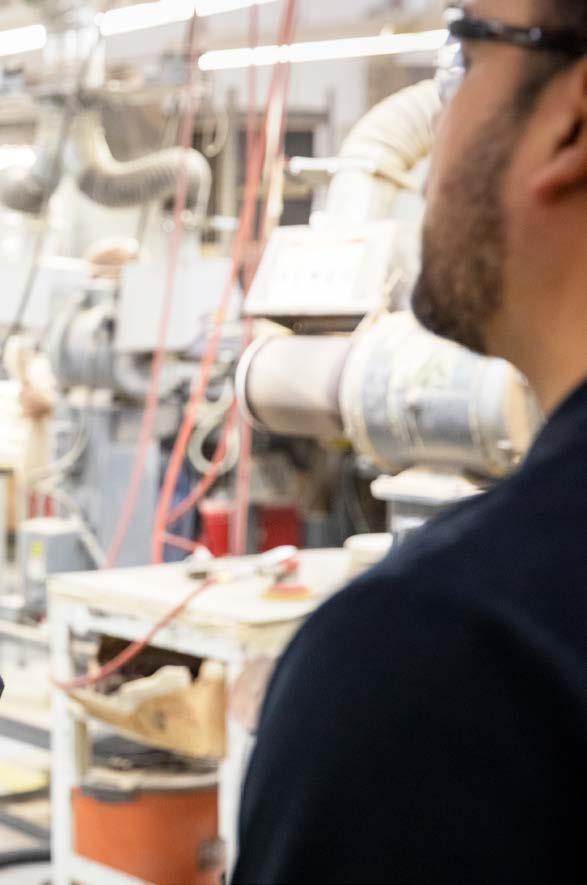
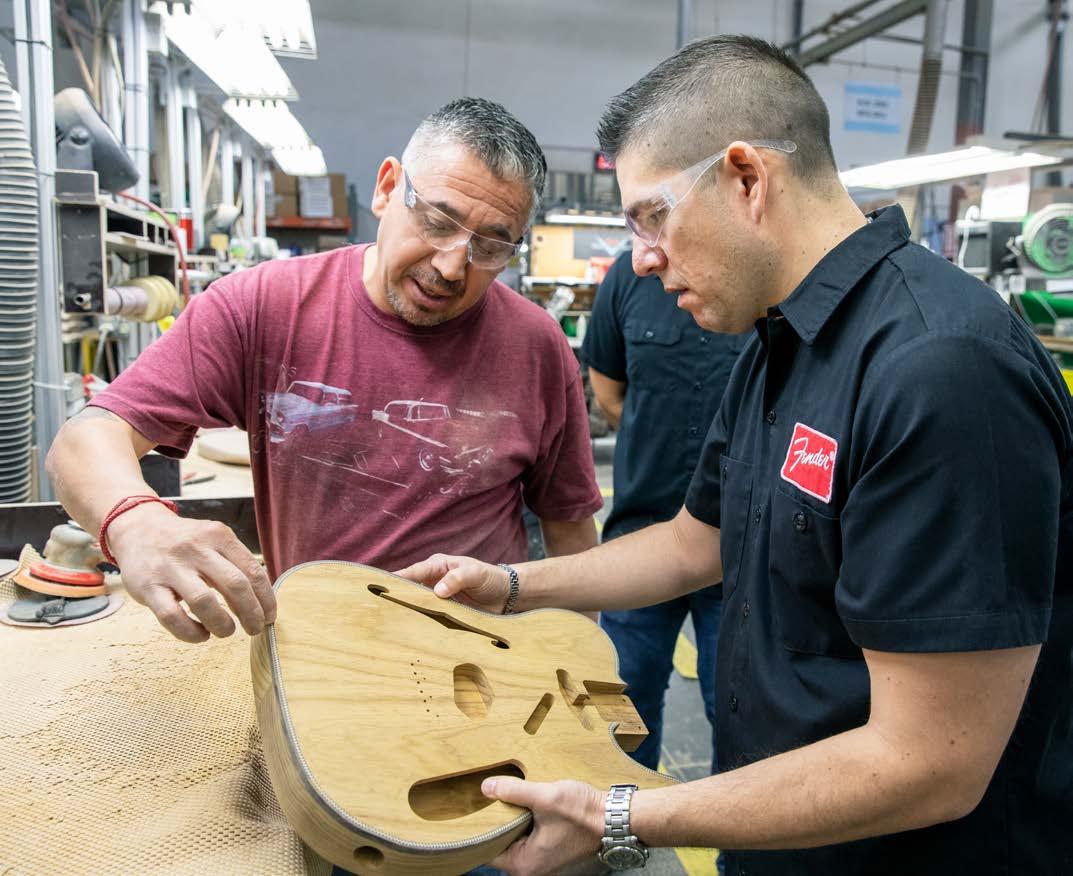
California, production facility, Sal Montes works with staff—who take great pride in their work—to ensure the highest levels of quality in small-batch production and in making customized guitars.
think that it’s even more important on a plane because there are lives involved, but in the musical instrument industry, it’s critical at the same level.”
For Fender’s Corona facility, Montes and his team are focused on transitioning the culture away from a volume mind-set into one of dedication to quality. “We’re the best of the best at making guitars,” he explains, “but having the ability to move back and forth in small custom batches: that’s what we’re working toward now.”
The focus on quality means that if three defects show up in a row on the factory line, the line closes down until a solution is found. That simply is not the case in an industry that is often so volume-driven. “We’re seeing that the customer wants custom guitars. They don’t want a guitar that anyone else has,” Montes says. He believes that Fender CEO Andy Mooney’s focus on Corona’s small-batch quality production is a winning plan, and aerospace’s rigid focus on safety makes this quality approach one Montes is well-versed in.
Montes’s background is also applicable in helping to create a perpetual-training organization. “We want to make sure we have the proper certifications and do a good job of keeping our talent and

“Music is about family” is more than a motto for Sal Montes. Music helped him figure out where he belonged early in his life. “I wasn’t very sporty,” he recalls. “My parents tried to get me to play soccer, but I was following ants instead of following the ball.” Once he started taking guitar lessons at age ten, he realized he had found a calling.
He met his wife while playing his own Fender guitar in a wedding band. The band started doing so well he actually considered leaving his job to gig fulltime. But when thinking about starting a family with his wife, Montes decided it made more sense to raise a family from home than from the stage. “When I was contacted by Fender in 2017, I thought it was an amazing opportunity to bridge my operational side and my love of music,” he says.
He and his wife continue to make music together today in a Latin-influenced band that plays Fender’s quarterly employee gatherings. “My wife reminds me of my love of music every single day,” Montes says. “She says I can’t ever leave Fender because it’s the perfect job for me.”
training organized,” he says. “What is critical for us in that training is to keep creating and developing problem solvers at every level of the organization.” To do this, every employee should be able to not only recognize a potential problem, but also use specific methodology to solve it.
Fender’s transformation also includes working to define pre-control leading indicators instead of lagging indicators. “After you produce something, you measure your quality yield,” Montes says. “We want to do the opposite: We want to know what is going to go wrong before we produce—then, we can control that variable in order to ensure that our yield will meet expectations.”
While Corona’s efforts towards a transformation may seem like a tall order, Montes says that Fender’s inherent familial culture lends well to the task at hand. “You can’t imagine the pride here,” Montes says. “I joke that we don’t need a quality department, because that’s just our employees.”
He also notes that, unlike most industries, his factory makes dreams come true. “Leo Fender believed that artists are angels and his mission was to give them wings,” Montes says. “I always try and remember that.”
Despite growing awareness of the importance of diversity and of the influential Hispanic market, a Latino on a corporate board is still a rarity. The Latino Corporate Directors Association (LCDA) is changing this disparity. For this, our fifth-annual Best of the Boardroom issue, we've partnered with the LCDA to highlight the progress and prominent figures in today's boardrooms.
PATRICIA SALAS PINEDA
BY GILLIAN FRY
We are seeing encouraging trends in the boardroom for Hispanic executives. First, in 2016 and 2017, there was a noteworthy uptick in the number of US Latino directors appointed to America’s corporate boardrooms, after ten years of stagnant growth in new Latino board appointments. Second, an increased percentage of the new annual board appointments were first-time Latino directors.
Historically, board candidates consisted almost exclusively of experienced board directors, CEOs, and CFOs. A recent report by Heidrick & Struggles noted a greater willingness by boards to consider first-time directors and senior executives below the CEO level who bring skills and experiences that are needed on today’s boards.
Tech executives, senior executives with P&L responsibilities, and general counsels are emerging as sought-after board candidates.
At the forefront in advancing these trends is the Latino Corporate Directors Association (LCDA), the only membership association consisting of US Latino experienced corporate directors and board-ready executives. As the current board chair of the LCDA, I’m optimistic that we can help move the needle on Latino board representation.
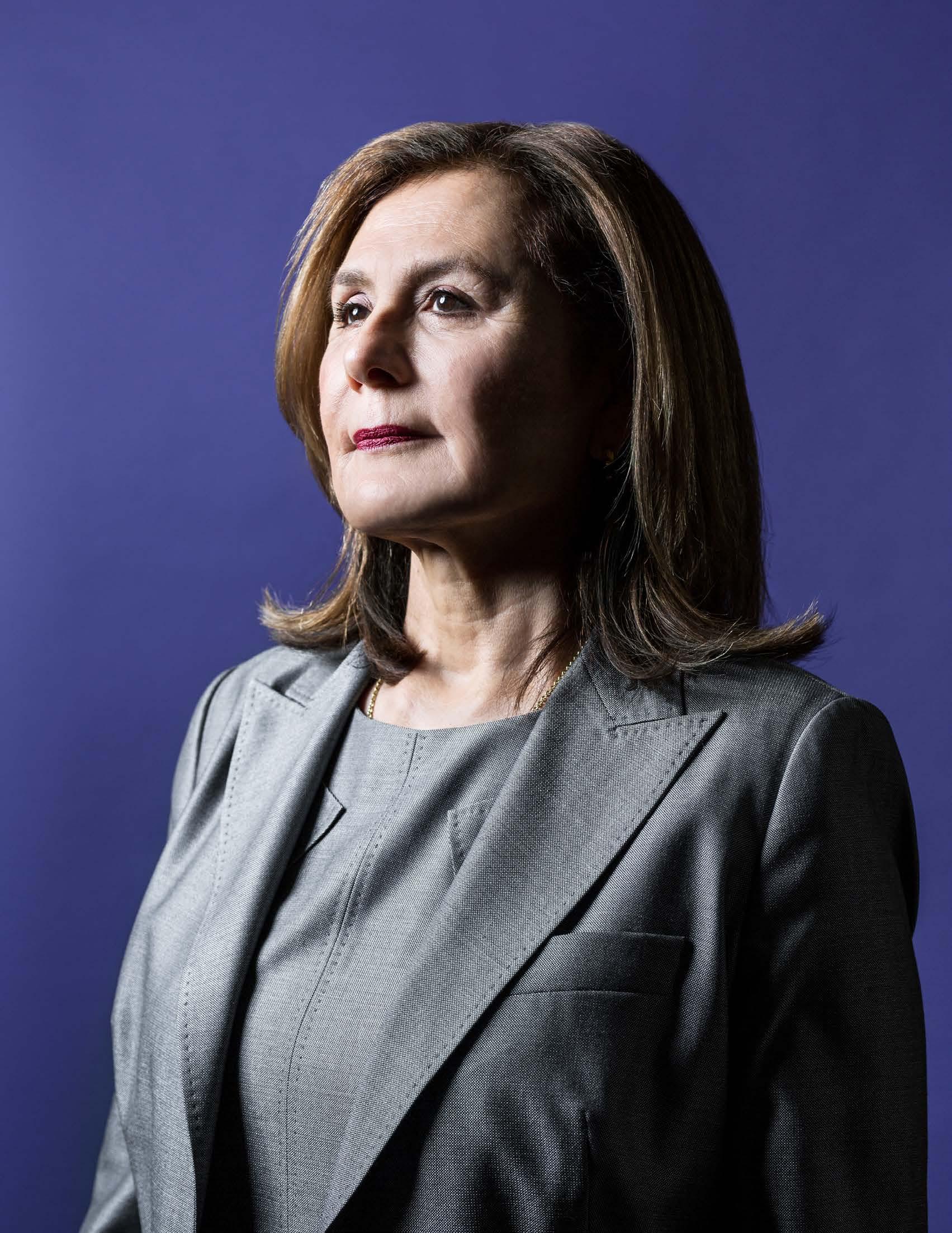
In November 2017, the LCDA’s Latino Corporate Directors Education Foundation (LCDEF) launched its BoardReady Institute (BRI) program in collaboration with Stanford University’s Rock Center for Corporate Governance and through significant investment by the KPMG Board Leadership Center. This comprehensive, two-year program is designed to identify, prepare, and position highly credentialed Latino executives and national leaders for corporate board service.
Since the launch of this program, the LCDA and its partners have helped place three of its sixteen BRI participants on corporate boards and referred countless others for board seat opportunities, which signals a positive trend for other Latino first-time, board-ready candidates.
emphasis on prospective directors who have not previously served on a corporate board.”
We have also made tremendous inroads with large privateequity firms such as Blackstone, The Carlyle Group, KKR, TPG, Clearlake Capital, and Wind Point Partners. These firms have ownership interests in both private and public companies and influence the board composition of those companies.
In addition to board chair, I am also a founder of the LCDA and LCDEF, and the growth in membership and influence of these organizations since their founding is so promising. This past year, we surpassed $1 million in annual fundraising and we have successfully launched initiatives to:
• Increase the supply of Latino board-qualified candidates
• Drive demand for Latino board talent through key partnerships
• Host the most important gathering of CEOs, search firms, private equity firms, and Latinos at the highest levels of corporate board leadership the LCDA Annual Board Leaders Convening
• Build the LCDA’s infrastructure
"IN THE CURRENT BUSINESS CLIMATE, INSTITUTIONAL INVESTORS AND SHAREHOLDERS ARE PUSHING FOR GREATER DIVERSITY ON CORPORATE BOARDS."
We had a banner year in 2018, the LCDA’s third year in operation. We referred candidates to more than forty-five board searches, up from five in 2017, and influenced the placement of fourteen members and associate members on boards. Also, for the first time, we saw greater consideration of Latino and diverse candidates for the boardroom by executive search firms. And, today, the LCDA has more partnerships with executive search firms than ever, including Korn Ferry, Egon Zehnder, Russell Reynolds Associates, Heidrick & Struggles, RSR Partners, Diversified Search, NACD Board Services, and Boardspan.
Another promising development: Heidrick & Struggles announced in November 2018 a pledge that at least half of its cumulative slate of initial board candidates presented to clients will be diverse, including Latinos, Asians, and African Americans. In its announcement, the firm stated “it will proactively identify and interview diverse director candidates, with an
While our success is still in its infancy, we expect to see continuing affirmative change.
In the current US business climate, institutional investors and shareholders are pushing for greater diversity on corporate boards as a competitive business advantage and a matter of sound corporate governance. There is also a growing body of research that confirms the correlation of gender and race/ethnic diversity with better corporate performance.
For many US companies, Latinos represent the fastest-growing consumer segment. Latinos are also a driving force of the US economy as a whole. Fifty-seven million Latinos make up 18 percent of the US population and according to the US Census, accounted for half of the employment growth between 2011 and 2015. If the 2015 US Latino GDP of $2.13 trillion were a country, it would be larger than India, Italy, Brazil, and Canada. The US Latino community is projected to account for nearly a quarter of the total US GDP growth by 2020.
The importance of the US Latino market has been known for years. Yet there is a continued disparity in the representation of Latinos on corporate boards. A 2018 study by RSR Partners showed that Latinos held 243 of the 9,966 board seats on
Fortune 1000 companies: a little more than 2 percent. This is in sharp contrast to the 18 percent of the US population represented by Latinos.
Furthermore, nearly 80 percent of Fortune 1000 companies are void of a single Latino on their boards. While the aggregate number of board seats held by Latinos grew by twenty in 2016 and by fifteen in 2017, there is much room for improvement. US Latinos remain the most underrepresented population segment as compared to our size.
Given the critical importance of the US Latino consumer market to most companies and the availability of qualified and experienced Latino board candidates, this continuing underrepresentation is unacceptable.
There are no more excuses.
Therefore, as opportunities have broadened, Latino executives interested in a board position must prepare and position themselves. Preparation should include the development of the necessary business and board-governance skills and experiences, and positioning includes a supportive corporate board network and professional board profile.
Prior to being appointed to a first board, I always advise interested candidates to get leadership and governance experience by serving on the board of a nonprofit that they feel passionate about and want to support. For many current directors, nonprofit board service served as an entrée to corporate board service.
For 2019, the LCDA will double down on its efforts to drive demand and opportunities for US Latino corporate board placements. We will do this by actively engaging with companies with board seat opportunities and by leveraging our partnerships with institutional investors, pension funds, search firms, and private-equity firms. We will also do this through communications: showcasing the strong supply of experienced Latino directors and Hispanic executives primed for the boardroom, such as those featured on the following pages.
We clearly have a lot of work ahead of us. Fortunately, with the wind at our backs and the infrastructure we have built, we are prepared to positively impact the corporate governance landscape.
—Patricia Salas Pineda Cofounder & Board Chair
BOARD DIRECTORSHIPS: THE OPPORTUNITY FOR LATINO EXECUTIVES
2.4% of board seats for Fortune 1000 companies are held by Latinos 1
79.9% of Fortune 1000 company boards are void of Latinos 1
60% of all Latinos appointed to corporate boards in 2016 were first-time directors 2
36% of new board appointees in 2017 had no previous board experience (11% more than 2016) 3 6% of new board appointments in 2017 went to Latinos 3
CNS GLOBAL ADVISORS
ARCHER DANIELS MIDLAND COMPANY
TEEWINOT LIFE SCIENCES
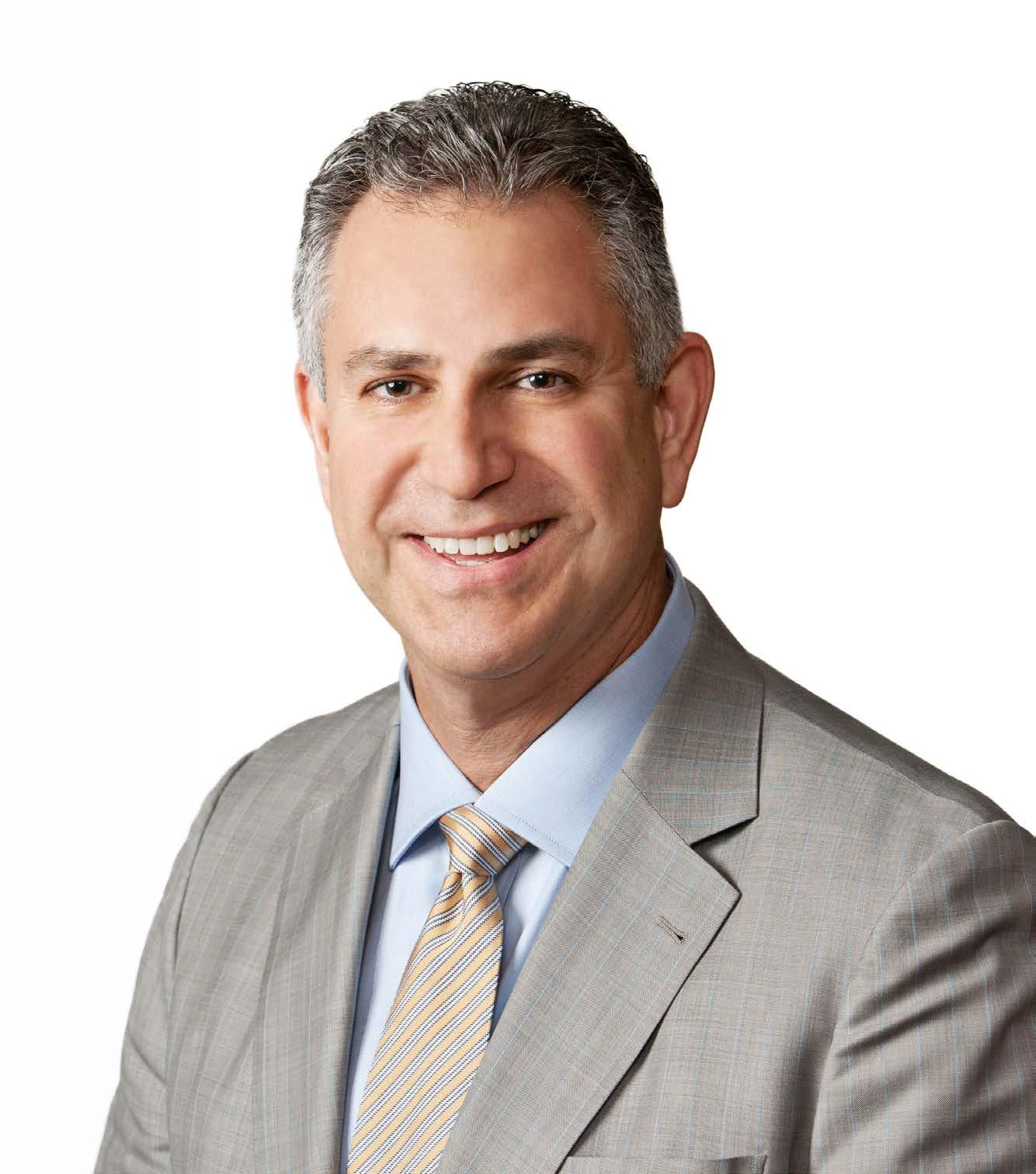
As chairman of CNS Global Advisors and former undersecretary for international trade at the US Department of Commerce under President Barack Obama, Francisco has a long and distinguished career in both the public and private sectors.
- PATRICIA SALAS PINEDA, GUEST EDITOR
BY LIOR PHILLIPS
At the age of twentytwo, Francisco Snchez had saved up the princely sum of $8,000.
He was eager to go out and see the world, fascinated by international cultures. So began a trip that lasted nearly a year and took him to five continents and twenty-three countries. While a trip abroad is common among young adults prior to starting their careers, Sánchez’s journey was much more. From a young age, Sánchez wanted to learn about the world and was inspired by his parents to do so through firsthand cultural immersion. His mother, the daughter of Spanish immigrants who settled in Florida in the early 1900s, had earned an international fellows scholarship from the US Department of State and attended Columbia University. His father, also an immigrant, had run a small family business in Spain before coming to the United States.
“I was six years old the first time we visited Spain, and I never lost my fascination with learning about different cultures around the world,” he says. Eventually, Sánchez would turn that passion into an impressive career in international business, prominent appointments in the US government, and a powerful voice in both board leadership and corporate management as founder of CNS Global Advisors.
Sánchez’s travels and interactions with people across the globe helped develop cross-cultural interpersonal skills that proved essential in roles throughout his career. Interest in others, empathy, and patience were just as important when making decisions in a boardroom as navigating the intricacies of a foreign culture. Sánchez similarly relied on his family history for its entrepreneurial spirit; in addition to his father’s candy manufacturing and wholesale business, Sánchez has multiple other relatives who led their own companies or created inventions. “I was drawn to combining what I’d learned in my international experience with that entrepreneurial family tradition,” he says.
Sánchez spent much of his career moving between the public and private sectors while always maintaining his internation-
al focus. He served in the administration of Florida Governor Bob Graham as the director of the Caribbean Basin Initiative at the age of twenty-five, mediated international commercial and diplomatic conflicts in the Americas with his Harvard professor Roger Fisher, and served in appointed positions in the Clinton White House and the Obama Administration, where Sánchez was nominated to the position of US undersecretary of commerce for international trade.
Eventually, Sánchez moved back into the private sector, founding CNS Global Advisors. Just days removed from his governmental tenure, Sánchez had become the chairman of the board of his own business. Three years later, he added CEO to his title.
While CNS has worked in Europe and Asia, its focus is in the Americas—for which Sánchez again gives credit to his parents. It is through a common bond of the Spanish language and Hispanic culture that Sánchez feels a strong connection to the communities in the region. “I remember my father patiently helping me with my Spanish homework every night, suffering through my complaints and lapses in interest, but he hung in there with me,” Sánchez laughs. “It’s because of his persistence, as well as my mother and my grandmother, that I am fully bilingual, which has helped me connect with people and understand different cultures throughout the Americas.”
With CNS, Sánchez continues his international travel while providing two primary services to clients: financial advisory services specifically focused on project finance with development finance institutions, and strategic advisory services for companies entering new international markets. “We will help them gain an understanding of new markets for investment and work to build a comprehensive strategy and support services network to be successful.” Sánchez is a firm believer that the first step to being successful in a new market is understanding the business culture and society as a whole. “We work with our clients to build an international project team consisting not just of the foreign investment group, but local employees and service providers whose understanding and experience in navigating their particular market is crucial.”
Sánchez sees how diverse multicultural perspectives build upon each other and benefit not just an individual project in a foreign market but also operations company-wide. “As I looked at
corporate America, I saw gaps in fully embracing diversity,” he notes. “Companies are leaving value on the table.” Increasing diversity benefits the business world and gives a voice to underrepresented communities. As such, Sánchez connected deeply with the mission of the Latino Corporate Directors Association. “I was immediately drawn to becoming a member and being active in the association,” he says.
Bringing those underrepresented perspectives to the table is just the start. Many leaders then fail to follow diversity initiatives with the skills that allow Sánchez to operate in markets across the globe. His secret: “I ask more questions than I issue orders,” he says. Only then can Sánchez gain an understanding and build a path forward. Those same factors extend to working on a board. “What do I need to understand better? What concerns me?” he says. “Asking good questions is essential to being a valuable and effective board member.”
In addition to his own company, Sánchez sits on the boards of Global 50 company Archer Daniels Midland (ADM), Teewinot Life Sciences, and the H. Lee Moffitt Cancer Center and Research Institute. Holding both management and board positions, Sánchez understands the differences between the two mind-sets. “When you run a company, you are responsible for day-today operations, and when you’re on a board, you are providing oversight and approving large decisions,” he says. “For someone who runs the day-to-day of a business and who’s never been on a board, there can be a tendency to blur those lines.”
While the companies and nonprofit for which Sánchez acts as a board member may differ greatly, he’s able to draw from his experiences at one to make recommendations and provide guidance at another. Having worked in Latin America and Asia with CNS, for example, he was able to offer valuable international perspectives at ADM as it contemplated a major decision.
As with the Moffitt Cancer Center, boards also offer the opportunity for business leaders to give back to the community. Again, Sánchez was inspired by his family to give back. His mother Delia developed and ran a child development program that would go on to be the basis for the national Head Start Program. “Watching my mother help others was so inspiring,” Sánchez says. “She was my role model, and made me want to find ways to serve others.” In addition to working with Moffitt, Sánchez sits on the advisory board of the Aspen Institute Latinos & Society Program.
While Sánchez may be working to the benefit of multiple boards, he sees plenty of room for growth left for CNS. He hopes that he is providing the same inspiration and opportunity to explore the world and learn from others that others gave him. “I want to nurture the talent in my company and eventually turn it over to the younger people and let them take it even further,” he says.
Congratulations to Francisco Sánchez and Debra Sandler for this recognition of their leadership and achievements.
ADM thanks Francisco and Debra for their commitment to helping us serve the world’s vital needs.
Debra is current president and CEO of La Grenade Group, LLC, a marketing consultancy that serves packaged goods companies operating in the health and wellness space. She is also a budding entrepreneur, founding Mavis Foods, LLC, a startup of Caribbean sauces and marinades. Previously she worked for more than thirty years in senior leadership roles at PepsiCo, Johnson & Johnson, and most recently as chief health and wellbeing officer at Mars, after serving there as chief consumer officer and president of Mars Chocolate North America.
- PATRICIA SALAS PINEDA, GUEST EDITOR
ON THE BOARDS OF
ARCHER DANIELS MIDLAND COMPANY
GANNETT CO., INC.
PHARMAVITE
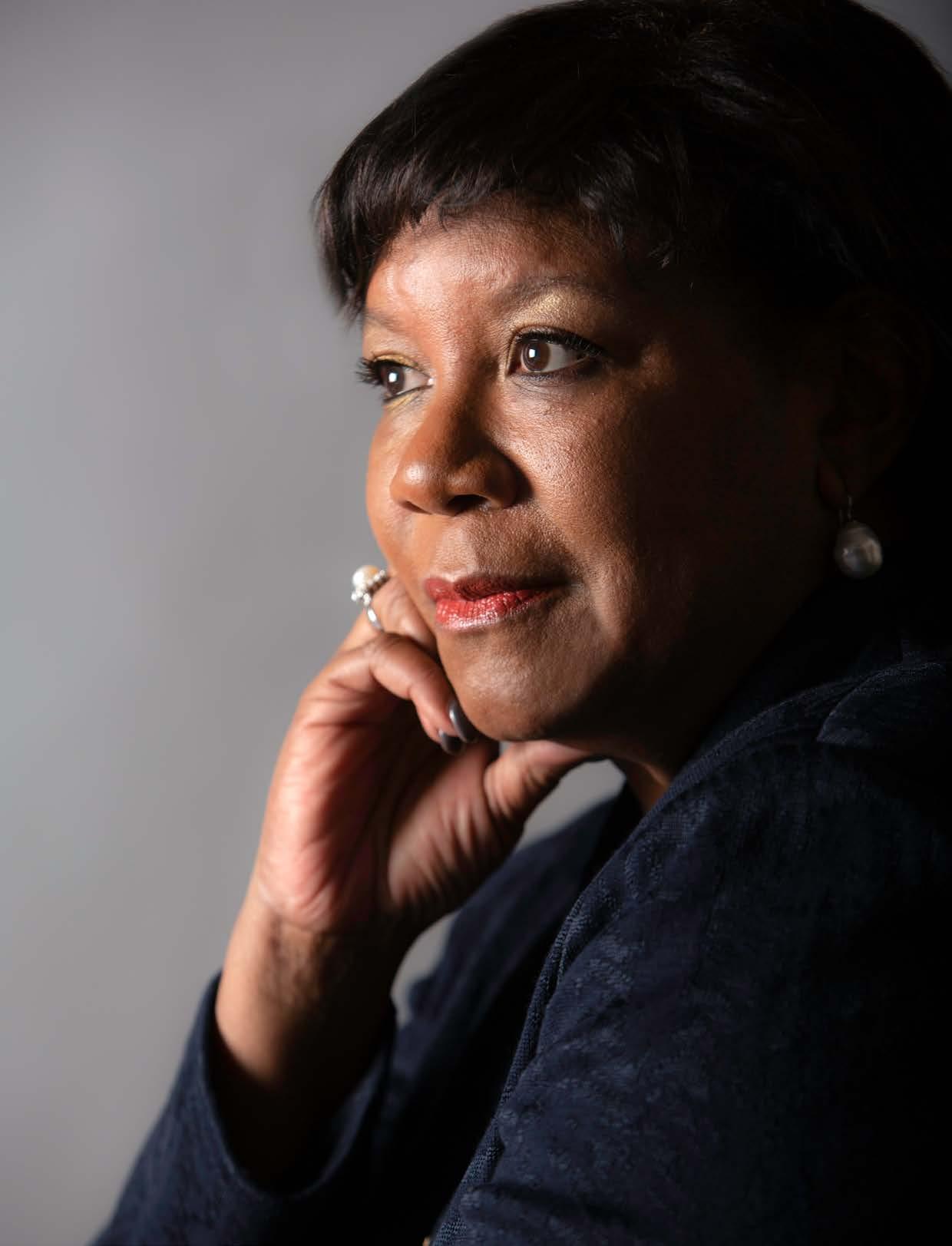
BY ANTHONY RUTH
From growing up in Trinidad amongst a large extended family, to helping launch Splenda, to starting her own food company inspired by her aunt's recipes, Debra
Sandler knows the significance of what's on the table as well as who is sitting around it.
“We’re an immigrant family. When we get together, food is so important,” explains Sandler, who was born in Venezuela and also has Ecuadorian ancestry. “That is what is at our core, what we enjoy, and the way we hold onto our roots.”
Sandler has threaded those roots throughout her career, which spans more than thirty years managing some of the best-known brands at PepsiCo, Johnson & Johnson, and Mars. At PepsiCo, she drew on her cultural background to drive the business, becoming the ethnic marketing leader across all the beverage brands and helping the company expand its customer base, particularly into the Hispanic market. She also realized her dream job as vice president of marketing for Latin America and the Caribbean, which allowed her to fully draw on her background.
Today, serving on three corporate boards—Archer Daniels Midland (ADM), Gannett, and Pharmavite—Sandler is working to bring more diversity to the boardroom, and she finds her involvement with Latino Corporate Directors Association helps her stay connected to and reaffirm her heritage. “It’s important to me for people to know who I am in my entirety,” she says.
A self-described planner, Sandler always knew she would make her way into corporate governance, the question was only when. After thirteen years at PepsiCo and having her daughter, she decided to increase her focus on wellness. “What can I do with my skill set to make the world a little bit of a better place?” she asked herself. “I’m not a NASA scientist, I’m not going to put someone on the moon, and I’m not going to solve world hunger, but I can use my marketing skills to make a difference in some way.”
Sandler joined Johnson & Johnson, which was just getting into the nutraceuticals business. “They had devices and pharma-
ceuticals to help people with their health, but it was all in treatment and cure,” she explains. “The thought at the time was, how can we get into prevention by helping people with what they eat?”
While there, Sandler helped steer the launch of Splenda, which she calls the greatest experience of her career. She was excited by launching a brand with meaningful purpose, the opportunity to help people live healthier lives, and the use of food as the vehicle. “It spoke to my core,” she recalls. “It’s nice when you can get that sweet spot: when what you’re doing fits with who you are and your personal mission.”
"IT'S NICE WHEN YOU CAN GET THAT SWEET SPOT: WHEN WHAT YOU'RE DOING FITS WITH WHO YOU ARE AND YOUR PERSONAL MISSION."
It was during her time at Mars, where she eventually became chief health and wellbeing officer, that Sandler got the call from Gannett to join the company’s board. She had received other invitations over the years, but her previous employers didn’t allow executives to serve on corporate boards, and she also hadn’t been ready to make the leap. This time, she says, it felt right, and before long her board portfolio tripled. “The next year, ADM called, and they are focused on providing nutrition to the world—can’t say no to that,” she explains. “And, after that, Pharmavite called, giving me the opportunity to work with a highly ethical Japanese-owned company.”
For Sandler, board work is an opportunity to be involved in businesses, provide leadership, and continue to grow and develop herself. “To help companies address some of their key issues has been absolutely fabulous,” she says. She points to Gannett’s evolution to include digital services and ADM’s focus on providing better food ingredients as some of the initiatives she’s been excited to be part of as a board member. And Pharmavite, which produces NatureMade supplements, brings Sandler back to her healthcare focus. “I can’t speak enough about the need for good and healthy supplements to our diets,” she says.
“Debra’s breadth of experience in the wellness industry brings sharp, fresh views and a unique perspective to Pharmavite’s board,” says Pharmavite CEO Jeff Boutelle. “She has proven to
be a tremendous asset and trusted advisor to me since I started as CEO, and her insights and contribution are invaluable for our company’s future growth.”
Sandler is also proud to chair the nominating and governance committee at Gannett, through which she hopes to continue bringing diverse candidates into the boardroom, though she is quick to point out that this is every board member’s role.
“You want a board with diverse people who all feel like diversity is a priority,” she says, adding that she’s been pleased to encounter this conviction on her boards. She also cites research which has shown diverse boards are better for a company’s bottom line. “Having people around the table who look and think differently from each other will drive greater financial growth for the business,” she says. “It’s that simple.”
The biggest surprise for Sandler in serving on boards is how different sitting in the executive suite running a P&L is from sitting on an audit committee. Realizing she’s not running the day-to-day business anymore has challenged Sandler’s “Type A” personality but in a good way.
“I like to continue to learn and grow,” she says. “Every year I’m doing some training and attending conferences to make sure I’m on my game and able to add value and to steward.”
Her new venture, Mavis Foods, named for her aunt, is also a learning opportunity for Sandler, albeit one that builds on her extensive food and beverage experience. The company produces marinades and sauces that have been in Sandler’s family for generations, and it’s giving her insight into direct-to-consumer sales, an area Pharmavite is looking into, and another skill she can bring to the boardroom. And, once again, it brings Sandler, the company’s CEO and “Sauce Boss,” back to her roots, paying homage to her family, her culture, and its food.
Sandler is thriving on what she calls her “smörgåsbord life” and is even considering joining a fourth board, as long as it’s something really interesting.
“Every day is something totally new,” she says. “I am really enjoying it to the fullest.”
Hispanic Executive has honored our very own Debra A. Sandler, CEO & Sauce Boss, Mavis Foods, LLC for their annual Best of the Boardroom 2019 edition. Congratulations Debra on this well-deserved recognition.

in saluting the Best of the Boardroom Class of 2019
Heartfelt congratulations to prominent Zarb School alumna and Hofstra Trustee
Debra Sandler, ‘82, B.B.A.





CON G R ATU L AT I O N S D E B R A S AN D L E R,
M E MB E R, P HARM AV I TE B OAR D
O F E X E C UT I V E MA N AG E R S

At Pharmavite we share Debra’s passion for health and wellness and the importance of quality and integrity. More than 45 years ago, Pharmavite’s founders aimed to improve health & wellness by focusing on the basics—good nutrition and essential nutrients & minerals. Since that day, Pharmavite has become a leader in the health and wellness industry. The company’s sole purpose then and now is to bring the gift of health to life, by helping people achieve a healthier way of living.










A former US ambassador to Mexico, lawyer, distinguished public servant, and cross-border specialist, Antonio brings exemplary diplomatic, business, and political expertise to his work. He is acknowledged as one of the top experts on US-Mexico relations and on the business and political environments of both nations, and currently advises a number of companies and investors active in Mexico's energy sector. He is also an active LCDA member committed to growing the director talent pool and developing the pipeline of senior-level and board-qualified candidates.
- PATRICIA SALAS PINEDA, GUEST EDITOR
ON THE BOARDS OF
KANSAS CITY SOUTHERN
KANSAS CITY SOUTHERN DE MEXICO
MONEYGRAM

BY DAVID LEVINE
A former US ambassador to Mexico (2002-2009), he is now counsel to White & Case LLP in Mexico City. Garza also is currently a board director for Kansas City Southern, where he is member of the executive committee and chairman of the company’s subsidiary, Kansas City Southern de Mexico; as well as a board director for MoneyGram, where he serves as chairman of the company’s committee on compliance and ethics. Additionally, the Ambassador is a trustee at Southern Methodist University and acts as chairman of the university’s committee on legal and governmental affairs.
Yet it was his first experience serving on a board, more than thirty years ago, that set the tone for his career. He then served on the board of a south Texas community health center, a federally funded clinic focused on indigent and migrant health care. “The issues were challenging, but the experience of being part of a board made up of patients, physicians, and community members was a defining one for me,” he says. “I learned early on that building coalitions meant really putting in the work, understanding the organization and your fellow board members, and having a clear sense of direction.”
He says that his time on the clinic board set in motion his move away from a business-centric legal practice to what would become nearly twenty-five years of public service, first as a county executive, later as Texas secretary of state, then chairman of Texas’ leading energy regulator, and ultimately US ambassador to Mexico.
Garza grew up in south Texas, near the Mexico border. “I was exposed to and have been part of a diverse set of cultures. And that’s meant listening, learning, and trying to understand
different points of view and ways of looking at the world,” he says. Those lessons have served him well throughout his career. “I’ve been very fortunate throughout my life to have had the support of mentors, personally and in the professional arena,” he says.
He has served on many different nonprofit boards and commissions over the years. “At each opportunity, whether it be a local Boys and Girls Club, statewide commissions on education and juvenile justice, alumni associations, or advisory boards to presidential centers, I’ve met people from whom I’ve learned a great deal and have been a big part of what I’m doing today.”
His advice for young Latinos is to stand out from the pack. “Get known for your judgment and integrity, and then raise your hand,” he says. And he believes that the Latino Corporate Directors Association (LCDA) is an excellent resource to use. “One of the things I think the LCDA has done well, particularly as relates to publicly traded company boards, is expose Hispanic candidates to opportunity, and worked on building a solid pipeline of candidates for the future.”
And corporate leaders need to do more, he feels. “I am not going to lie to you, our Latino numbers aren’t what they should be. And that’s not me talking anecdotally. Look at the research and you’ll find that over the years fewer than 5 percent of all new directors have been Hispanic, with only slight movement of late to the upside,” he says. “Hard to believe that in the face of unprecedented demographic growth and market opportunity, the corporate world has been so slow to respond. What boards need is both a commitment to broadening the pool in terms of diversity, and to expanding their idea of what they’re looking for in a director.”
The LCDA provides effective advocacy, education, and exposure for Latinos to those who are making the decisions about who’s
going to be in the boardroom, he says. “And think about it, in a little over five years, the LCDA has built the coalitions, databases, and engaged in direct dialogue with search firms, investors, and large shareholder groups. These are all absolutely critical efforts designed to get those numbers up, something no one of us could have possibly done on our own. And here’s the kicker, it’s not just good for Latino candidates, it’s good for corporate bottom lines.”
His experience as an ambassador and counsel in a large international law firm compares favorably to that of board membership. “It speaks to a mind-set as much as skill set,” he says. “Today’s companies find themselves dealing with any number of challenges. Cyber, geopolitical, disruptive, and evolving market forces all against a backdrop of populist political movements that have put trade and monetary policy in flux.”
As ambassador, he chaired a weekly meeting of political,
"I LEARNED EARLY ON THAT BUILDING COALITIONS MEANT REALLY PUTTING IN THE WORK, UNDERSTANDING THE ORGANIZATION AND YOUR FELLOW BOARD MEMBERS, AND HAVING A CLEAR SENSE OF DIRECTION."
economic, commercial, law enforcement, and Intelligence officers to discuss and evaluate those matters and chart a course of activity focused on representing US interests abroad, often business and commercial. “In those days, my duty was to US interests and taxpayers. Today at White & Case it’s to clients, and in the boardroom to shareholders,” he says. “The point is that, while my fiduciary responsibilities may differ depending on the situation, the approach and mind-set are similar. How best to evaluate your operating environment, analyze the risk and return, mitigate those risks, and then respond effectively?”
Garza has learned a lot about leadership, and has some ideas on how to pass his knowledge on to the next generation. “My wife’s youngest recently graduated from college and I gave him a copy of Yuval Noah Harari’s 21 Lessons for the 21st Century. In one of the essays Harari spoke to what a young person needed to succeed in a world where the only constants were change and uncertainty. He wrote that the ability to think critically, communicate effectively, collaborate constructively, and be both resilient and creative were all essential to success,” Garza says. “In my mind, that’s also the essence of what it takes today to be an effective leader and corporate director.”
It is not surprising to hear the ambassador, a native Texan, also work in Sam Houston’s “Do right and risk the consequences” quote when talking about leadership. But that summarizes Garza’s core beliefs. “There’s no doubt that today’s leaders need to possess the integrity and judgment to do right,” he says. “But in order to figure out what’s right, that attitude best be coupled with the skills Harari talks about if they plan on surviving and succeeding in today’s environment.”
ON THE BOARDS OF
GREENBERG TRAURIG LLP
MEDNAX INC.
INTREXON CORP.
FAIRHOLME FUNDS INC.
THE ST. JOE COMPANY
WATSCO INC.

As the senior chairman and former CEO of Greenberg Traurig, Cesar has demonstrated his visionary leadership and commitment to excellence. During his tenure as CEO, which began in 1997, Cesar directed the firm's growth from 325 lawyers in eight offices to about 1,850 attorneys and government professionals in more than thirty-six locations in the United States, Europe, Asia, and Latin America, including strategic alliances in Milan and Rome, Italy. Under his leadership, the firm has been recognized as the fastest-growing law firm in the United States and is among the Top 10 law firms in the country.
- PATRICIA SALAS PINEDA, GUEST EDITOR
BY LIOR PHILLIPS
the dozen-or-so other guests were discussing their life dreams.
One by one, the people at the table recounted hopes for particular careers, goals, and achievements. “There were four Cubans at the table—myself included—and we all said the same thing: ‘We didn’t have dreams. We were focused on surviving,’” Alvarez says.
His place as senior chairman and former CEO of global law firm Greenberg Traurig, LLP, might be the stuff of dreams for many. But for Alvarez it was all about growing and making the business better every day—both for himself and for others. “I never gave myself the luxury of dreaming,” he says. “It’s not like I dreamt of being the CEO of the firm or sitting on a public board one day. I just kept pushing forward in business and life, and these things came about because I was working very hard to improve everything in which I was involved. Mine is more a story of survival than of dreams.”
Growing up in Cuba, Alvarez thought he would be an architect and spent his days sketching houses. But in June of 1960, at the age of thirteen, everything changed. Alvarez’s family made their way to Miami as political refugees fleeing Castro’s communist Cuba. Alvarez finds that experience essential to his worldview and career. Rather than hoping to come to the United States for prosperity or opportunity—political refugees like Alvarez were happy in their homes—but suddenly found themselves in the midst of political circumstances that called for immediate change. “Having that ‘good life’ torn apart in one day creates scars that don’t go away,” he says. “I still have them today.”
Upon moving to the United States, Alvarez’s parents strategically placed him in a high school far away from Miami’s base of Cuban exile immigrants so he could learn English and assimilate into the community. “There was not a Cuban anywhere around me,” he says. Alvarez and his younger brothers quickly learned the language and the local culture, and even joined the football team—a previously foreign concept to the former baseball players. All three excelled, but Alvarez followed the advice of a high school coach who said that he shouldn’t try out for a college football career because the coach did not think he was good enough. Meanwhile, his younger brother, Carlos, ignored similar advice, attended the University of Florida, and became the first consensus All-American as a sophomore since Doug Walker of SMU did it in 1947. “The coach was giving me the best advice he could, but I learned a valuable life lesson about not letting anybody tell me what I could and could not do; instead, now I always let the marketplace decide,” Alvarez says.
Though he did not have a career in football, Alvarez decided he would do anything to ensure he could provide stability for himself and his family. He viewed any job, no matter how difficult or undesirable, as an opportunity that could open a door and lead to something better. “The concept of ‘liking’ what I was doing was not a concept that entered my mind. I’d work twenty-four hours a day if I had to,” he explains. “As a young legal associate, I once worked sixty hours straight without sleep.”
As the years passed, those opportunities and jobs changed, but Alvarez continued to maintain that intense work ethic. He earned his bachelor’s, master’s, and law degrees from the University of Florida, and started to learn that working smart didn’t always mean working every minute of the day. Having started from the very bottom of the chain
"I
KNOW WHAT IT'S LIKE TO BE IN THE MAIL ROOM. I KNOW WHAT IT IS TO BE DISRESPECTED, TO BE AT THE BOTTOM. THAT'S WHY I BECAME A SERVANT LEADER, WORKING FOR OTHERS. WE ALL NEED TO DO WELL, NOT JUST THE LEADERS."
and learning every step along the way, Alvarez was able to provide a valuable leadership voice. “I know what it’s like to be in the mail room. I know what it is to be disrespected, to be at the bottom,” he says. “That’s why I became a servant leader, working for the benefit of others. I’m there to make the lives of our employees better and to move the organization forward. We all need to do well, not just the leaders.”
As an extension of his leadership style and his respect for the individual, Alvarez is a big believer in not micromanaging. At Greenberg Traurig he rose through the ranks to a sixteen-year tenure as CEO and executive chairman. Though immensely successful, Alvarez’s steering of the organization did not follow a typical leadership approach. “My theory is: a chief executive officer is someone who makes the least number of decisions possible,” he says. “Instead, the CEO’s job is to ensure that team members at every level have the information they need and are empowered to make the right decisions.”
Alvarez has made an equally important impact on the lives of other business leaders, in addition to the lives of many Greenberg Traurig attorneys and business staff. Over the years, he has helped take many organizations public, which, in turn, created relationships that led to offers for seats on boards. Alvarez relished those opportunities, as the boards allowed him to learn new business models, further develop problem-solving skills, and discover tools that he could take back to his work at Greenberg Traurig.
He credits his boardroom success to his penchant for simplifying complex issues and offering a clear business-oriented perspective. Recognition from boards and other lawyers proves to Alvarez that his hard work has not only improved his life, but has had a positive impact on others as well. “Being honored with lifetime achievement awards by both The American Lawyer and Chambers and Partners really summarizes all the work that my partners and I have done to build our firm, which has been recognized as one of the top law firms in the United States,” he says.
Over the years, Alvarez has seen an uptick in Hispanic representation on boards, but knows there’s still a long way to go. “A passionate speech in the middle of the boardroom about the importance of diversity may seem like an appealing way to draw attention to the issue,” he says, “but the desired impact will likely not be achieved with that approach. Building personal relationships with other board members and changing minds
is a long-term strategy that will deliver much more effective results. Educating people about diversity takes time and they need to see the benefits of having more inclusive representation in a business setting.”
In addition to his own board memberships, Alvarez has made inroads in the diversity effort by working with organizations like the Black Corporate Directors Conference and the Latino Corporate Directors Association (LCDA). Alvarez and one of the founders of the Black Corporate Directors Conference served on a foundation board together for twelve years when he was invited to speak to the organization. Ever since, he has joined the organization’s annual meetings, hoping to take lessons back to Greenberg Traurig and the LCDA. “The Black Corporate Directors Conference is far ahead of other minority leadership groups. I love working with these organizations because we are natural allies. We should not be fighting with each other for one board seat. We should be focused on ensuring there are at least two seats or more available. Working together and creating relationships between these groups will lead to positive change,” he says.
After many impressive achievements that others would call dreams come true, Alvarez has arrived at the stage in his career where he feels less intense pressure. “I’ve completed my résumé,” he says. “I was able to achieve what I have because I’ve never been satisfied with any achievement. The advice I give others is, ‘You have to keep pushing.’ I have failed at many things in my life, but I always got up, dusted myself off, and took the next step. The road to success is dotted with many comfortable parking spaces. Refuse to take any of those spaces.”
Meredith is a new member to LCDA but a senior global finance, real estate, and technology executive who has successfully led in roles of increasing responsibility as COO, CFO, investment banker, and attorney. She currently serves as executive director and COO for Jenner & Block LLP Chicago, a large global law firm, and is a recognized audit committee financial expert. She is highly respected as an agile thinker and problem solver with strong business and financial acumen.
- PATRICIA SALAS PINEDA, GUEST EDITOR
ON THE BOARDS OF KRONOS WORLDWIDE
NL INDUSTRIES
INLAND RESIDENTIAL PROPERTIES TRUST
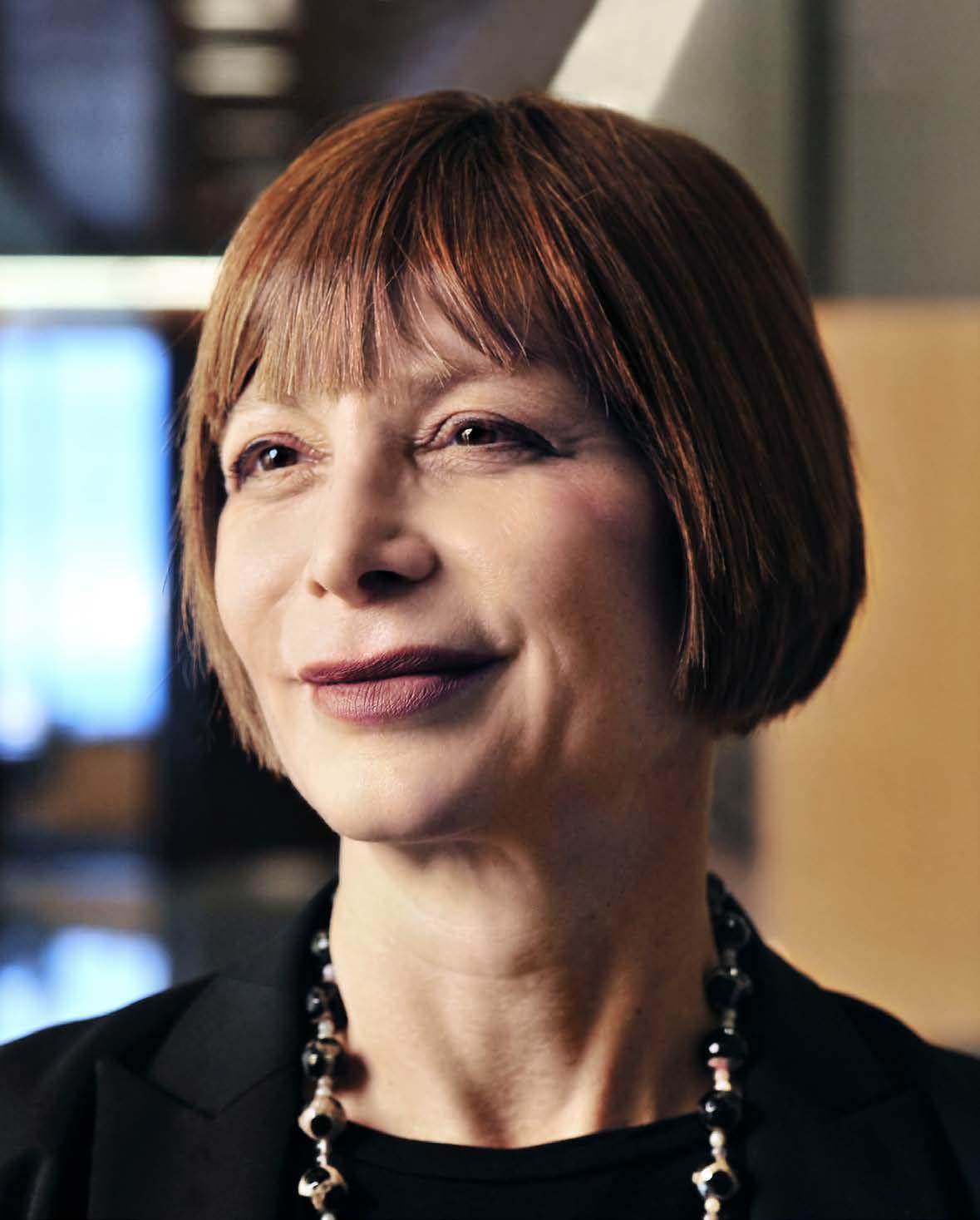
BY PAUL SNYDER
how she became COO and executive director of Jenner & Block, a Chicago-based law firm with more than five hundred lawyers in four US cities and London, and you might be surprised by the answer.
“I literally answered an ad in the newspaper,” she says.
True though that may be, it also oversimplifies a career and background steeped in a New York upbringing with a father who exposed his daughter to commercial real estate and the stock market early on. Although she says she loved these experiences, she concedes it didn’t occur to her to go to business school. Instead, she completed undergraduate work at Brown University and opted for law school at Harvard, Mendes says, “as a default.”
After graduation, she worked in a Boston law firm and then headed to Chicago. In Chicago, she worked for financial institutions doing deals and banking work, and then decided to pursue her MBA, accepting a position in investment banking at First Chicago Capital Markets, which would later become part of JP Morgan Chase.
“I became an investment banker and went to business school at the University of Chicago,” she recalls. “I started when I was pregnant with my first daughter and finished while I was preg-
nant with my second.” She then acquired her CPA license based on the advice of a banking client who mentioned it would be helpful for corporate advancement.
While working days and completing her schoolwork on nights and weekends, a client told her that the company he worked for, Medline Industries, was looking for a CFO and recommended she apply. She was hired, and after a few years working there and also serving on the board of directors she took a job at a pre-IPO computer value-added reseller.
One year into it, and two intense SAP/ERP system implementations later, a recruiter sought her out for the global CFO position at public relations giant Edelman. At Edelman, she was confronted with the task of reviving the company after a failed PeopleSoft conversion. She stabilized the company, retired $21 million of debt in her first year, and successfully reimplemented PeopleSoft. While at Edelman, she also implemented numerous other financial- and business-intelligence tools to help manage the business, and completed ten acquisitions on four continents. After six years, she was told she needed to move to New York.
With three daughters still in school, Mendes says it wasn’t an option to uproot the family or rejoin what she calls “the New York grind.” So she opened up the newspaper and saw that Jenner & Block was hiring. Armed with legal and business training, Mendes landed the role and immediately proved to be a versatile asset for the firm. Upon arrival, she opened the firm’s New York City office, subsequently orchestrated moves into newly constructed buildings for the Washington, DC, office and Chicago headquarters, and later opened new offices in Los Angeles and London. She has implemented systems, matter-management tools, and created process improvements while also leading the firm’s team, introducing many of the innovations impacting the legal industry. “I manage finance, accounting, tax, real estate, HR, IT, and project management, among other areas,” she says. “And at this point, I have a deep knowledge of managing the business of professional service organizations and the trends impacting them. I also have a long history of involvement with commercial office space and retail real estate. I think my financial and operations experience in all these fields law, investment banking, commercial real estate, manufacturing and professional services helps me
approach things differently and solve problems in an agile, interdisciplinary way.”
“Lawyers can sometimes allow their concern with legal risks to hamper their business judgment. As a lawyer who was an investment banker, CFO, and now COO, I understand the regulatory and legal concerns, and I weigh those risks in light of the overriding business and financial goals,” Mendes says.
That versatility also extends to her experience serving on various boards. Mendes is a member of Inland Residential Properties Trust, a multifamily properties REIT; Kronos Worldwide, a titanium dioxide manufacturer; and NL Industries, a holding company for Kronos and CompX International, a manufacturer of specialty locks and marine components. She is also a trustee of the Chicago Academy of Sciences and its Peggy Notebaert Nature Museum, a member of the University of Chicago Women’s Board, a National Association of Corporate Directors Board Leadership Fellow, and was recently invited to the Latino Corporate Directors Association, which has a mission to move the needle on Hispanic representation on various boards.
“One of the lessons I’ve learned is to get involved in outside organizations,” she says of taking part in LCDA. “It’s so important that I get out of the office, meet other businesspeople, try to help others, and serve as a mentor. I want to help others navigate what it took me a while to figure out.”
In establishing a career that was built not necessarily by design, Mendes says she’s learned these important lessons along the way that she wants to pass on to her daughters and other young women coming up in business.
“I’m a total workaholic,” she says. “I wish I’d spent less time working in the office after hours and tried early in my career to get involved in different organizations to meet more people and learn what I could do to help others. There are opportunities I could have had, but I was always so busy working.” Still, the lessons learned in the workplace have helped foster a greater drive to help others. Although she notes a difference
in the way she manages her workload at Jenner & Block and the service she can provide to any board on which she serves, the same versatility that helps her in business also proves to be a strength in the boardroom.
“There are huge exceptions, but I find that in their careers, people generally put themselves ahead of others,” Mendes says. “I try not to take it personally, but people are understandably interested in their own goals and advancement, and that’s something very different from board work. I love board work because I get to meet experts in other industries and collaborate, and ultimately, board members have a common fiduciary goal of maximizing shareholder value.”
Nevertheless, Mendes says her own path to board membership hasn’t always been easy. Working at a law firm often makes others automatically think she’s a practicing lawyer, as opposed to the COO whose business and strategic acumen help run the business. Disavowing people of the notion that she would serve on a board in a legal capacity is something Mendes says she often has to do.
“Yes, my legal background informs my perspective, but it’s my strong financial and business acumen as well as a wealth of experience in multiple industries that are most valuable to a board. I’m there to provide financial, real estate, IT, and other operational oversight and strategic advice,” she says.
Even though she’s opened herself to the outside experiences she laments missing when younger, Mendes is still a self-confessed workaholic. Fortunately, it’s to the benefit of both Jenner & Block and any board on which she serves.
“In the office, I try to exceed customer expectations,” she says. “I turn things around as fast as possible and deliver more than people ask for. When I do my board work, I really study. I connect with management and try to use my experiences to raise questions people might not have considered and help with oversight. I’m always trying to learn as much as I can. In that way, my professional work and board involvement are similar.
“As a member of management, you’re trying to get people to row together, prioritize the same goals, develop people and execute under pressure,” she says. “As a board member, execution is not my role company management has to worry about that. At the board level, there’s a lot of interplay with some really smart financial and business people from different industries coming together for a strategic purpose. At the heart of board work, it’s all about understanding the multiple stakeholders, collaboration, and coming up with the right strategy to maximize value.”
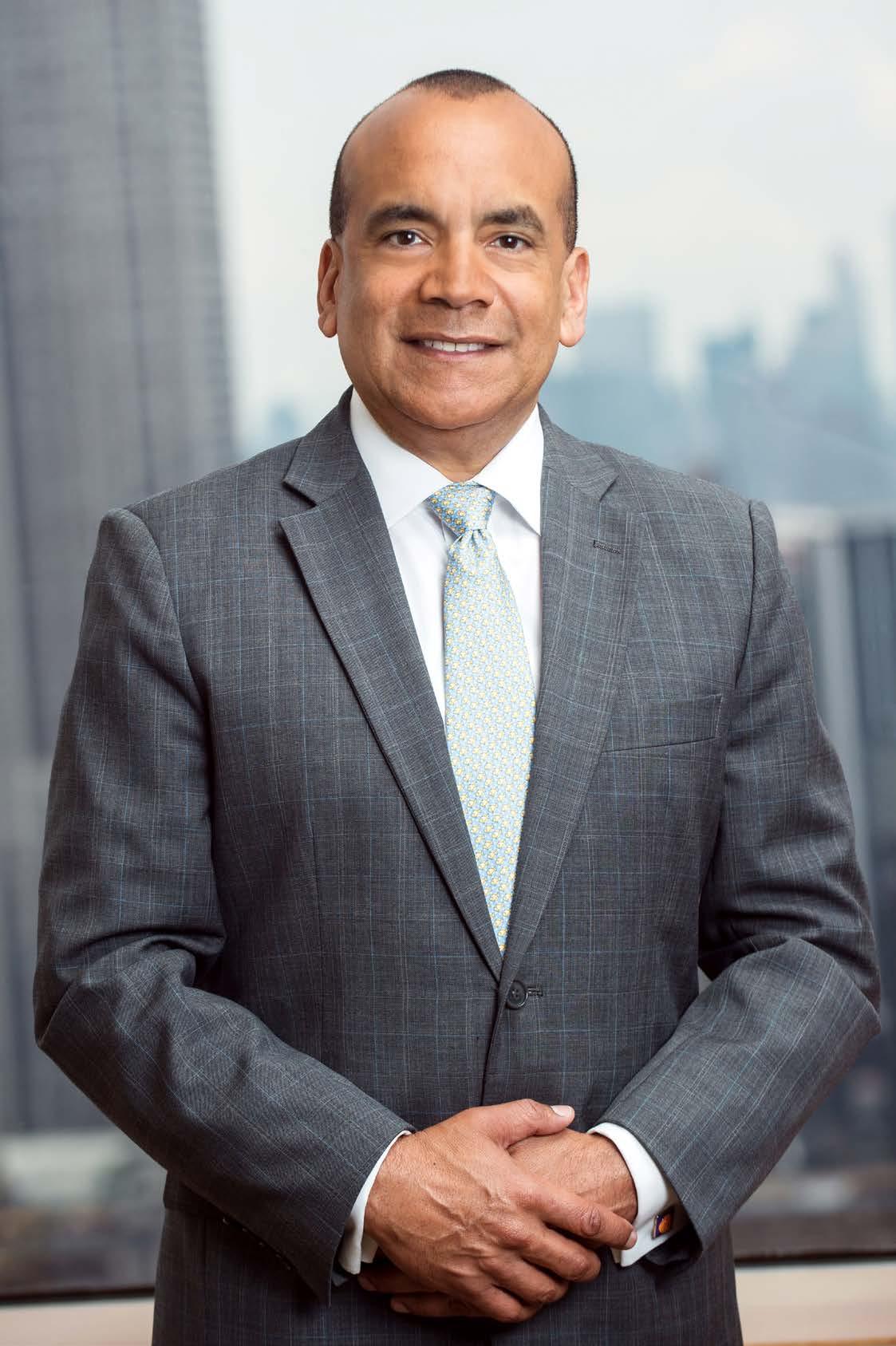
As president and CEO of Mercer, Julio is a global consulting leader in talent, health, retirement, and investment. He has also served in a number of senior positions at Chartis/AIG and as former president of American International Underwriters (AIU) Worldwide Accident & Health Division.
A thought leader and speaker on the changing workforce, Julio has been a leading contributor to the dialogue on the future of work, human capital, global economic trends, healthcare, financial wellness, pension systems, and diversity.
- PATRICIA SALAS PINEDA, GUEST EDITOR
BY ANTHONY RUTH
He should know. As president and CEO of Mercer, the global consulting firm (and wholly owned subsidiary of Marsh & McLennan Companies), and board director for the IT services company DXC Technology, he has led the conversation around the future of work and financial security at numerous events, including the World Economic Forum. He has taken his commitment to public service literally to the streets, taking part in Covenant House’s—a homeless youth nonprofit—annual “night on the streets” fundraiser and sitting on its board. And he has contributed to the future of higher education as a trustee of Hofstra University, where he holds an honorary doctorate.
Portalatin sees these successes as the culmination of motivation, perseverance, and good intentions. “Whenever an opportunity came along, I focused on doing the best job and learning everything I could from the experience,” he says, “and ultimately I had one goal: to make a difference.”
The opportunity to join DXC came from networking. DXC formed out of a fusion of CSC and the Enterprise Services division of Hewlett Packard Enterprise. HP’s then-CEO Meg Whitman asked Portalatin if he would agree to be considered for a seat on the new board.
“I had to really think about the offer, because I’m already running a company,” he recalls. “It takes time to be an effective board member.” He discussed the opportunity with Marsh & McLennan Companies’ board, who liked the prospect of exposing Portalatin and Mercer to additional cutting-edge viewpoints on automation, artificial intelligence, and other innovations shaping the future of business. “One of the great benefits of being on a board that is so future-focused is you get perspectives from several individuals, and can then assess how they might apply to the way you are bringing your own company forward,” he says.
“Every single company today is on a change journey. If a company tells you they’re not, it’s not likely that they’re going to survive the fourth Industrial Revolution.”
This role has also given Portalatin insight into the difference between a CEO and a board director. “As CEO, your job, simply—although not simple to actually perform—is to run the company,” he says, which generally includes achieving high levels of financial performance, employee engagement, and client acquisition and retention, as well as serving the community. “As a board member, you have to park some of that,” he explains. “One of the most important jobs a director does is ask good questions, because questions allow a CEO or executive team to escape groupthink and broaden their views about potential solutions and opportunities.”
Portalatin says the CEO and board member roles can complement one another. Learning to change hats and take on a more advisory role at DXC, for example, has impacted his role as president and CEO of Mercer. “You come back to the home office and you’re a little more attuned, you’re listening a bit better, you’re even more open to being challenged and to the possibilities of what can be done,” he says.
Much of Portalatin’s work at DXC has involved understanding the company’s current market position and how the board can help bring it along its change journey. They’ve already iden-
tified and executed a handful of acquisitions focused on future growth. Additionally, Mercer’s work on executive compensation, workforce analytics, and digital HR solutions has made Portalatin a natural fit for DXC’s compensation committee, a highprofile role due to the “say on pay” vote by shareholders on the executive compensation program. “How you score on pay matters a great deal in terms of brand reputation and shareholder support,” Portalatin says.
Even today, at what many would consider the top of any career, Portalatin continues to believe— and demonstrate—that a deep sense of purpose in his daily work will lead to a broader, more meaningful impact. “At Mercer, we’re a purposeful organization—we make a difference in people’s
"ONE OF THE MOST IMPORTANT JOBS A DIRECTOR DOES IS ASK GOOD QUESTIONS, BECAUSE QUESTIONS ALLOW A CEO OR EXECUTIVE TEAM TO ESCAPE GROUPTHINK AND BROADEN THEIR VIEWS ABOUT POTENTIAL SOLUTIONS AND OPPORTUNITIES."
lives” by providing solutions around wealth, health, and careers, he explains, pointing out that almost everything that happens in the world relates to one or more of those areas. “We help organizations think through how best to solve these very important issues for their employees.”
On an individual level, Portalatin has enjoyed giving career advice to current and aspiring board directors he’s met through the Latino Corporate Directors Association. “I’m never too busy to offer advice on how individuals, whether Latino or otherwise, can best position themselves for achieving their goals, whether that’s sitting in the C-suite one day and running a company, or sitting on a board,” he says. While he recognizes that Latinos are woefully underrepresented on publicly traded US company boards, here, too, he remains committed to his philosophy.
“I see barriers as only one thing—something to overcome,” he says. “Everyone will meet their share of obstacles, some more than others. Work smarter, continue to learn, and you can overcome anything.”
FRANCISCO S Á NCHEZ
Focus on developing great skills and experience in your chosen career. People are brought into boardrooms to add value, and generally that comes from a successful track record and expertise in your own business. I've seen a lot of corporate boards primarily consisting of CEOs and CFOs. Increasingly, however, boards are looking to diversify not just ethnically and by gender, but also by experience. It's important to bring something to the board from which the company can gain value.
ANTONIO GARZA
My wife's youngest recently graduated from college and I gave him a copy of Yuval Noah Harari's 21 Lessons for the 21 st Century. In one of the essays Harari spoke to what a young person needed to succeed in a world where the only constants were change and uncertainty. He wrote that the ability to think critically, communicate effectively, collaborate constructively, and be both resilient and creative were all essential to success. In my mind, that's also the essence of what it takes today to be an effective leader and corporate director.
Serve on nonprofit boards. Every nonprofit board has finance, compensation, planning, or audit committees. That experience will position you for corporate board consideration.
When you're on a board, take an organization-wide perspective, not an operational perspective. Think strategically, understand the external environment, hold the CEO and executive leadership accountable. Your job is to advise, to coach, to sponsor, to ask the tough questions. It's not to run the company.
DEBRA SANDLER
Know what value you can bring to a board. I was hired onto boards primarily because of my marketing experience. Know what it is you have to offer and hone your skills in that area to make you stand out as someone who can add value.
Start to prepare yourself for board work. When the companies I worked for would not allow me to sit on a public board, I sat on noncorporate boards. I am a trustee at my undergraduate college and a board member at a number of smaller nonprofits. You start to understand how boards work, and you make excellent contacts. Also, take the initiative to attend meetings and conferences offered for prospective board members.
Build up your network. The Latino Corporate Directors Association now has an associate membership for Latinos looking to join boards, and the National Association of Corporate Directors has conferences and events to look into, as well. Start going to those; it will help you build up your network of people who will help you once you re ready to get started. And when you are ready, tell everyone. Tell every recruiter, even if they re calling you for something else. Tell every friend.
You have to do your homework, and you have to be prepared. But you also have to be selfless and thinking about what you can do that will make a broader impact and help other people.
Today, being a lawyer and being "diverse" isn't necessarily enough to get invited to a board. Companies want you to bring something to the board that is helpful for their business. For example, I am invited to boards because I helped build a multibilliondollar business and operated as its CEO, not because I am a lawyer.
Once you do make it to a board, make sure you learn everything you can about the company and its industry. You have the opportunity to be noticed, so you better have done your homework. Prepare and contribute to the conversation in a positive and thoughtful way. I say it's like going to visit somebody's house: You're welcome there and you can sit in the living room. But if you start telling your host how to reorganize the furniture in the living room, the person is not going to be very happy with you. There's been a lot of progress in the diversity effort and changing perspectives, but we still have a long way to go until we can be part of the real discussion that reorganizes the furniture in the living room.
BY KATHY KANTORSKI, WITH CONTRIBUTIONS FROM DAN SICILIANO
There is a significant distinction between the work of an executive and the work of a board member. According to Dan Siciliano, LCDA member and faculty member for LCDEF’s BoardReady Institute (BRI), to succeed in the executive space, you need to get things done. But in a board setting, you don’t do anything. Instead, you ask the right questions.
“Be what we like to refer to as a ‘cooperative skeptic,’” Siciliano says. “Boards need to help encourage management to get things done, and they need to be supportive but, at the same time, they’re the last defense against errors and assumptions.”
This explanation may sound simple enough, but it is a barrier to entry for many executives interested in board service. To dive deeper, the following is a high-level look at the qualifications, training, and strategies for becoming board ready.
¥ Experience in a senior executive role with P&L responsibility and board interaction. The actual title you have depends upon the size of the company, so think of it this way: your P&L responsibility has to be a significant portion of the company's entire P&L. This indicates your amount of responsibility with the company, and you likely had a substantial amount of interaction with its board.
¥ Human interactive dynamics. This is the hard one, Siciliano says, because boards actually ask for prior board experience. "It's an argument I often make to boards that are starting searches and say, 'Well, we really can't risk having someone who doesn't understand how to work on a board.' At which point I say, 'You just cut out 70 percent of the most eligible board members.'" The "human interactive dynamics," as Siciliano calls them, are what boards are really looking for from the prior board experience requirement. These include two things: the temperament to engage in cooperative skepticism without being tempted to do rather than guide, and the ability to operate inside a difficult environment where you might disagree with people, but you have to get along with them.
¥ Proven success at exercising sound judgment in business decisions. In other words, knowing what to let go and what not to.
ALTERNATIVES THAT WORK
¥ You haven't had significant P&L responsibility, but you have been an individual contributor, spearheading projects and frequently appearing in front of boards.
¥ You're an entrepreneur or CEO of a smaller enterprise, and you had to manage your own board, but it was a different kind of board.
¥ You've been in government service at a very high level.
¥ You're on the board of a very large or prominent national or international nonprofit.
¥ You've worked as a big audit partner, such as at EY or KPMG; this is invaluable for audit committees.
You attended the LCDA’s annual convening last fall as part of the BRI program. How was that experience?
One of the most impactful things about it for me was how personal the setting was; it gave participants the opportunity to interact with each other and with the lecturers conducting the seminars. I attended with the understanding that it would be a board governance educational program, but I did not expect the level of support, motivation, and respect that I experienced while I was there.
I found it quite meaningful that everyone in the room was there to lift each other up; we heard from corporate leaders like Oscar Munoz who committed their time to provide insight, inspiration, and guidance for those of us recruited to the LCDEF BoardReady Institute. It was extremely empowering to know that Latinos who are already boardroom leaders prioritize their own time to serve as role models for those of us invited to participate in the program.
As a BRI participant, your interest in corporate board service is a given. Can you describe how that came about?
I have been honored to serve as a leader in various nonprofit board positions, and the next step of my journey as a BRI participant is serving in the corporate boardroom. It’s also a place where I can utilize my business experience. As an AT&T executive, I have a broad base of experience leading teams and creating and executing corporate strategies and deploying technology. Also, as the chair of the Xavier University board, I have guided that institution through a transition period since the retirement of a longtime president. In addition, I have played a role on the governor’s transition team during a time of significant budget issues for the state of Louisiana. The strength of my experience lies in leading organizations through transformational change and constant evolution, with integrity.
How do you choose which boards to be a part of?
Much of what I have done has been influenced by our efforts at

SONIA PEREZ
PRESIDENT, SOUTHEAST STATES AT&T
AT&T to retrain our workforce as we work to develop the skills needed in the growing digital environment. By the year 2020, we’ll see a need across the globe for 40-45 million people skilled in medium- to high-tech jobs, and the ability to create an impact through re-skilling and education is meaningful personally and professionally.
We hire thirty thousand people a year and understand that education and workforce development are key to the success of every business operating in this country. Educators—with the support of business community and community leaders—are developing the skills and creating the leaders that corporations want to hire. I seek to engage with organizations who are leveraging technology and social innovation, while understanding that we must provide opportunities to constantly re-skill our own people. The organizations I am a part of have that understanding, and they are committed to supporting education and cultivating a desire for lifelong learning.
What leadership style have you developed that you believe will serve you well in a corporate board setting? Leading through transformational change and constant evolution has given me an understanding that organizations—no matter the size, no matter the area of business—must continually evolve to thrive. And—without question—leadership must share that mindset. I have a saying that my team repeats back to me: “When we do the right things, the right things happen.” And another: “Go the extra mile, it’s never crowded.” That drives my mindset in everything I do. To succeed in business and in life, one must drive forward with integrity.
Siciliano has taught Stanford advancededucation students and LCDEF BRI participants, and when meeting the latter, his consistent reaction has been, "How are they not already on boards?" Their impressive careers often make these Latino executives more than qualified; however, they don't always perceive themselves that way.
"The Latino culture allows for a conservative view of one's own qualifications," he explains, noting that the BRI program works to dispatch these ideas and instead focus on preparing and positioning them for board director roles.
There's a whole science and curriculum around decision-making in difficult environments.
"The modern director should not be happy with themselves unless they arrive, in their mind, competent in these foundational building blocks," Siciliano says. They include:
¥ Corporate governance and fiduciary duties.
¥ Accounting. At a board level, this means being able to make your way through all of the materials you're given which you need to sign off on.
¥ Finance and risk. "There are a lot of risk and strategy decisions that the board is a part of," says Siciliano.
"One of the areas I teach is decision-making in uncertain environments, persuasion, and decision-making errors," Siciliano says. "When really smart people work in high-pressure environments, there's a pattern in the type of mistakes made, as studies have shown. This is actually good news."
The curriculum teaches that there is a process by which people consume information and make decisions in difficult environments, be it overloaded with information or very dynamic. Understanding this process empowers board members and board-ready candidates to do this well, which proves to be an asset for any board.
You’ve had an impressive career in both public service and in the private sector. How do you think this informs your leadership abilities in a board setting?
Throughout my career, I have been exposed to so much that it simply allows me to be in a position to oversee, advise, and raise red flags to help any corporation in achieving its goals. I can do that as a result of the experience I’ve had.
What sparked your interest in board service?
If you’re asking why I’m doing it now, it’s because I feel ready. Ten years ago, I probably wouldn’t have felt this way, but now I have been exposed to so many fields and situations in both the corporate world and the public sector that I know I can bring value to a corporate entity at any level. Impacting change on a large scale has been the story of my life. I’ve always looked for challenges, and board service would be the right challenge for me now.
It’s a different stage of my life now. I think it’s the right time to go into board service. Also, impacting change on a larger scale has been the story of my life. I’ve always looked for challenges, and this would be one of them.
In terms of choosing a corporate entity on whose board you’d like to serve, what criteria would you use?
Interesting. My background has been pretty diverse in terms of the scope of the companies and sectors I’ve dealt with as a practicing lawyer, a state attorney general, and a member of Congress. Areas of particular interest to me these days include the healthcare, energy, real estate, and environmental sectors of the US economy. I am a former member of the Judiciary and Natural Resources Committees of the US House of Representatives— eight years there—and, at one point in my career, I sat on the
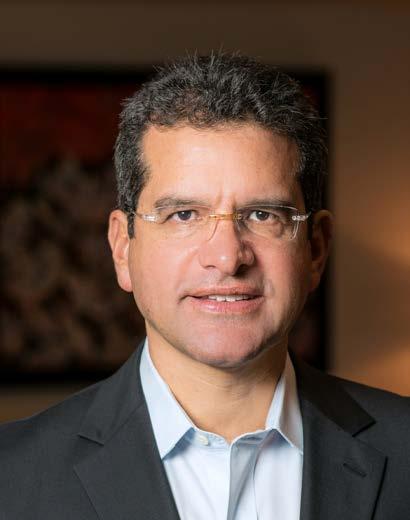
PEDRO PIERLUISI FORMER RESIDENT COMMISSIONER FOR PUERTO RICO
MEMBER, O'NEILL & BORGES LLC
board of the Puerto Rico Home Builders Association, so I have a good grasp of those fields. Also, given my government experience, I could add value to corporate entities that are heavily regulated or do substantial business with government instrumentalities at the federal or state level.
What were your biggest takeaways from the BRI program at the LCDA’s annual convening?
First of all, there was very practical, pragmatic training. I was reminded time and again that the board director role is different; you’re not managing or counseling like I am used to, but rather overseeing. Your role is basically to make sure that the corporation, and its management, is fulfilling its mission. You have to do your best to enable management to do a better job.
I also really enjoyed the one-on-one coaching I got from one of the recruiters that participated in the program. He actually interviewed me and gave me the do’s and don’ts for my future interviews as a potential corporate board member.
The number of public companies listed on US stock exchanges has been on a steady decline since 1996, when the number peaked above 7,000. Today, that number is less than 3,800. "Increasing the diversity on boards is an uphill battle, because the number of overall board seats is not increasing in the aggregate, and the total tenure of board members is also increasing," Siciliano says.
The good news? "The number of private companies has gone up," he notes, "and that's a place where increasingly there's an appreciation of the independent director role."
Literally meaning a director who has not previously been employed by or provided a significant amount of work for the company, the independent director is a requirement for certain committees of public companies' boards (such as compensation and audit). But on the private side, the company has more room to decide who its directors are, and the trend has recently shown that large private companies believe the requirement of independent directorships is a good practice to follow.
What does this mean for board-ready candidates? Independent directorships open the options and opportunities, which gives candidates the freedom to choose their own path. Siciliano explains, "The debate is: should you prepare to be a director in your narrow field of expertise, and does that improve your chances? Or should you go and do something completely different, but you bring with you this set of skills?"
ANNE L. ALONZO
President & CEO
American Egg Board
RAUL A. ANAYA
President, Greater Los Angeles
Pacific Southwest Region Executive Global
Commercial Banking Bank of America Merrill Lynch
JOSE A. AVALOS
VP, Internet of Things Group & Global Director, Visual Retail and Digital Signage Intel Corporation
ANTHONY BARRUETA
SVP, Government Relations
Kaiser Foundation Health Plan, Inc.
Kaiser Permanente
VANESSA M. BENAVIDES
SVP, Chief Compliance and Privacy Officer
Kaiser Foundation Health Plan, Inc. and Hospitals
Kaiser Permanente
MAR
ê A-ELENA CARRI î N, CFA
Certified M&A Advisor
Founder & Managing Partner Multicultural Capital, LLC
PATRICIO DIAZ, CFA
Head of ISG Capital Markets Bank of America
ROMULO DIAZ, JR.
VP & General Counsel
PECO Energy Company
RICK GOMEZ
EVP & Chief Marketing Officer Target
CHRISTOPHER LALAN, ESQ.
SVP & Director of the Legal Division Popular Bank
ANTHONY L î PEZ
CEO
L&L Associates
SONIA P REZ
President, Southeast States AT&T
PEDRO PIERLUISI
Former Resident Commissioner for Puerto Rico Member O'Neill & Borges LLC
DR. MARIA RIVAS, MD, FACP, FACE
SVP, Global Medical Affairs EMD Serono
ANTHONY SALCIDO
VP & Corporate Controller
Toyota Motor Sales and Toyota Manufacturing, USA
YASMINE WINKLER
Executive Lead, Diversity and Inclusion UnitedHealthcare
"Doctors say you have to manage your own healthcare; well, you have to manage your own board-seat strategy, as well," Siciliano says.
Are you particularly adept at a certain field? Do you have a passion for a particular industry? Discover the voice and expertise that you will bring to the boardroom and identify the companies that need your voice. "Then go aggressively out of your way to seek out and meet the people who you think are on the boards you are wellsuited to," Siciliano recommends.
Attend events like those hosted by the LCDA and the National Association of Corporate Directors (NACD) to make strategic connections and build your social capital.
Pay attention to the world of board governance: follow proxy advisors Institutional Shareholder Services (ISS) and Glass Lewis & Co. to read the latest news. "I'll tell you, it's not the most exciting reading, but it is a huge deal for the world of corporate governance," Siciliano says. "Boards pay attention, it impacts them and so should you."
Become part of what Siciliano calls "an ecosystem of connections," such as the LCDA. "If you go through the BRI program and become an LCDA associate member well, gosh, you're in an ecosystem that is actively trying to connect." This membership takes your efforts of being in the right places and developing the right networks one step further. Because presenting yourself as a viable board candidate is more art than science, as Siciliano puts it, "There's a thin line between strategically presenting yourself and making connections and being the weird person who's stalking a board seat. It's a difficult balance, but most board seats are actually acquired through one degree of separation and/or direct reference/ recommendation."
THE BRI PROGRAM
"I'm really excited because we've turned this into a multiyear program that works on hard skills, soft skills, and self-improvement with equal weight. I don't, at this time, know of any other program that has a curriculum that has not only mock board meetings, but a mock committee meeting, and a telephonic committee meeting. I think in a very geeky way that this is a breakthrough. I think we are going to be able to prove and demonstrate that the BRI program is a near substitute for corporate board experience, removing boards' concerns about someone who hasn't had prior board service."
THE ROOKIE ADVANTAGE
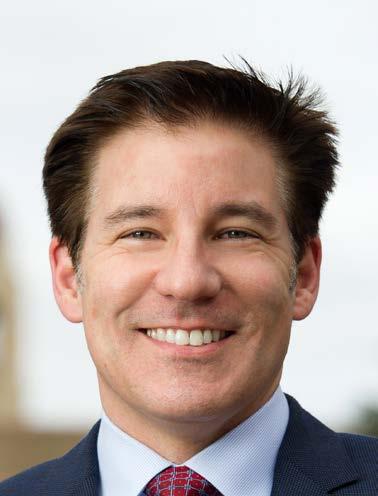
"Great board members are often the new board members, because they have room and permission to ask certain questions that others are embarrassed to ask. Ironically, new board members in high-functioning boards are a wonderful thing."
BUILDING SOCIAL CAPITAL
"Most board seats are acquired through one degree of separation or direct recommendation. It is this upfront, guerrilla warfare - make contacts, get people to know you, position yourself, and get recommended -that makes associations like the LCDA hugely powerful."
POSITIONING YOURSELF
"I was given good advice from Priya Cherian Huskins. She's an outstanding board member, and she said, 'Dan, no one wants an academic on their board, no matter how good they are. You need to lead with your business credentials.'" As soon as I did that, it actually made all the difference.
FLYING YOUR FLAG
"It's tricky for me because I don't want to be selected for a board because I'm Latino, but my name doesn't make it obvious that I'm Latino. So here is this weird, awkward moment in an interview where you know that they're trying to increase the diversity of the board. The good thing is my rsum includes my affiliations with the LCDA and LULAC, my Spanish language fluency, and my time spent in Latin America."
The philosophies of innovative leaders have the power to inspire and spark change. Read on for the thought-provoking insights of these successful executives.
106 Gabe Guerra, Pelican Products
111 Claudia Ibarra, Exagen Diagnostics
114 Miguel Gastellum, FTS International
120 Javier Rios, Wagner Spray Tech
BY TRICIA DESPRES
An impactful boss changed Gabe Guerra’s career and outlook on education, and he hopes he can do the same for his employees at manufacturing firm Pelican Products
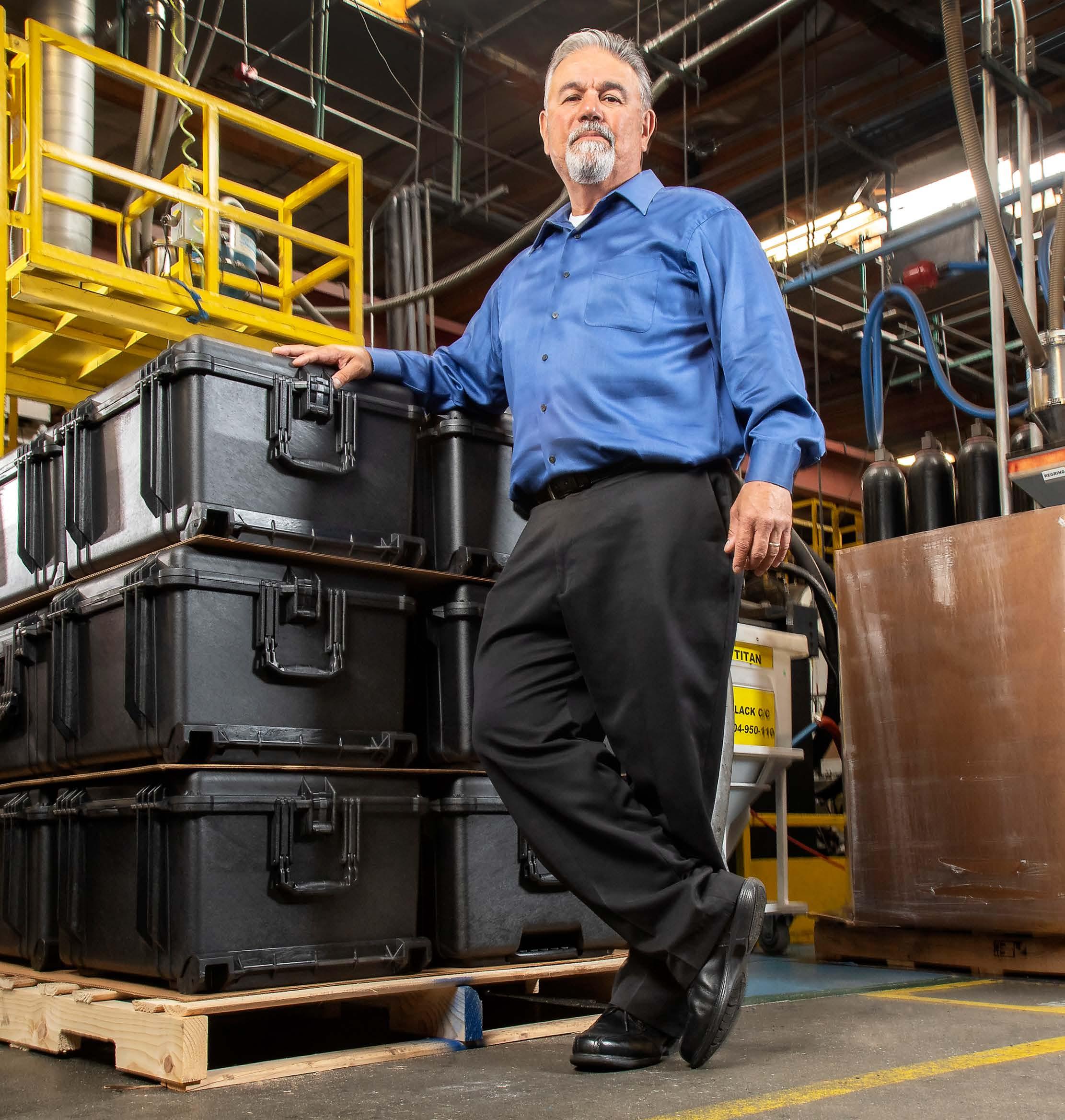
THERE ARE THOSE WHO LIVE BY A MOTTO— something they use to inspire action or inform decisions. For Gabe Guerra, that phrase has always been: “positive influence.”
“I chose a personal license plate reading ‘+NFLUNC,’” says Guerra, the director of manufacturing operations for plastic manufacturer Pelican Products. “I have spent my entire life trying to impact people’s lives both professionally and personally.”
Guerra believes in the concept of influence because he, himself, was impacted by another’s influence.
As a youngster, Guerra was a skilled athlete who excelled in baseball, but didn’t earn good grades. “As a student, I never applied myself unless I was in P.E.,” he says, laughing. “I honestly feel like the bar was set too low for me. I didn’t think I was smart enough to be an engineer. As a Latino, there is a tendency to get very comfortable in the status quo.”
When it came time to think about college, Guerra was torn, especially after seeing the typical struggles of a hard-working father trying to provide for his family. He decided it was best for him to work and provide financial assistance for his family rather than continue on the path of education. “I think that is a mistake, and it’s a mistake I wouldn’t make with my own children,” he says.
After one semester in college, Guerra returned home to work odd jobs in everything from refrigeration to mechanics. At twenty-one years old, he began to work as an injection molding operator, moving up the
“I always try to tell Hispanic employees my story and explain that you can have an ambitious path no matter what people are saying around you.”
ranks in a completely Hispanic workforce.
“They said I had potential,” he recalls.
When conversations would turn to furthering his education, Guerra admits that he would often try to put the idea off, thinking that the amount of time away from his then-growing family wasn’t enough to entice him. Yet, after nearly ten years of working full-time, a positive influence came into his life, inspiring his mission to do the same for others. The owner of the injection-molding business, Brad Rehrig, encouraged him to go back to school, and offered to pay for everything, including a full-time salary.
“That’s when my life changed for the better,” he recalls. “I felt like my life was in a freefall for a while until I landed back in school.”
From there, his professional life took off, landing him in a variety of engineering positions across the country, from Georgia to California. Today, he oversees three hundred employees at Pelican Products, a company that designs and creates technically advanced flashlights and high-impact watertight cases sold in the United States through specialty retailers, such as Grainger and REI.
By far, the most rewarding part of Guerra’s job is the chance to not only influence his employees but also to ensure that they know he is open to each and every one of their ideas.
“Many people talk about having an opendoor policy, but if you are not listening, you are not being fair to anyone in attendance,” he says. “When someone comes into my office, I push my keyboard away and take the mouse out of my hand and push my chair
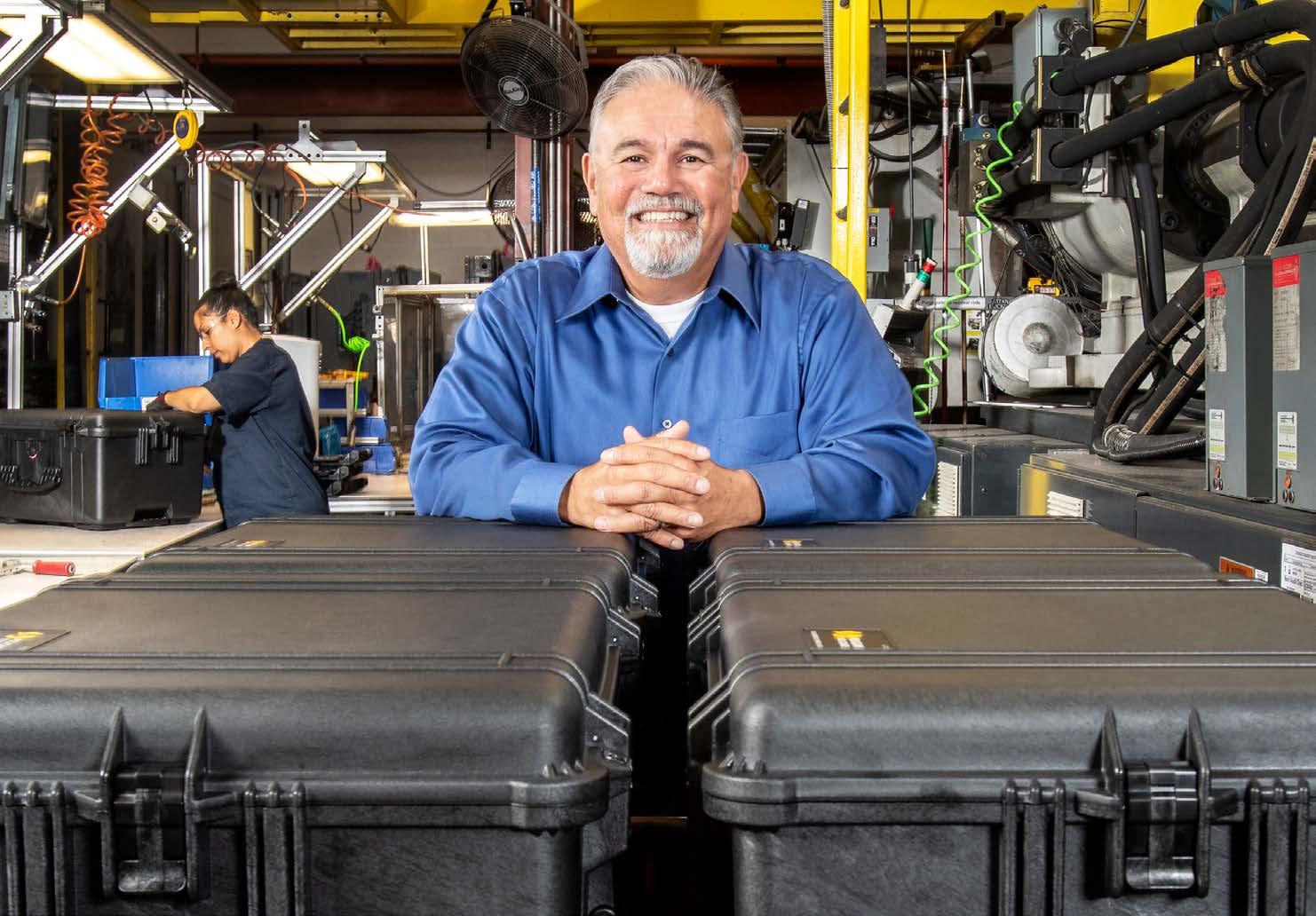
Gabe Guerra’s open-door policy means he pushes away from his computer and fully listens to staff when they want to talk. As California’s labor costs rise and automation permeates the industry, this tactic has proven impactful in retention and engagement.

There is another area of Gabe Guerra’s life that holds a special place in his heart and allows him to further spread his positive influence.
“My passion for softball is something I can’t really put into words,” says Guerra, who has coached highly skilled players in the youth travel-softball community for the past twentyfive years and has mentored, guided, and assisted more than 200 student athletes in securing athletic and academic scholarships.
“As much as I love my job, if Pelican Products didn’t pay me, I’m not sure I would come to work. But with softball, I don’t get paid a penny, yet I look forward to coaching every weekend. My payment comes in the form of gratification received from the impact I make on student athletes and their families who normally don’t have the knowledge nor the means to pursue a path of higher education.”
back. I’m then open to listen wholeheartedly and completely.”
He is also committed to telling his success story, especially to those in the Pelican Products workforce who show promise to move forward professionally.
“I always try to tell them my story and how you can have an ambitious path no matter what people are saying around you,” he says. “But I can’t make them do anything. You can lead a horse to water but you can’t make it drink. They have to take that first step. They have to take the initiative.”
Guerra’s influence has most recently been focused on professional challenges that lie ahead, including the rising costs of labor in California. As labor costs continue to soar, the manufacturing industry must remain diligent in finding the most efficient methods to operate their businesses. One very logical step to consider is automation. Although automation costs are high, the benefits of an automated system typically far outweigh the cost.
As automation becomes more prevalent in the manufacturing industry, many view it as a threat—a means to cut personnel.
“If manufacturing businesses are to survive in this highly competitive market, I strongly believe automation is the answer,” Guerra says. “And if this statement is true, then it should follow that automation saves jobs by maintaining manufacturers’ competitive edge and securing business long-term rather than focusing on how automation cuts jobs.”
A strong position to take, it’s a position that Guerra stands behind, and is evidence of Guerra’s open, authentic leadership style, and the realistic-yet-positive approach he uses to inspire his team.
Regardless of what it brings, the future no longer scares Guerra. Instead, he looks to the future as yet another opportunity to influence the generations of Hispanic executives to come.
Claudia Ibarra’s immigration caused adversity in her career; she now uses her experience to help others succeed in her SVP role with Exagen Diagnostics
BY SARAH BREEDEN
AS A CHILD, CLAUDIA IBARRA LOVED science. She was fascinated by the way cells reproduced and the way tissues grew. Her interest in epidemiology crystallized in the fifth grade, when she learned about a particular infectious disease endemic in northern region of her native country, Argentina. Chagas is spread through insect bites, causing pain and swelling around the eye. “How could an insect do this?” Ibarra remembers thinking. She decided then that she wanted to study science and help cure disease.
That’s exactly what she’s doing now as the senior vice president of laboratory operations with Exagen Diagnostics, where she oversees a team of twenty-seven employees. Exagen specializes in creating medical tests that diagnose and monitor a range of autoimmune diseases. Most recently, Ibarra helped with the validation of a newly developed test
that can identify lupus patients who may be at risk of a thrombotic event.
Although laboratory work requires attention to detail and scientific understanding and training, it also requires highly developed interpersonal skills. This is why fostering a culture of helpfulness is so important to Ibarra. It can make a huge difference in product quality and overall team morale. To build the kind of team that she envisions, Ibarra personally interviews all job candidates, and hires those who demonstrate a sincere and caring attitude toward patients. Honesty is also a top priority; everyone makes mistakes, she says, and it’s important for employees to tell their supervisor when mistakes are made so they can be fixed promptly.
In order to create a positive and motivating work environment, Ibarra encourages her team to stay present and engaged during the
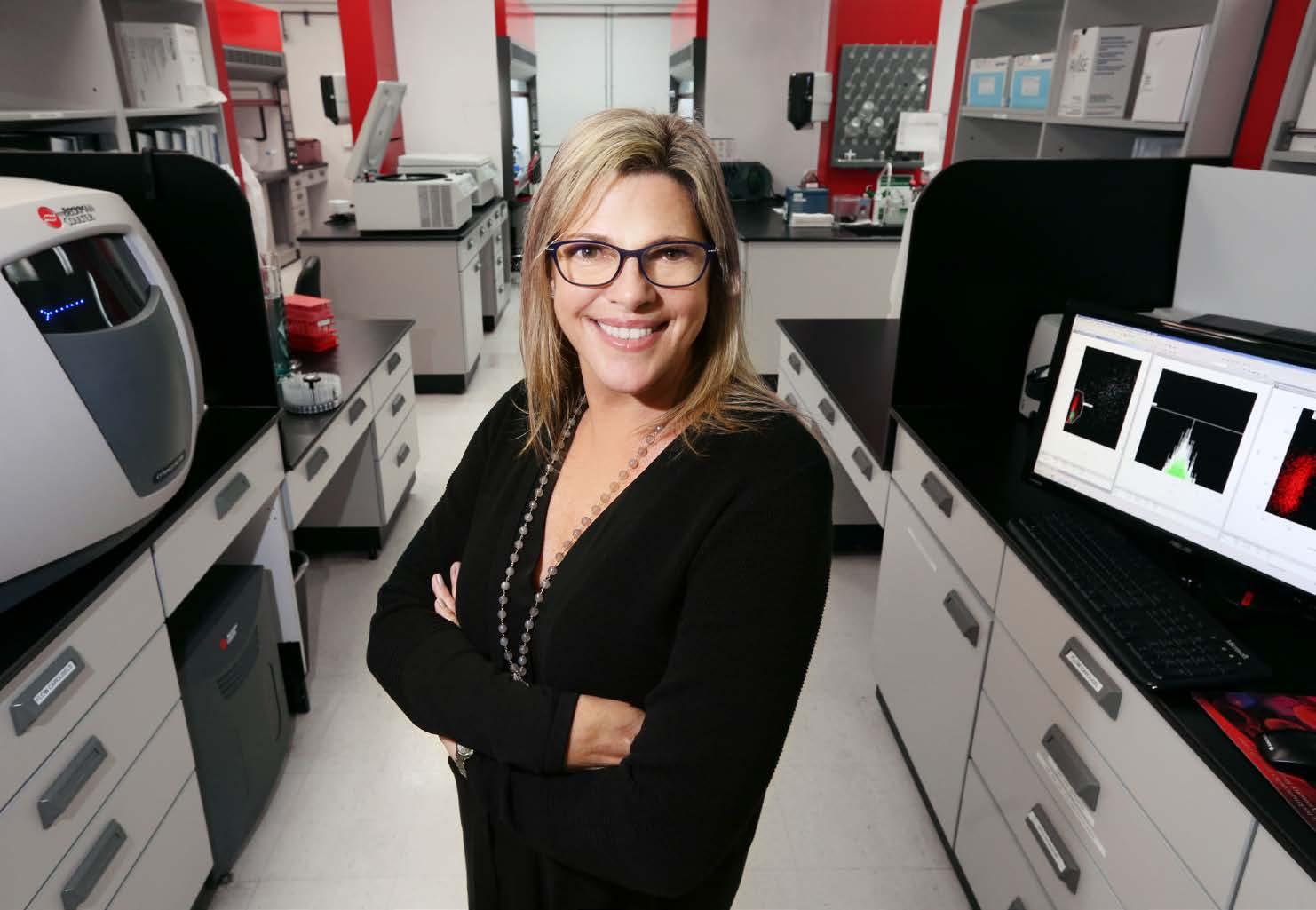
Claudia Ibarra SVP of Laboratory Operations Exagen Diagnostics
workday. “Everyone wants to go to a workplace where they feel appreciated,” Ibarra says, and she sometimes finds herself in the role of counseling team members to facilitate interpersonal interactions. She believes that when employees feel supported by both their managers and their peers, they do better work.
Ibarra does more than just support her team; she also mentors employees who want to advance their careers. After all, it wasn’t so long ago that she needed a mentor herself.
When Ibarra immigrated to the United States in 2000, she left behind a successful career as a laboratory scientist in Argentina.
Her husband had found an excellent job at a biotech firm in San Diego, and they felt confident that Ibarra would also continue her career. However, the process of obtaining a work visa was long and daunting. She was poised to start working in 2001, but 9/11 created a sudden backlog in immigration.
“I started to freak out,” she recalls. Worried that she was going to lose career traction, Ibarra took biotechnology classes at a local college and also went through the process of getting licensed to work in California’s clinical laboratories. Although she still wasn’t eligible for employment, an unpaid internship gave her the opportunity
to work in science and helped introduce her to other people in her field.
By the time Ibarra’s work visa was approved, she had lived in the United States for five years. The experience of putting her career on pause at times felt “stressful and depressing,” she says. She was relieved that she could finally continue her career but encountered more frustration when her first US job was in an entry-level role.
Though Ibarra had fifteen years of experience, she had to start her career from scratch. Determined to excel in her field, she quickly rose from technologist to manager to director in her lab.
During this time, Ibarra longed for guidance on how best to navigate her career. “I had to figure out the process by myself,” she says. “I felt like I was starting over all the time. It was difficult to show that my knowledge of laboratory science was better than my English.”
As her career has advanced, Ibarra no longer feels that she’s fighting against the grain. One of the things she enjoys most about working in a laboratory is that so many people have international backgrounds. “I’m very lucky to work with people in science who understand other cultures and are used to people from other cultures,” she says.
Ibarra also uses her senior position as a vantage point to support others. She enjoys discovering people’s interests, so she can identify opportunities for them to advance in their careers. For example, Ibarra advised an Exagen employee to pursue a master’s degree in order to advance into a management role within the company.
It gives her a good feeling, she says, to see others do well. “People have told me my career advice gives them a sort
“I felt like I was starting over all the time. It was difficult to show that my knowledge of laboratory science was better than my English.”
of hope, because through my own story, they can see what is possible for them.”
To arrive in her current position, Ibarra has weathered a long and painstaking immigration process, overcome workplaces biases, and restarted her career from the ground up. The adversity she endured paid off. “This is a country full of opportunities,” she says. “It’s your job to look for the right place, and to put all your passion and energy to get where you want to be.” She tells her team the same thing she tells her own children: “Never give up.”
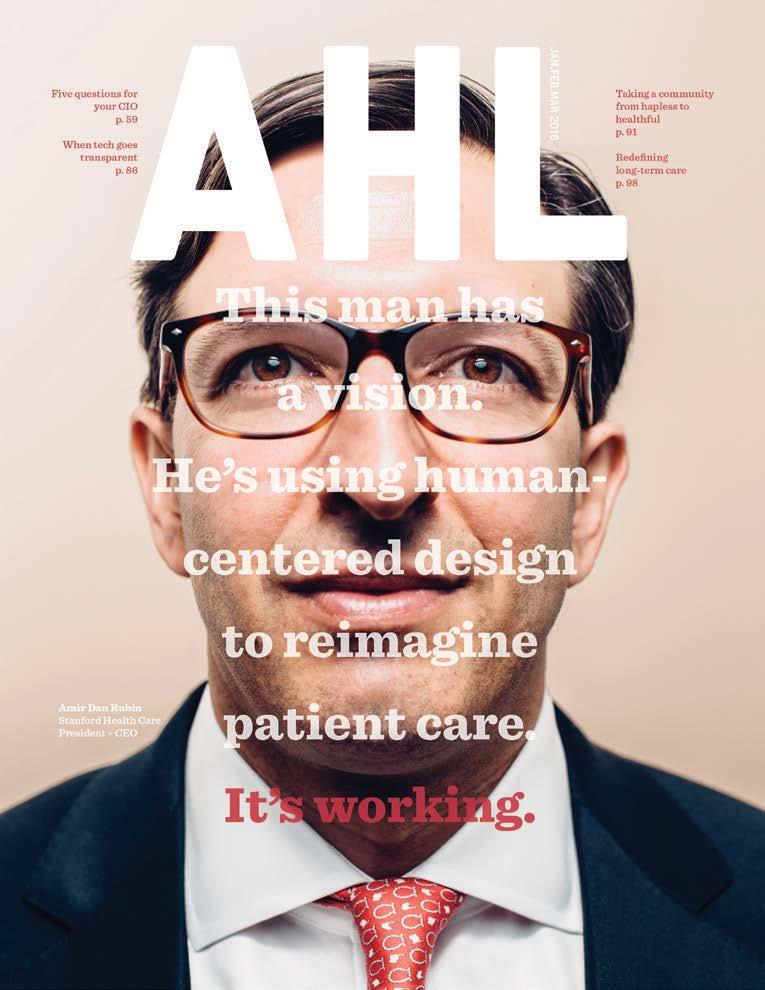

BY SARAH BREEDEN
How West Point, military service, and Wharton prepared Miguel Gastellum to lead at FTS International and in the Hispanic community

AS A YOUNG OFFICER IN THE ARMY, MIGUEL GASTELLUM OBSERVED that the most respected commanders were always those who led by example. “They were the kinds of leaders who were out in the elements with the troops when no one else wanted to be out there,” he says. Leaders like these—who voluntarily exemplified the standard they expected and weren’t afraid to get uncomfortable with their soldiers to accomplish a mission—quickly won the trust of the people they commanded. Gastellum learned that, in the military, the rank on a collar doesn’t earn respect; respect is earned by showing integrity in the example by which you lead.
This leadership philosophy has informed Gastellum’s ascent at FTS International, one of the largest oil and gas well-extraction companies in North America. He oversees the supply chain that provides all the materials for well sites in Texas, coordinating the supply of the maintenance parts that go into pumping. Gastellum is responsible for $1 billion in spending. Additionally, he’s remained even-keeled throughout the ups and downs of the oil and gas industry. Right now, the industry is in a “soft spot,” he says, but the stress of weathering an industry downturn is relatively mild compared to the demanding pressure he’s experienced as a West Point cadet and military officer.
Born and raised in Arizona, Gastellum was an ambitious student with parents who had always prioritized his education. His father was a teacher and his mother was a school administrative assistant. “I didn’t have the option to not go to college,” he says. His decision to join the military, on the other hand, came as something of a surprise to himself and his family. During high school, Miguel had the opportunity to meet West Point cadets who gave a presentation about the school. He was impressed by the way they carried themselves. The encounter also renewed Miguel’s interest in aviation. He was eventually nominated to attend West Point by Senator John McCain and Congressman Jim Kolbe.
In the fall after high school graduation, Miguel flew to West Point, New York, without having visited the campus. His first months at West Point were a shock. “They take away the most important thing to a cadet, which is your time.”
One of the purposes of a military education is to prepare cadets for the intense pressure they’ll experience in combat. All cadets go through six weeks of basic training before their first semester. Miguel found basic training to be physically and mentally grueling, but the schoolwork was even more challenging than basic training. A 4.0 GPA
student in high school, Miguel now struggled to stay awake during classes and to keep up with the regimented schedule. “They intentionally give cadets a heavy workload and not enough time to do it,” he says.
Eventually, Miguel found his footing. His first year at West Point taught him how to prioritize tasks: he started the hardest work first. He also found a stress outlet playing for the school’s baseball team. “It allowed me to have a place I could go to wind down. There was a team mentality, and it took away some of the stresses the institution puts on you,” Gastellum says. However, the stress of being a cadet would only intensify after he graduated.
Gastellum had entered West Point during peacetime; he had not expected to graduate into a wartime military. On September 11, 2001, Gastellum was starting his senior year. He and his classmates watched news coverage of the Twin Towers falling just forty-five miles away from their campus. They knew their country, and the lives of American soldiers, were going to change forever. “Everyone felt some sense of fear of our new uncertain future and angry at the same time,” he remembers. After graduation, Gastellum attended flight school and was later deployed to Iraq with the 4th Infantry Division of Fort Hood, Texas. He served two tours of duty, then volunteered to assess and was selected for the military’s elite special operations aviation task force, the 160th Special Operations Aviation Regiment (Airborne), otherwise referred to as the Night Stalkers.
While Gastellum excelled in the Army and Special Operations service, active military service put a strain on familial and personal relationships. He knew that he wanted to find a profession that offered more stability, so he enrolled in the Wharton School at the University of Pennsylvania, and loved it. “Wharton’s diversity was more than I expected,” he says. “Forty percent of students were international, and from all backgrounds, experiences, and political views—conservative, liberal, it didn’t matter. We call it the ‘Wharton Bubble.’ Everyone feels safe to share ideas.”
Although Wharton students come from diverse backgrounds, Gastellum was one of only three Mexican Americans in his class. “Other Mexican students were not Americans, and most international students came from wealthier backgrounds than we [Mexican Americans] did. We would talk about why there were so few of us,” he says. He suspects that perhaps it’s because Mexican-American families are so close, it can hard for parents to let go of their children, so they don’t
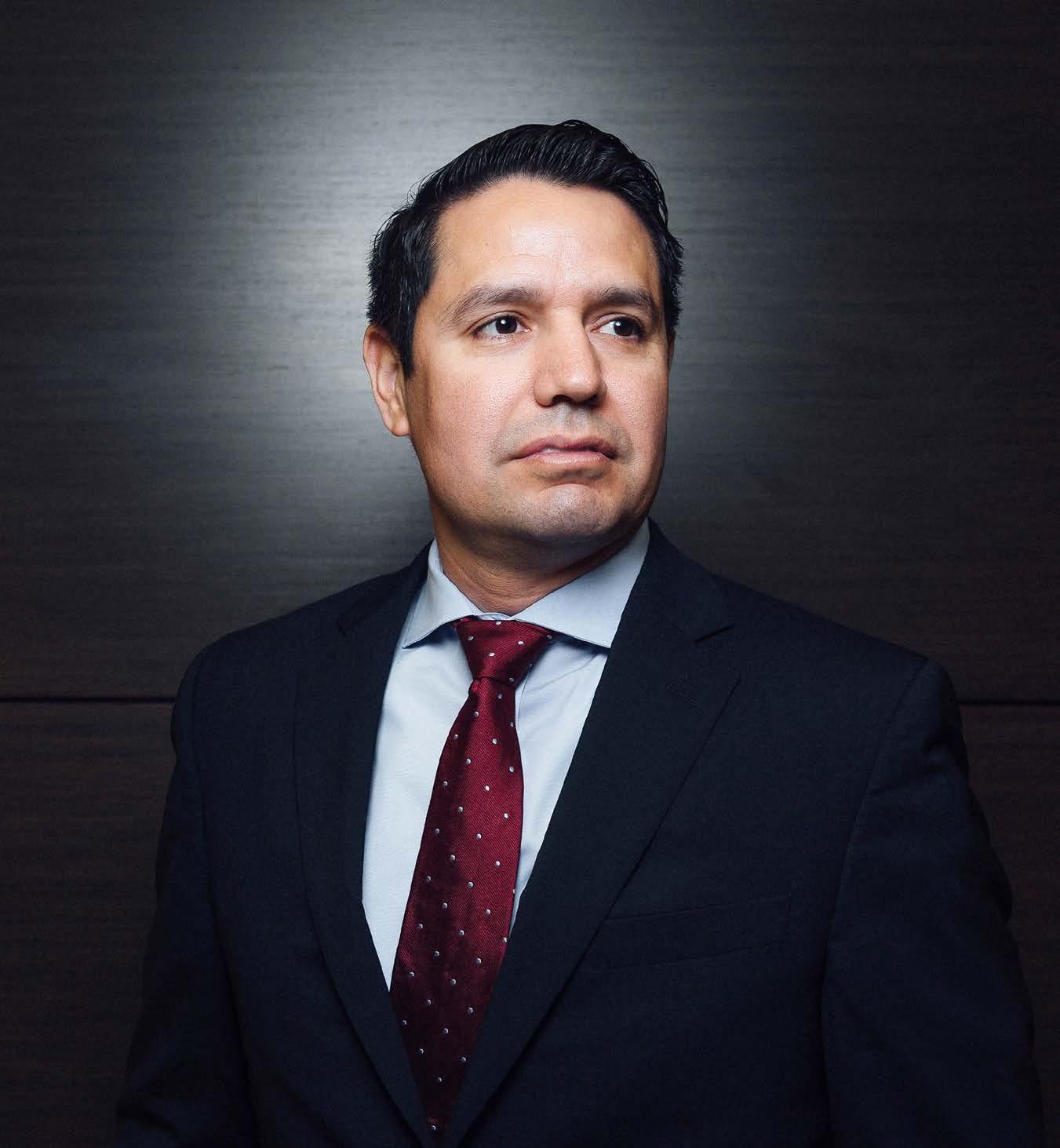





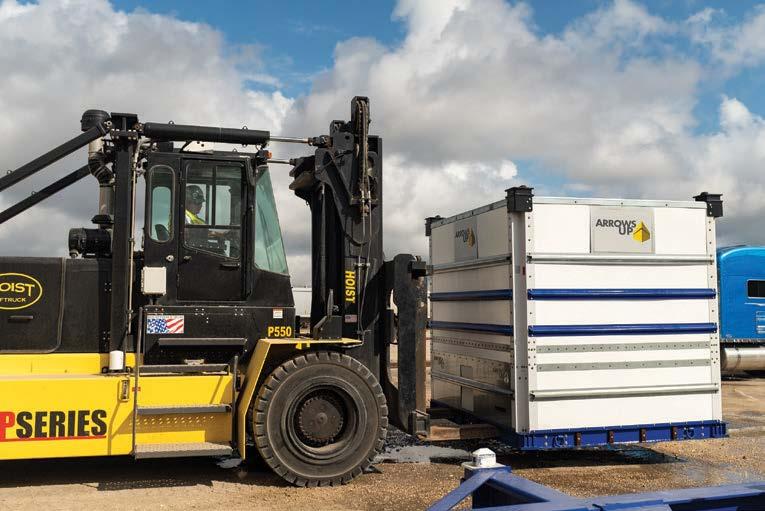
Arrows Up, an affiliate of OmniTRAX Energy Solutions, delivers scalable, cost-cutting mine-to-wellhead supply chain services. We offer customers in the most active oil and gas basins a patented containerized bin-to-blender gravity fed proppant delivery system that virtually eliminates silica dust.
www.arrowsupllc.com
“I want young Mexican-American individuals to desire to lead businesses because there are examples of success. We need more business mentors reaching these individuals.”
advocate leaving home for education. “We can go ahead and let our kids leave, and I’ll guarantee they’ll come back,” he laughs. “They’ve got to get some of that good food!” He also notes that some Mexican-American families do not realize higher education is a real option, even if you come from lesser means.
Gastellum says that he’s been the one of the few Mexican Americans in nearly everything he’s done. That experience has established his belief that it’s important for Hispanic leaders to help
shape the next generation. “We need to get in front of our youth and show them that people have out gone and done it,”
Gastellum says. He also observes there’s a serious lack of Hispanic representation in school curriculum. This exclusion can leave Mexican-American students feeling like outsiders and unaware of prominent Mexican Americans in our history. “We need to rewrite the history books to highlight these examples,” he says.
With the US Hispanic population continuing to climb, it’s beneficial for
companies to hire managers that share the same cultural and racial backgrounds as the people they’re leading. “Furthermore, I want young Mexican-American individuals to desire to lead businesses because there are examples of success,” he says. “We need more business mentors reaching these individuals.”
Gastellum wants businesses to know and want to place Hispanic leaders in charge and let them succeed—then, there will be a ripple effect, driving improved outcomes for the US economy.
There’s a value to acknowledging and identifying diverse ideas and backgrounds. “I’ve always had a different background and different perspective,” he says. “It’s a strength.”
With that in mind, Gastellum has recently become involved in projects that develop the talent of Hispanic children and youth, such as Leadership ISD, whose purpose is to create activists that promote public education in Texas. He’s also interested in seeking out other Hispanic leaders who can tell their stories to young people. “How do they end up being successful in the community?” he asks.
Having flourished in some of the country’s most competitive institutions and industries, Gastellum expresses his own approach to success with this baseball analogy: “You control your own destiny. If you don’t swing the bat, you’re going to miss every time.”


















FRAC-CHEM is an oilfield chemical manufacturer and wholesale chemical supplier specializing in hydraulic fracturing, stimulation, and coiled tubing chemistries.
Frac-Chem o ers a full line of liquid chemistries as well as a growing line of dry chemistries, customized field application equipment, and real-time monitoring capabilities. With facilities located across North America and a team committed to providing unrivaled customer service, we stand ready to meet and exceed customers’ needs and expectations– 24 hours a day, 7 days a week, 365 days a year.


Congratulations Miguel Gastellum for this well-deserved recognition of all your exceptional accomplishments. We look forward to many more years working with you.
Our CNC machining facility is simply state of the art. Our machine arsenal includes: live tooling lathes, 5-axis boring mills, vertical machining centers and horizontal machining centers. Our plant is so equipped that it is the largest machining company in all of Oklahoma.
After honing his abilities at large corporations, Javier Rios brings a proverbial shot-in-the-arm to the quality culture at Wagner Spray Tech
BY KELLI LAWRENCE
A LITTLE MORE THAN SIXTEEN HUNDRED miles separates Chihuahua, Mexico, and Minneapolis, Minnesota. The former is the birthplace of Javier Rios; the latter is where he’s made a home since 2005 for himself, his wife, and their two sons. The distance between the two cities is great both in literal and figurative terms (both distance in miles and in culture and size), and for Rios—now serving as senior quality director for Wagner Spray Tech—the road between the two has given him a serendipitous journey.
As a boy, Rios also lived in the Mexican city of Monterrey when his family relocated there for a few years to further his father’s medical studies. This stop in his journey proved most influential in his development. “Monterrey, compared to Chihuahua, is a metropolis,” Rios says. “It created something different in me. It made me think of life in very different ways.”
His new outlook on life pushed him to not only emulate the tireless work ethic of his parents, but also to make that work count for something: he began striving for continuous improvement, a key trait for any product-quality expert. At first, he did this through education: when Rios and his wife married while still sophomores in college in Chihuahua, none of their friends or family expected to see them graduate. But graduate they did—he with an engineering degree, she with a degree in computer science, and both later earning master’s degrees, as well, all while working and raising their family.
As Rios looks back on the formative years of both his family and his career, he credits his wife for helping him excel. “I do believe that since I have that balance and support,” he says, “I can come to work every day to give the best I have, because the best is what I receive.”

Javier Rios Senior Quality Director Wagner Spray Tech
“The best” is an especially good thing to give when one specializes in quality control, and Rios feels he received exceptional training in the philosophy and techniques of the trade while working for Ford Motor Company early in his career. “I learned so much there, I call it my alma mater,” he says.
Once Minneapolis became his home—and he brought his skills to heavy hitters such as Emerson Electric and Honeywell International—Rios found adapting to each industry’s version of supply quality and development to be a challenge he relished. “When I became quality manager at Emerson, my function was more than taking care of the problem,” he says. “It was actually to deploy and ingrain a continuous improvement culture in the company. I loved it.”
In 2017, Rios chose to begin working for the smaller, privately owned Wagner Spray Tech, where he is bringing the proverbial shot-
“It’s about changing the company’s culture towards thinking about systems. That’s what will drive continuous improvement much faster.”
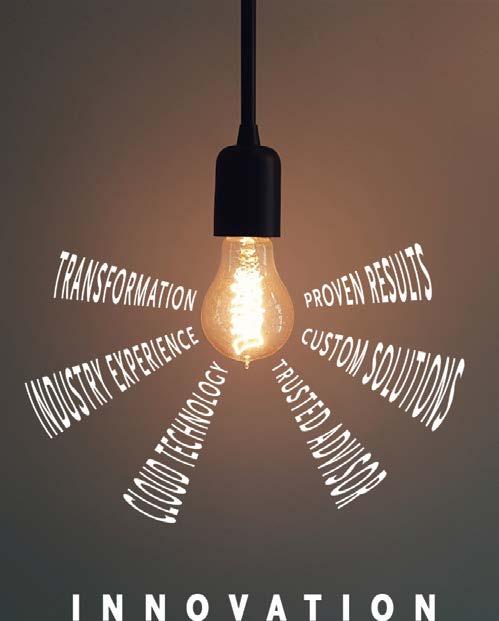

Next-Generation innovative technology like Advanced Analytics, Machine Learning, Blockchain, IoT and Big Data that ties into an intelligent digital core can drive competitive advantage for your organization by improving business outcomes at a lower total cost of ownership.
But where do you start? Here.
Dickinson + Associates guides clients through this journey, bringing years of relevant business knowledge and strong SAP credentials to define and deliver the next generation platform business solutions
Are you looking to reimagine your business IT solution?
Leveraging the SAP Digital Core, Advanced Analytics, and the SAP Modern Data Platform to Transform Businesses into Intelligent, Connected Enterprises
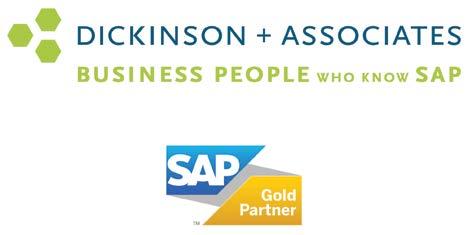
in-the-arm to the company’s quality culture. He does this by underscoring what he sees as Wagner’s most valuable asset: the customer. “We have many functions in the company, from stakeholders on down,” he says. “But there’s a prerequisite for customers to buy our product. So everything we do is for the customer. Period.”
Without a doubt, the biggest undertaking Rios has faced thus far at Wagner is the implementation of a new SAP (Systems/Applications/Products), a software known for its ERP (enterprise resource planning) and data-management programs. The new SAP impact the process by which the company does its entire business, including everything from placing orders to manufacturing, and from shipping the product to receiving payment for it. When it comes to implementing the new SAP, Rios’ considerable edge is understanding the importance of interdependence, rather than running all processes in silos.
Once the new SAP went live in October 2018, keeping up the momentum of such a big change became Rios’s next challenge. He did so with a process he calls “action learning,” with employees creating the necessary learning materials as they progressed. “At first, nobody wanted to do it,” he says. “They thought it was too much like grunt work! But I think it turned out to be the best way because now they have motivation to learn. With every key user creating their own materials, it’s easy for them to know where they are in the learning process.”
After putting most of his considerable energy into improving processes for a better overall product for customers, Rios is excited about his next major project: improving the customer experience itself. For this, he anticipates reenergizing Wagner’s quality system in such a way that has everyone in the company working toward the customer experience. “It’s about changing the company’s culture towards thinking about systems,” he says. “That’s what will drive continuous improvement much faster.”
And for Rios’s part, the process improves every time he makes a new connection—including the regular contact he now has with Wagner’s suppliers. While the feedback that comes from a supplier risks being far from what he wants to hear, Rios has been on this quality journey long enough to know its worth. “At the very end of the exercise, it’s what I’m looking for personally: to bring the company ways to improve for the future,” he says.
International businesses present unique challenges— and opportunities—for corporate citizenship in multiple countries. The executives featured here thrive in navigating cultural shifts worldwide.
124 Stacia Jones, Abercrombie & Fitch Co.
130 Nuno Dias Andrade, Santander Bank, N.A.
133 Manny Ochoa, Hudson Group
BY RUSS KLETTKE
Abercrombie & Fitch Co. has been a mainstay in fashion for more than a century, and top attorney Stacia Jones has a lifetime of D&I experience. Together, Jones and the global company ensure a relevant, inclusive experience for employees and customers alike across its three brands: Abercrombie & Fitch, Hollister Co., and abercrombie kids.


ABERCROMBIE & FITCH CO. IS AN APPAREL RETAILER WITH MANY fashions and phases in its 125-year history. Imagine the business at its beginnings, the tail end of the Victorian era in a world where most people had just a few outfits in small closets. Theodore Roosevelt and Amelia Earhart were among the early customers of the signature Abercrombie & Fitch brand.
Fast-forward to 2019 and you’ll find that A&F Co. has continually evolved to mirror modern society in keeping pace with the changing landscape of apparel consumption and the broadening global consumer demographics. Labor and employment attorney Stacia Jones Esq. could easily be credited with leading the charge on diversity and inclusion (D&I). She peppers her description of her role with far more “we” than “I,” however—which illustrates the all-in nature of this particular core value held at the company.
“D&I is woven into every aspect of our business,” says the ten-year veteran with A&F Co., whose title includes associate general counsel. “We believe that embracing diversity in all its forms makes us all stronger.” Jones worked in private practice for eight years before joining and then climbing the ranks of the A&F Co. legal department in the company’s Columbus, Ohio, headquarters.
Her understanding of how inclusion affects the company’s nearly 40,000 associates—don’t call them “employees”—comes from growing up at a time when diversity wasn’t fully embraced. “My childhood and overall upbringing made me aware of my differences and the biases that were associated with my background,” she says. She had to work against low expectations, but acceptance into a mixed-race magnet school for college-bound students helped her develop skills as a journalist. Even when she was promoted to editor, she had to initially share the title with a white man before eventually being given the full leadership of the paper. At The Ohio State University she earned degrees in journalism (magna cum laude) and law (with honors).
Jones handles the D&I function with the organizational structure of an experienced lawyer. Her approach sits soundly on hard data tracked by numerous organizational landscape surveys that reveal the
clear business case, but its foundation is rooted in respect and inclusion. “I cannot allow others to define me as something less than I am,” she says. “When we allow our associates and customers to be their most authentic selves, we perform our best as a business.”
It must be acknowledged that A&F Co. was called out publicly for less-than-perfect diversity incidents in its stores and marketing about a decade ago. It’s changed to a meaningful degree since.
“We have a rich history, with highs and lows,” says Jones. “While there are still some misperceptions, the whole team has worked hard to evolve and provide inclusive, engaging experiences for our customers.”
Under her direction, the company uses engagement surveys, program-satisfaction surveys, and culture and inclusion audits to track the success of their initiatives. “From a customer perspective, we track a range of internal and external brand health metrics,” she says. “And these continue to improve.”
A&F Co. as a family of lifestyle brands isn’t restricted to the United States. The company operates more than 850 retail stores in the United States, Canada, Europe, Asia, and the Middle East. “Every country and culture discusses matters of D&I differently,” says Jones. “For example, we recently expanded our Ramadan training materials to our associates across Europe to equip our team for evolving customer needs.” Her department collaborates with associates in each country through a Global Stores D&I Council and other forums that gather information on cultural issues they are dealing with. “We gather information to understand any potential gaps in our own D&I programs. With the information gathered from those sources, we can create new programs or revise existing ones to fit the needs of a particular region or culture.”
In the United States, that includes alignment with causes of interest to customers, including the Trevor Project and GLSEN, both LGBTQ-focused organizations. A&F Co. provides both organizations with product and funding for specific projects from the marketing and product teams, in partnership with Jones’s D&I team.
She makes it look easy, but acknowledges the nuanced and

About Vorys, Sater, Seymour and Pease LLP: Since the firm was founded in 1909, Vorys has grown from four attorneys with offices on the third floor of a small office building in downtown Columbus, Ohio, to a nationally recognized firm of approximately 375 attorneys with offices throughout Ohio and in Washington, DC, Houston, Texas, and Pittsburgh, Pennsylvania. One of the 200 largest law firms in America according to The American Lawyer, Vorys has developed a unique culture that is highly collegial, supportive, and inclusive, while at the same time unerringly focused on providing its clients with exceptional legal representation in compliance with the highest standards of professionalism.
“We believe that our culture has contributed mightily to not only our position as an acknowledged leader in diversity, but also to the honors that have been bestowed upon the firm and our attorneys, and to our continuing growth and success in the practice of law.”
—Jolie Havens, partner and chair of Diversity and Inclusion Committee
often-challenging nature of D&I. “We must be active at uncovering biases,” she says. “We audit our bias interrupters, making sure that neutral policies are not having unintentionally negative, discriminatory impacts, and ensure that our acts at achieving D&I are doing good for every associate.” She further describes how it’s a never-ending process, providing the example of recruitment and hiring practices. They work to make sure there is no disparate impact on minority groups, that it’s a fair experience for all, and that the human resources department receives ongoing training to detect and correct unconscious bias.
Jones says that diversity is embraced at all levels, including and especially at the executive leadership levels—because it affects their business. “We know the best customer interactions are those that are welcoming, inclusive and friendly, so no matter your role within the company we invest in efforts that enhance the customer experience,” she says. This includes hiring friendly and welcoming people. It also means having products in sizes that reflect the diverse customer base.
Not to leave out that D&I is just smart business. Jones cites the McKinsey Global Institute Study, which says ethnically and gender-diverse companies perform better (fifteen percent and thirty-five percent, respectively). Additionally, the study found for every ten percentage-point increase in diversity and gender in the executive team, company earnings before interest and taxes (EBIT) rise eight percent.
Jones keeps the learning and benefits close to home. Her work at A&F Co. is of global impact, but she remembers where she came from and what it was like to be young. She volunteers as a youth leader at her church, and works on programs that focus on career and leadership development.
“I was lucky to have several teachers and professors who recognized my passion for academia and professional pursuits,” she says. “They believed in me.”
Vorys: “Stacia has excelled in leading A&F’s global strategy on diversity and inclusion. A&F has enjoyed meaningful success under Stacia’s leadership, both internally and externally, and Vorys is very proud of our ongoing partnership.”
—Jolie Havens, Partner
We would like to congratulate Stacia Jones on her continued success as vice president, associate general counsel and chief diversity & inclusion officer at Abercrombie & Fitch.

We remain excited about the long-term diversity and inclusion partnership between A&F and our firm. Through this partnership, we are making a meaningful difference on diversity and inclusion initiatives in our companies and setting standards nationally for other corporations and law firms going forward.
BY RUSS KLETTKE
Renewable energy isn’t the only thing Nuno Dias Andrade does at Santander Bank—but he’s been at it for more than a decade, before most others understood the need and opportunity
NUNO DIAS ANDRADE SURPRISED HIS PARENTS WHEN HE STARTED asking questions about Portugal’s gross domestic product. This was sometime around the age of five or six. It wasn’t so much that he understood what a GDP represented—he was simply fascinated with big numbers.
Today, as managing director and head of project and acquisition finance at Santander Bank, N.A., a wholly-owned subsidiary of Madrid-based Banco Santander, S.A. that has operations across the globe, he not only handles big numbers (his project finance teams have arranged and originated more than one hundred transactions representing $55 billion in financing since 2008), but he also has deep knowledge of what those numbers can do. His unit is heavily engaged in the rise of renewable energy across North America, primarily in financing utility-scale wind and solar farms.
He speaks of his involvement in renewable energy as happenstance, but it is also a function of the location of Santander’s headquarters: on the Iberian Peninsula where wind, solar, and hydroelectric power are the envy of the rest of the world. Andrade’s native Portugal in 2018 produced 55 percent of its energy via hydroelectric power and 42 percent from wind. The only operating thermal fossil power plants in the country provide backup to times when the renewable supply falls short of demand. Spain, the larger and more populous country next door, is the fifth largest producer of wind power in the world, with 45.8 percent of electric power coming from renewable resources.
Before moving to the bank’s New York office, where his department of twenty-one people is based, Nuno began working on renewable energy in 2006 in Madrid. At that time, one might have considered this work a quixotic tilting at windmills as climate-change science was not so broadly understood and accepted, and the economics of wind energy weren’t nearly as favorable.
But in 2019, it’s a different story. “There is a renewable energy revolution underway,” Andrade says. “We were there at the very beginning. I’m proud that we were there then and are one of the largest lenders in this space now.”
Not that this is a simple, slam-dunk affair. Financing wind and solar projects in multiple countries involves project finance, seedand risk-capital investment, solar leasing, sale and leaseback, and bridge-equity instruments. Andrade points out that institutional investors are drawn to renewables in different ways, in both owner-equity positions and as developers. Tax incentives are a huge driver, as are tax equity investments. He describes so many moving parts as an “ecosystem of development,” and that, once built, there is the question of selling the project or keeping it.
Overlying these complex financial structures is what Andrade says is just as important: the human element. “Banking is about people,” he
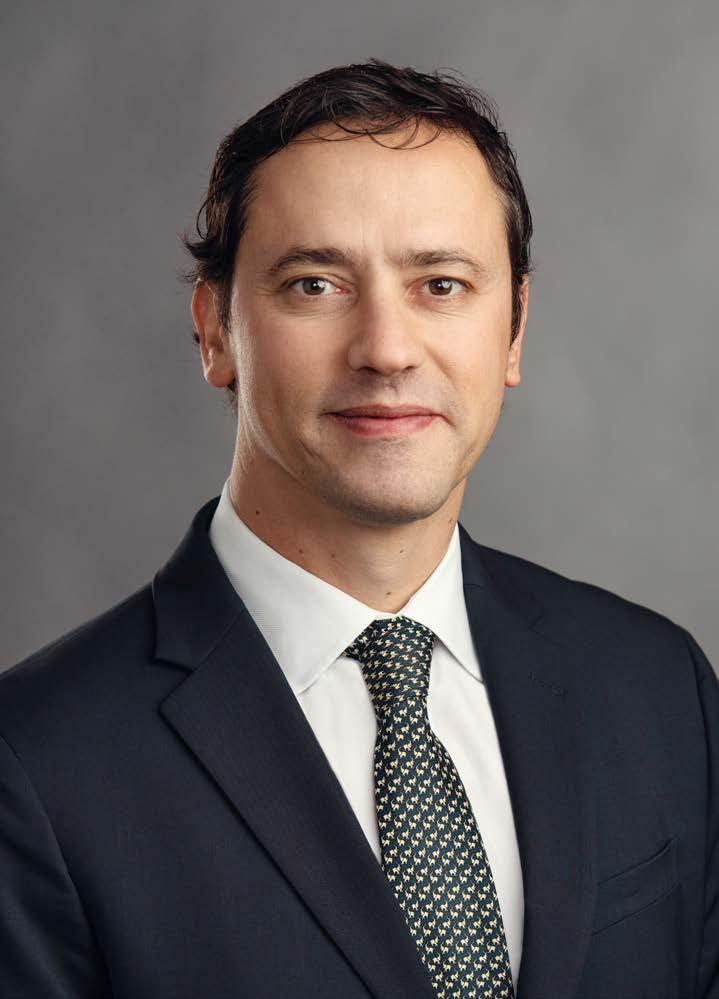
Nuno Dias Andrade Managing Director & Head of Project Acquisition and Finance Santander Bank, N.A.


We
says. “Our key focus is an orientation on the client. While we have to have financial knowledge, our dedication to understanding the client’s needs and provide a flawless service is our competitive advantage.”
The banking business, and the matters of climate change mitigation and deployment of renewable energy projects, is also multinational and perhaps it is not coincidence this Portuguese native working for a Spanish bank in New York City has a very diverse staff.
“I’m a big believer in diversity,” Andrade says. “The best teams have people whose backgrounds and skills complement each other. We all have our blind spots, so in combination we are much more powerful.”
His working team includes individuals from seven nationalities who have five native languages. “Most global finance is conducted in English,” he adds, “but people coming from different languages are going to have a diversified perspective.”
“The World Cup is interesting around here,” he quips, understatedly.
Andrade credits his appreciation for other languages, cultures, and ways of doing business to his upbringing (“Our family traveled—— to America and Asia,” he notes) and his University of Porto education that included a year studying in France at the University of Grenoble Alpes. This was in “Erasmus,” a European Commission program that enables students to study, train, and gain experiences abroad. He says that the exposure to students from all over the world in this program was what made it so enriching.
This expansive background plays into the project and acquisition finance department under Andrade’s direction in other ways, too. The department’s experience in renewable energy financing is useful in and applied to its work in other industries as well. “Negotiating skills, being very detail oriented, multiple-party reviews—it’s all transferrable,” he says.
So how does this global financial leader raise his own children? “One of the first things I bought them was a globe to put in their rooms,” he says. “It’s never too early to think about how there is a big world out there.”
Hudson Group’s Manny Ochoa leads a complete reboot of customer-facing technology that will benefit travelers across North America
BY PETER FABRIS
IN CHINA, MORE THAN HALF OF THE population pays for goods using non-traditional means such as mobile phones. Many don’t carry wallets, let alone cash, says Manny Ochoa, vice president of retail systems for Hudson Group. When visitors from China shop in some of Hudson Group’s stores, they may find themselves in a quandary because the company doesn’t yet have the point-of-sale (POS) and payment technologies that are needed accept all pay-by-phone or “cardless” payment services. The result: an embarrassed store associate and an unsatisfied customer.
“We may the lose the sale, or force the customer to pay with cash or a credit card,” Ochoa laments. “Our business is about agility, speed, and service, and the technology that we have now is prohibiting us from fulfilling our mission, to be the traveler’s best friend.”
It’s his job to transform how Hudson Group interacts with customers—and there’s no time to lose.
Occupying a unique niche in the retail world, Hudson Group operates more than 1,000 convenience stores, newsstands, bookstores, cafes, and specialty shops in about ninety airports and other transportation terminals across the United States and Canada. These locations service harried travelers who expect quick, convenient, and friendly service.
By the end of 2019, Hudson Group will be able to provide customers with more payment options along with many more conveniences, Ochoa promises. A year after that, Hudson Group will also have a new enterprise resource planning (ERP) system in place, providing a giant leap forward in the company’s ability to manage inventory, analyze sales trends, and more quickly make
purchasing decisions according to product demands and trends. The POS and ERP systems will work together, providing executives and operational managers with near real-time information.
Ochoa is the point person for the effort to replace outdated retail technology with an up-to-date platform. There will be many challenges, he says, as this project unfolds— mostly centering on culture changes. But any pain during the transition will be worth enduring in the long run, he believes. The new POS platform will enable Hudson to engage the customer more effectively and efficiently, while the new ERP system will drive both top- and bottom-line improvements. Moreover, airport officials and real estate owners are demanding new, more robust capabilities, especially at the point of sale.
“The idea is to engage the customer however they want to be engaged,” Ochoa says. That means adding additional points of sale within the establishment—self-checkout kiosks and mobile-checkout ability for in-store associates—and the means for customers to start and complete a transaction however they choose. “Say I’m going to the airport. I can start the transaction from home and pick up the goods at the airport. I could also add to the order when I get to the store before closing out the transaction,” he explains.
Mobile devices will allow associates at Hudson Group-managed luxury-goods stores—including Coach and Tumi—to not only check out customer orders from the floor, but also potentially cross-sell additional products that can be ordered from the devices and delivered to the customer’s home. “Associates will be able to give a more personalized shopping experience,” Ochoa says. Wi-Fi-enabled devices will also be available for deployment when a long line of customers queues up at checkout stations—a key service in an environment where people are rushing to make flights, trains, and buses.
300K travelers per day are served by Hudson Group, which operates
1,000+
stores in 88 locations in the United States and Canada
Ochoa’s team has already piloted selfcheckout stations at a few locations by “stitching together a couple of existing tools” using the old technology, but that strategy is not scalable across the company, he says. The best approach is wholesale replacement across all regions. The old system—actually two different systems—will not support the volume of business necessary for the company to realize its goal of growing annual sales from $6 billion to $12 billion.
Moving to the new technology will require extensive retraining of IT staff as well as adding some new talent. “We have begun to train people in, if not the precise technology, the functional capability and workflow,” Ochoa says. “In some cases, we’re leaning heavily on consultants until we build sufficient internal skills, and we’ll continue to augment the Hudson Team with external talent.”
The new ERP system will also require retraining of users, who will have to change familiar processes that have been in place for many years. “The biggest challenge is going to be organizational transformation,” Ochoa observes. “This company is more than thirty years old. We are making a shift from using paper and pencil, in some cases, to modern technology.”
Inventory and purchasing specialists, who have used manual methods in the past, will have to adhere to the more rigid data parameters baked into the ERP system. Some may wonder why they have to enter certain data fields that are not necessary for their work. Those extra steps, however, are essential for others who analyze trends, forecast sales, and manage inventory. It will take an internal training initiative to inform the workforce of the benefits of the new technology so that everybody will get on board, he says.
To spur the necessary internal change, the company has formed a master data governance team led by the COO. This team will work to ensure that the right people are in

place to perform key tasks, such as auditing. The company went public in February 2018, and as a result has to comply with more rigorous financial regulations. The new ERP system will aid that effort, but the master data governance team has to determine who needs what data. “They will ensure that we have complete, cross-functional business representation in tailoring the system and developing workflow,” Ochoa says.
In addition, a group of “super users” will receive intensive training on the new technology and they will champion the change and implementation process, Ochoa adds. Super users can be catalysts for organizational change from within the ranks, so that change is not dependent solely on a top-down approach.
Organizational transformation is never easy, Ochoa notes, but for Hudson Group, it is critical to an ambitious growth agenda. When the dust settles, the IT upgrade will create many benefits across many departments and at hundreds of retail locations. Millions of travelers (including those who don’t carry a traditional wallet) will soon reap the benefits of improved and more efficient service.
Salsify empowers brand manufacturers to deliver the product experience consumers demand across every online sales channel. Our product-experience management platform (PXM) combines the power of PIM and DAM capabilities, the industry’s broadest commerce ecosystem, and actionable insights to orchestrate compelling product experiences through every digital touchpoint. www.salsify.com
We asked our network of business leaders:
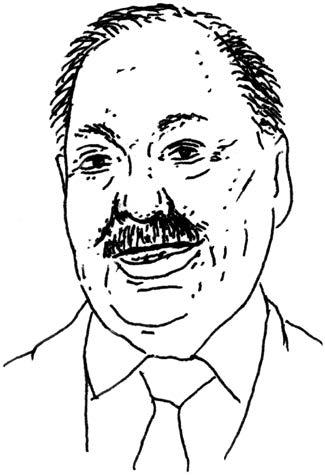
“It took thirty years, but a very inclusive individual— Walter D’Alessio— recommended me for a Fortune 500 board appointment. I had served with him on a number of nonprofit boards.”
—NELSON A. DIAZ, AUTHOR, NOT FROM HERE, NOT FROM THERE
“When I was younger, Joseph Grundfest and I would present our Stanford Rock Center teachings to the boards of Disney, FedEx, Google. Then, when the regulator of the Federal Home Loan Bank of San Francisco said, ‘Add a board member who isn’t like your current board members,’ the bank used Spencer Stuart and found dozens of qualified candidates, but I was brought to the attention of a current board member by our mutual acquaintance: Grundfest.”
—DAN
SICILIANO, LCDA & LCDEF (P. 96)
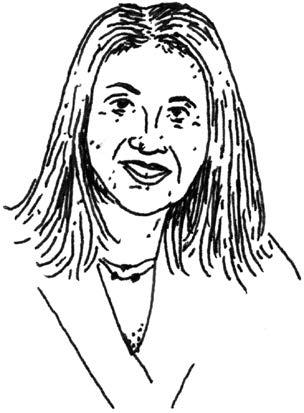

“Conexión, the executive mentoring and leadership experience for Latinos that I founded, is social capital in action! Robert Putnam, a proponent of social capital, gave me the opportunity to work with him at Harvard and has influenced me greatly. Having meaningful social networks has led me to all kinds of interesting people, great opportunities, and a wonderful career!”
—PHYLLIS BARAJAS, CONEXIÓN (P.
33)
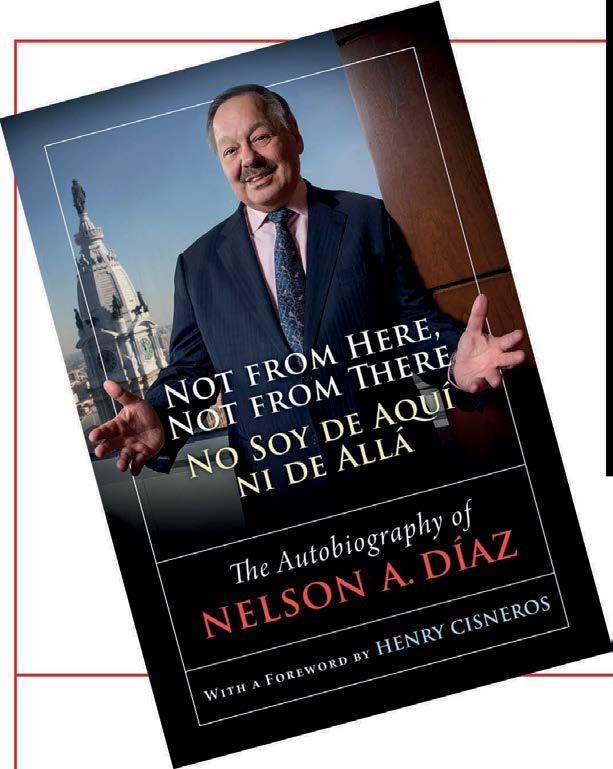

NA
lively autobiography by a community activist, judge, and public advocate who blazed a trail
for Latinos in Philadelphia
NOT FROM HERE, NOT FROM THERE/ NO SOYDEAQ!Jf NI DE ALLA
o soy de aqui ni de alla is a mantra for Puerto Ricans, who feel accepted neither here nor there and seek a place in society. In his inspiring autobiography, Not from Here, Not from There, Diaz tells the story of his struggles and triumphs as his perspective widened from the New York streets to law school classrooms and the halls of power in Philadelphia and Washington, D.C. Whether as a leader in economic developm ent, a pioneer in court reform, or a champion of fair housing, Diaz never stopped advocating for others. He was happy to become the first Latino to "do something," but he never wanted to be the last. This story of an outsider who worked his way to the inside offers powerful lessons on finding a place in the world by creating spaces where ever yone is welcome.
"NELSON DIAZ was exactly what a White House Fellow should be: smart, dedicated, and a true believer in public service. We worked together on bilingual education and employment, and his advocacy for fellow Latino voices at the highest levels of government helped usher in a change in national politics. As Not from Here, Not from There/No Soy de Aqui ni de Alla shows, he has spent a lifetime making the most of his chances and has blazed a trail for countless others to follow."
-Vice President Walter F. Mondale
"NELSON DIAZ has written a powerful and engrossing memoir of outstanding leadership, courage, and resiliency. Filled with practical advice backed by fascinating and inspiring personal lessons, victories, and challenges, this book is truly a gema smart read for everyone: the general public and leaders alike. An easy-to -read, invaluable resource that's packed with insight, Not from Here, Not from There provides a solid road map for all leaders who want to better serve their communities."
-Gloria Bonilla-Santiago, Board of Governors Distinguished Service Professor of Public Policy, Rutgers University-Camden



Rediseñado de cero, el LS 500 es un sedán de lujo construido sobre la plataforma de un cupé de alto desempeño. Abre nuevos caminos con 416 caballos de fuerza* y una aceleración de 0-60 MPH en 4.6 segundos † Domina la carretera desde su lujoso y avanzado interior; con acabados únicos disponibles como cristal Kiriko hecho a mano y el Sistema Premium de Sonido Envolvente Mark Levinson®. Vive la cúspide de la vanguardia y la innovación.




lexus.com/LS #LexusLS
Se muestran opciones. ©2019 Lexus. *Calificaciones alcanzadas utilizando gasolina premium sin plomo requerida con un octanaje de 91 o mayor. Si no se utiliza combustible premium, el rendimiento disminuirá. † Las cifras de rendimiento son solo para fines de comparación, y se obtuvieron con vehículos prototipo a cargo de conductores profesionales utilizando equipos y procedimientos de seguridad especiales. No intentar. Mark Levinson® es una marca comercial registrada de Harman International Industries, Inc.